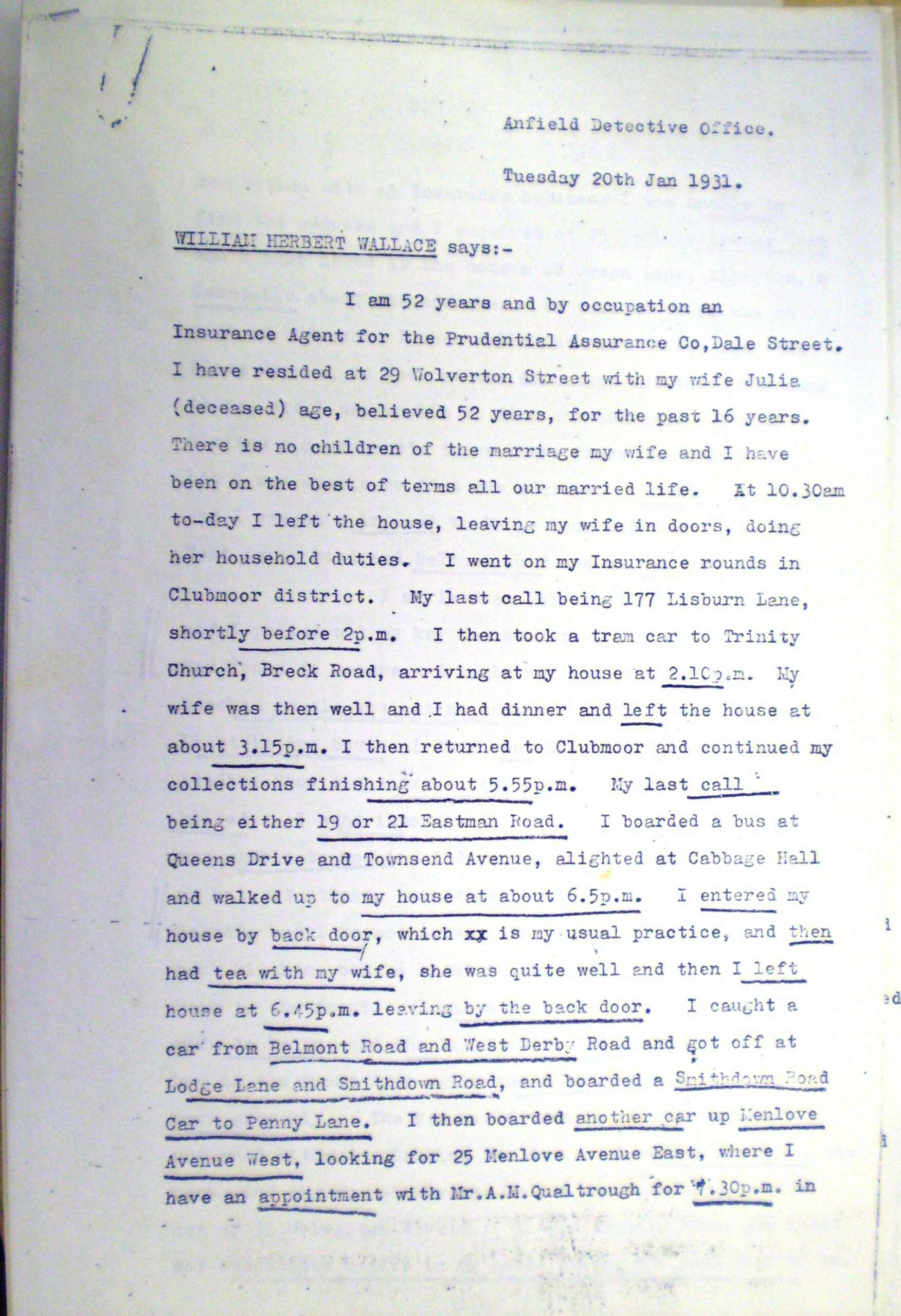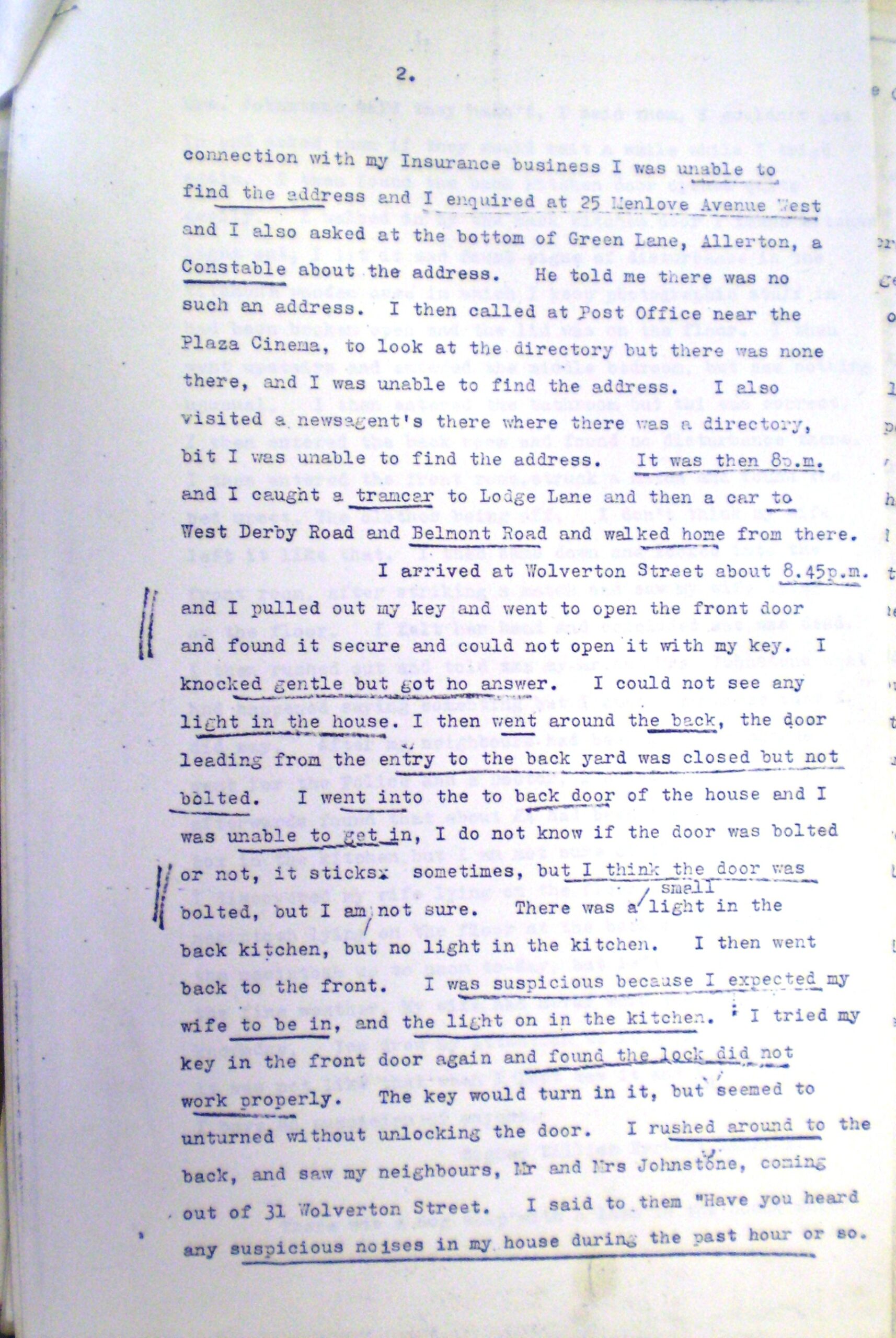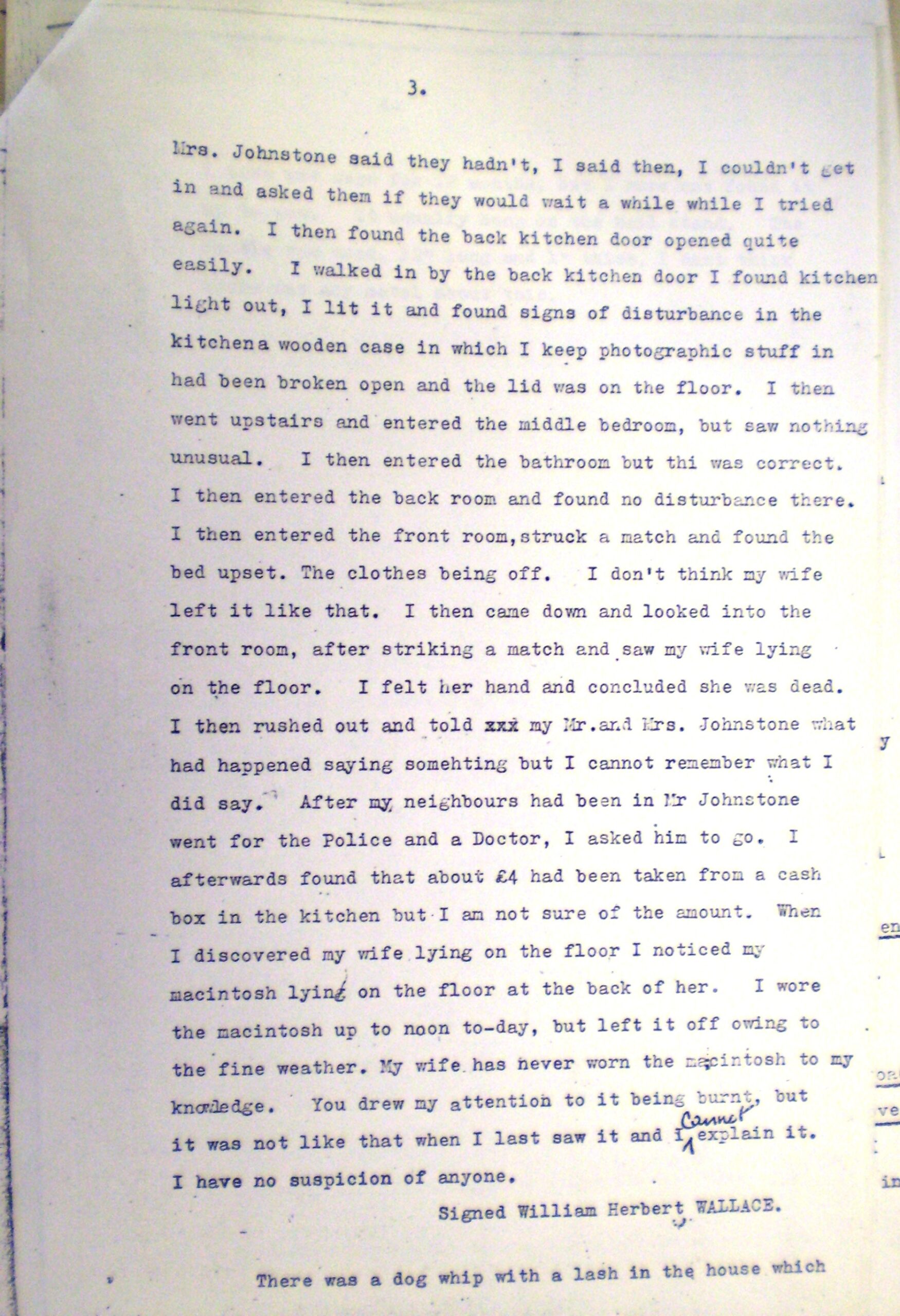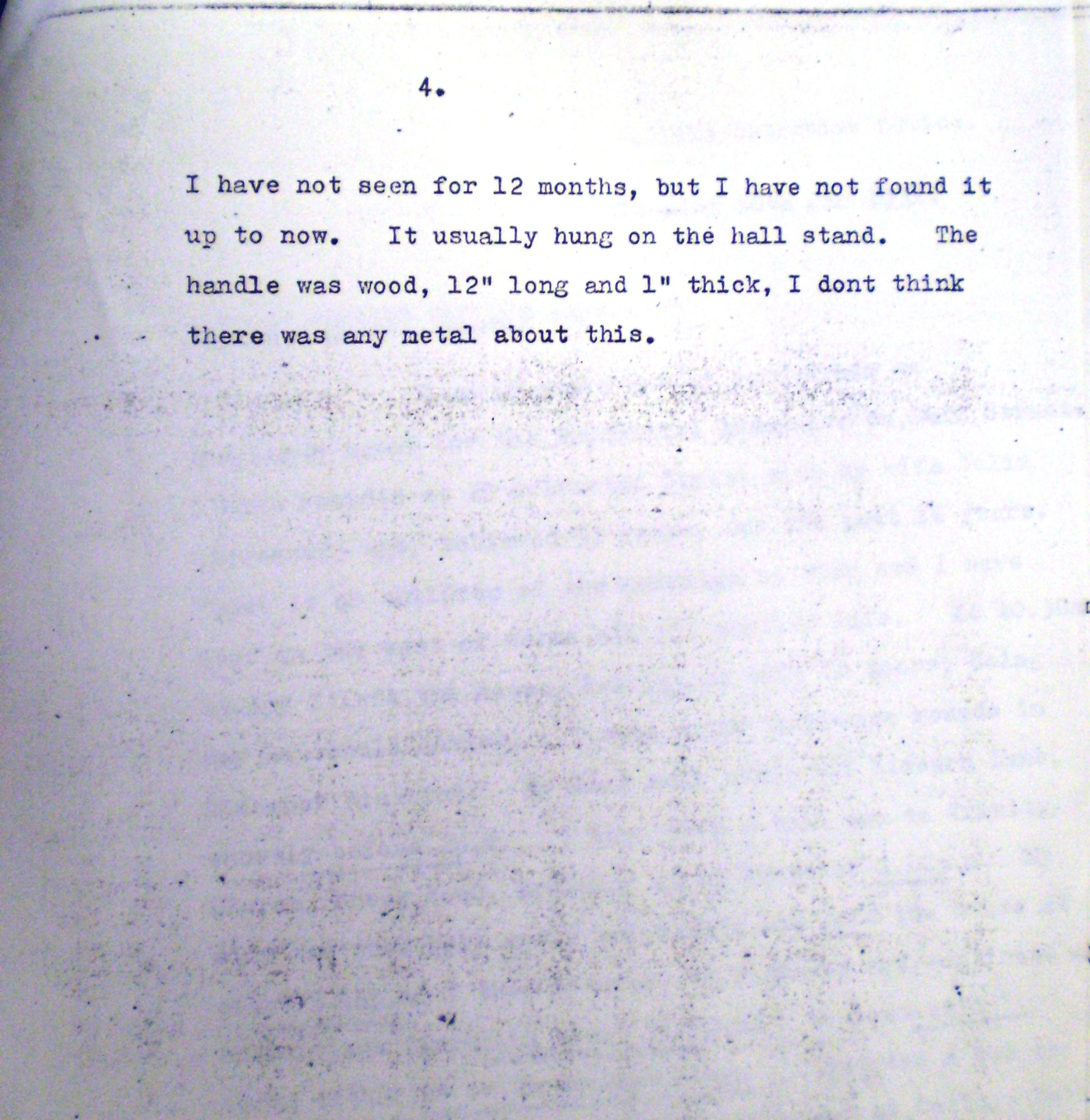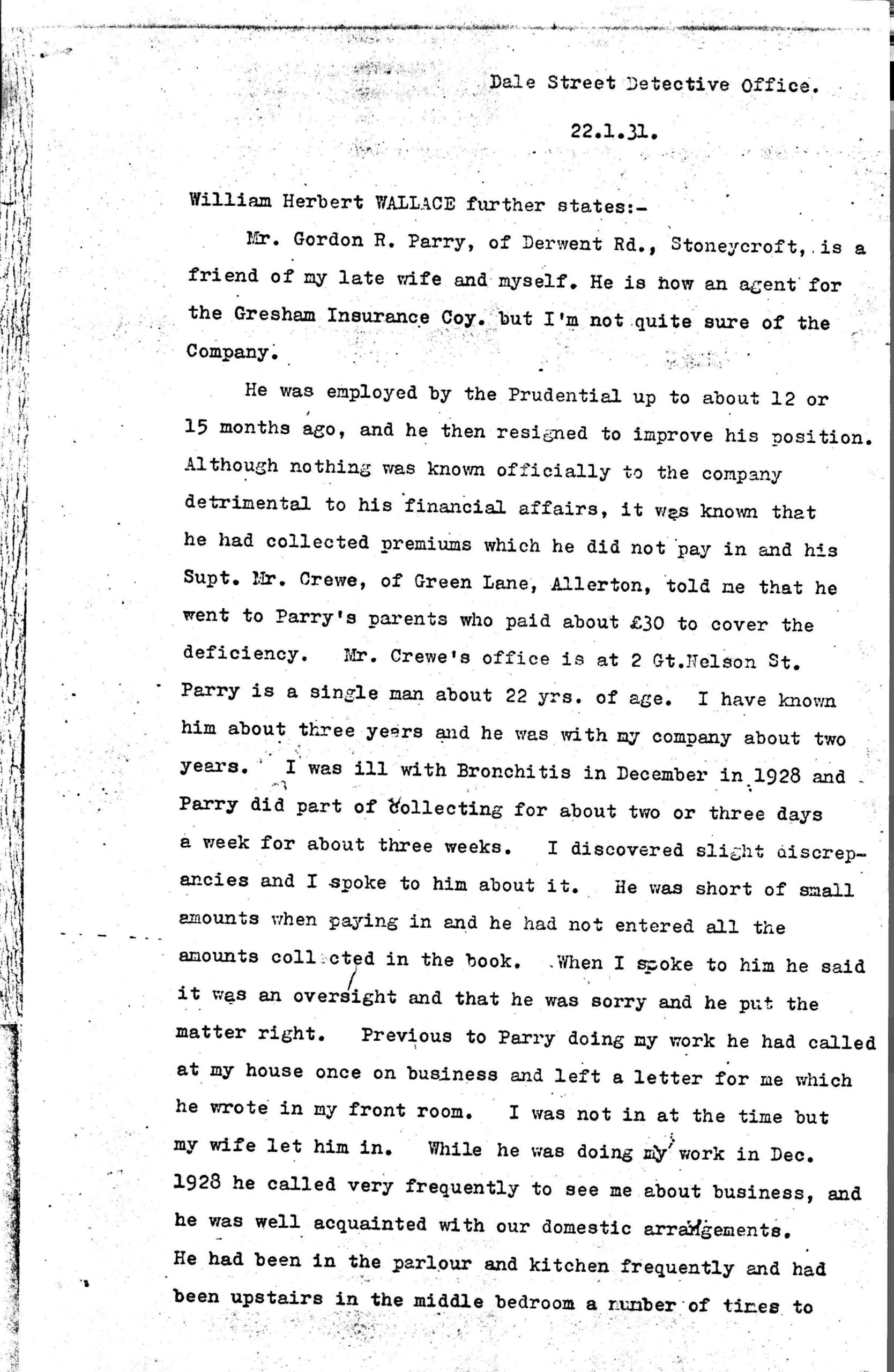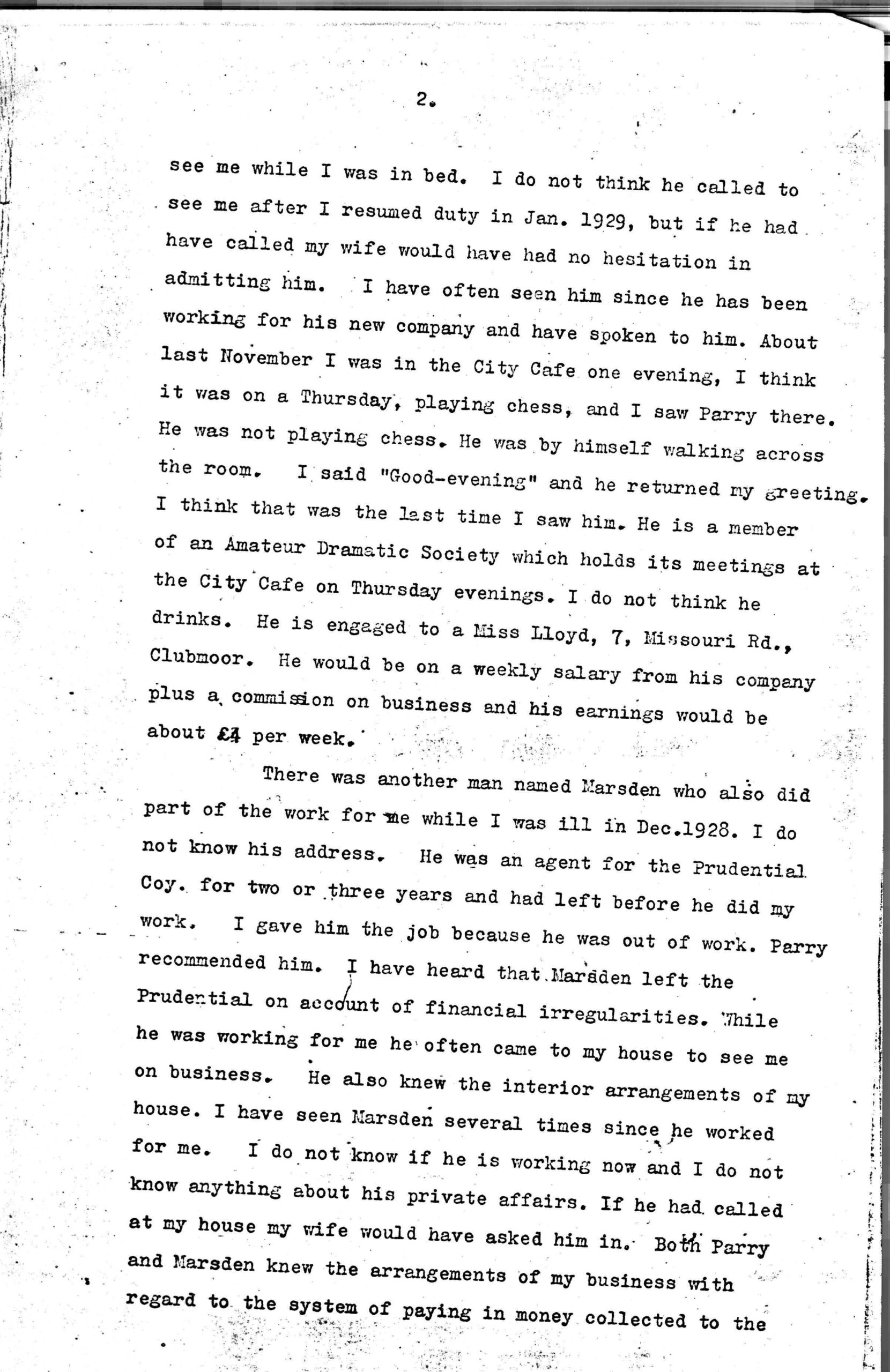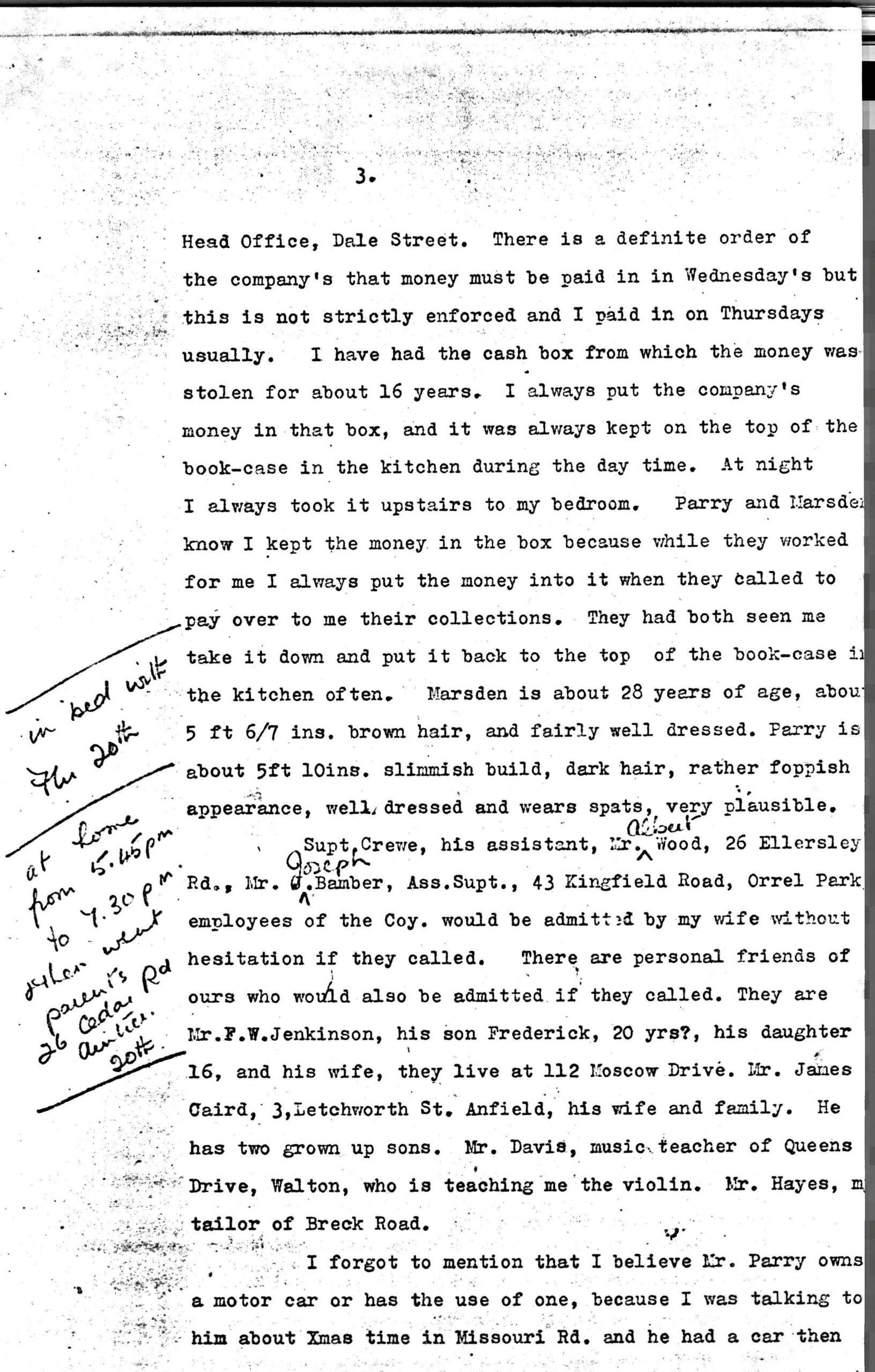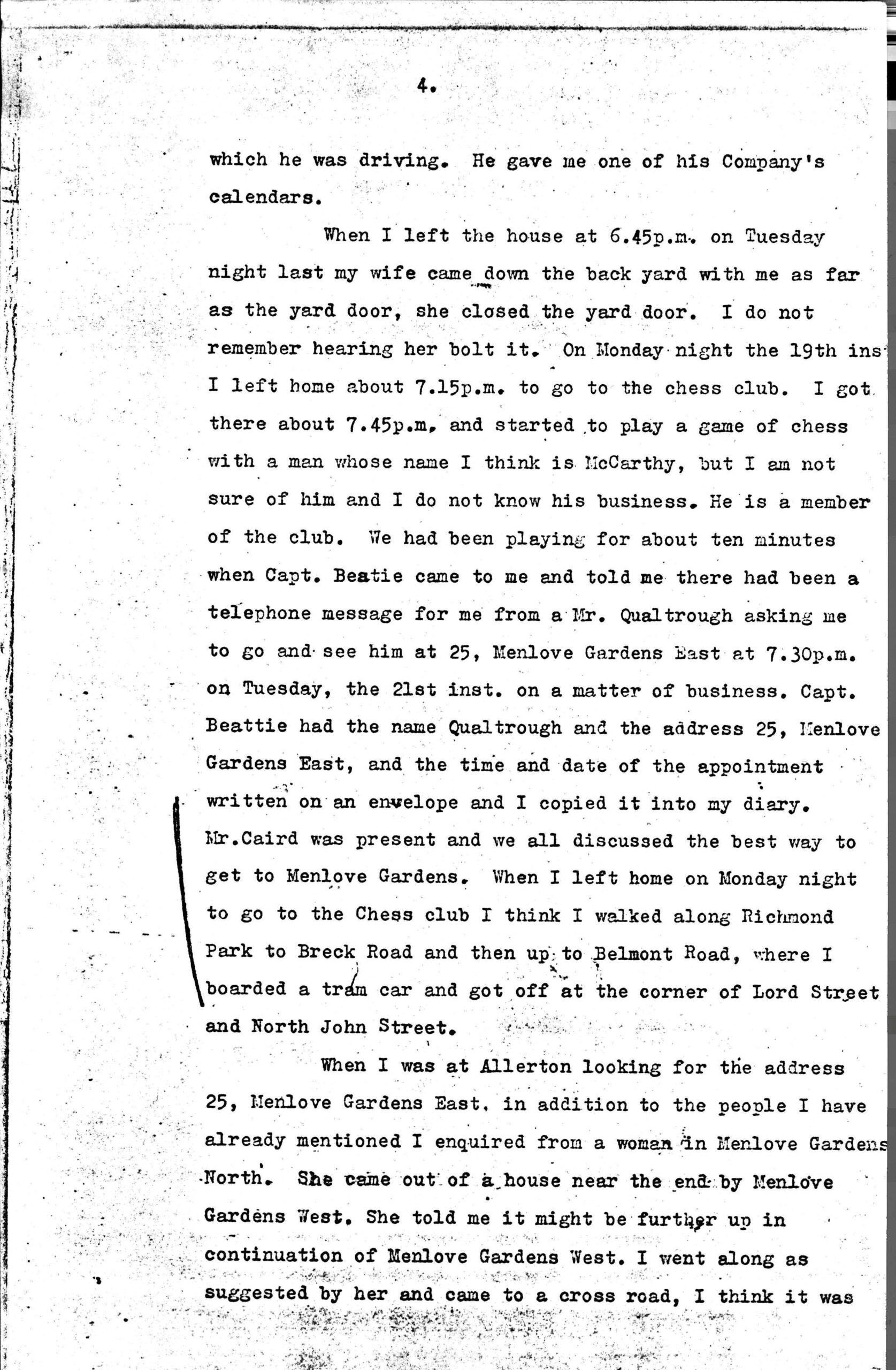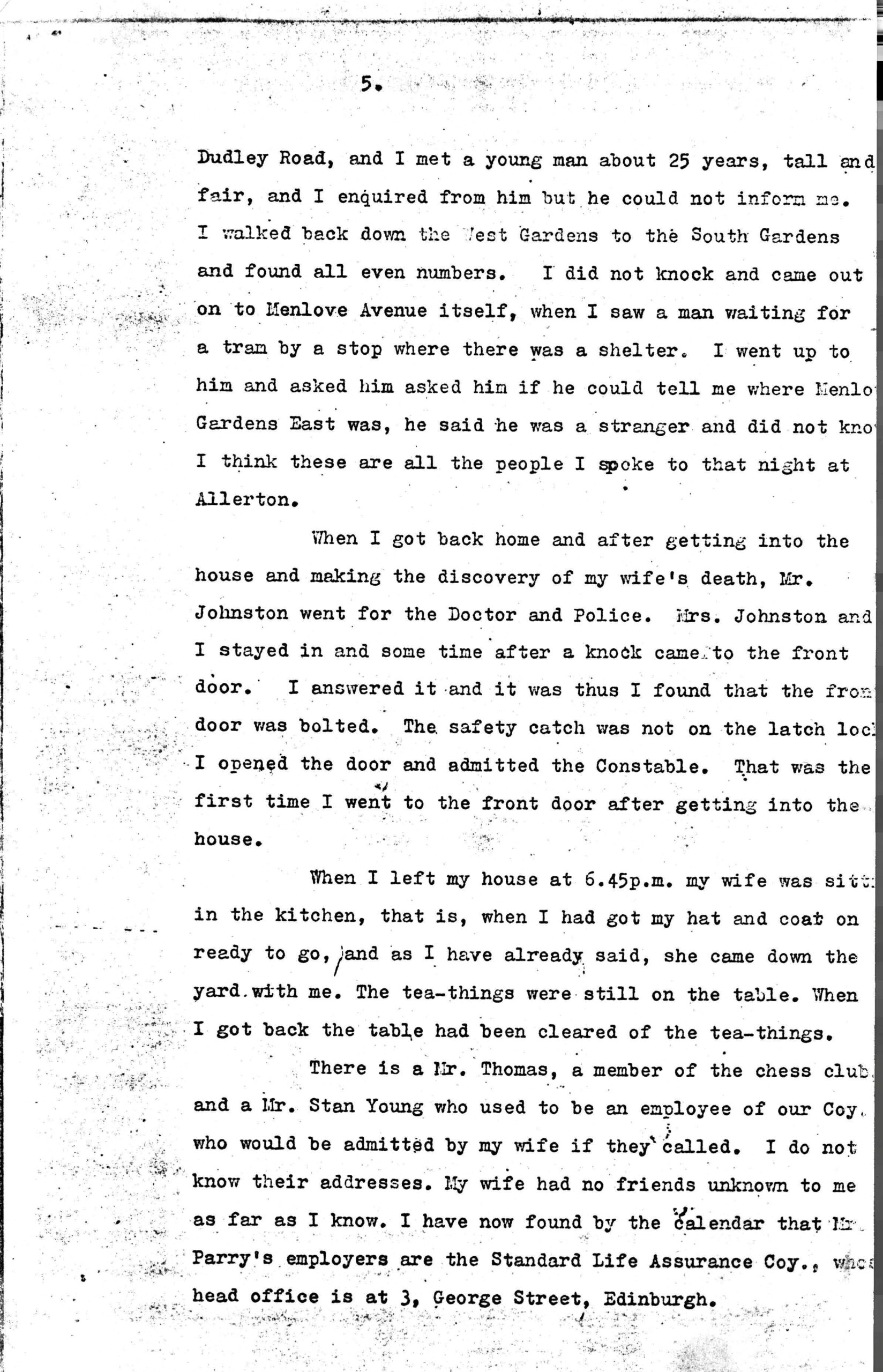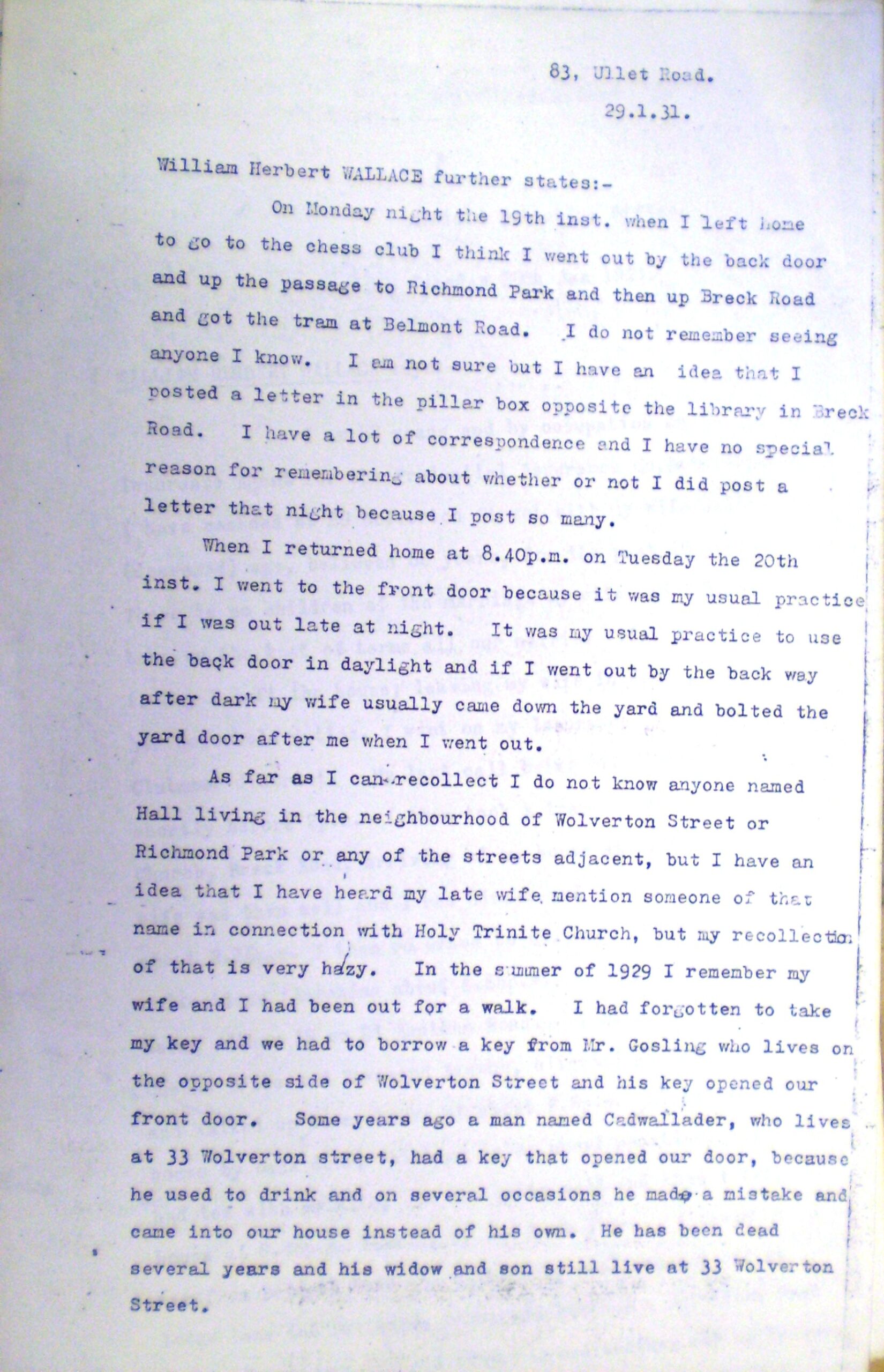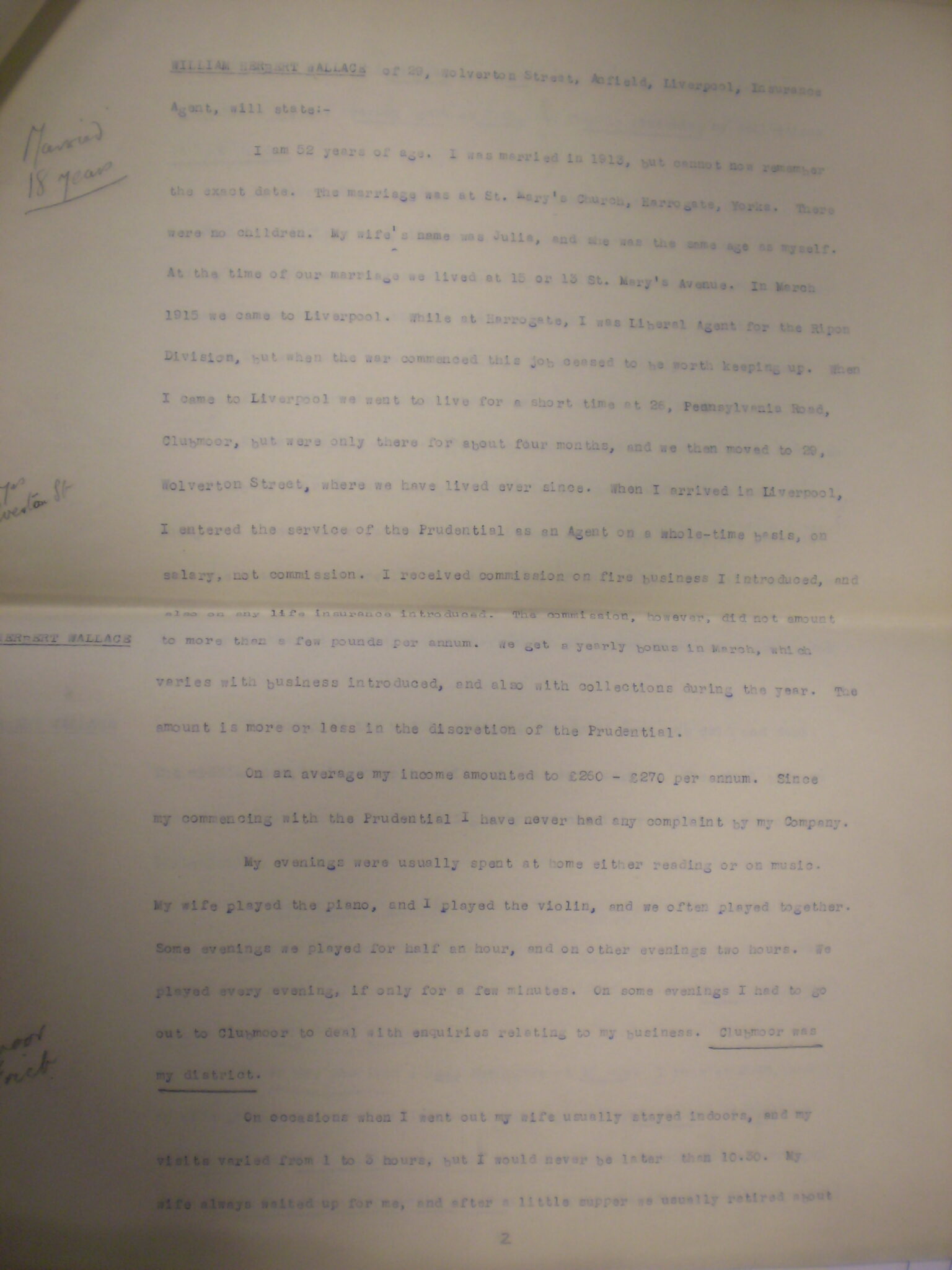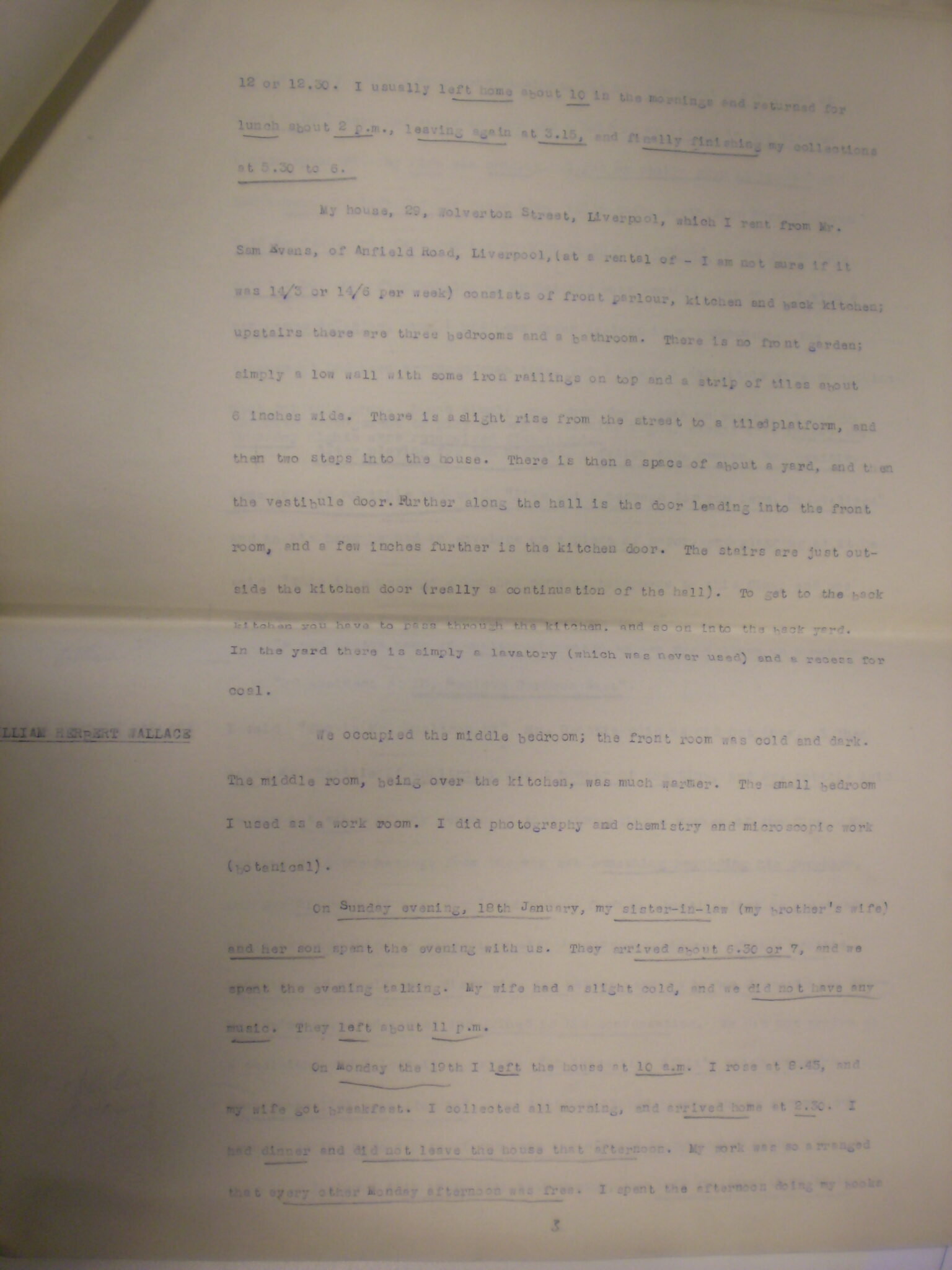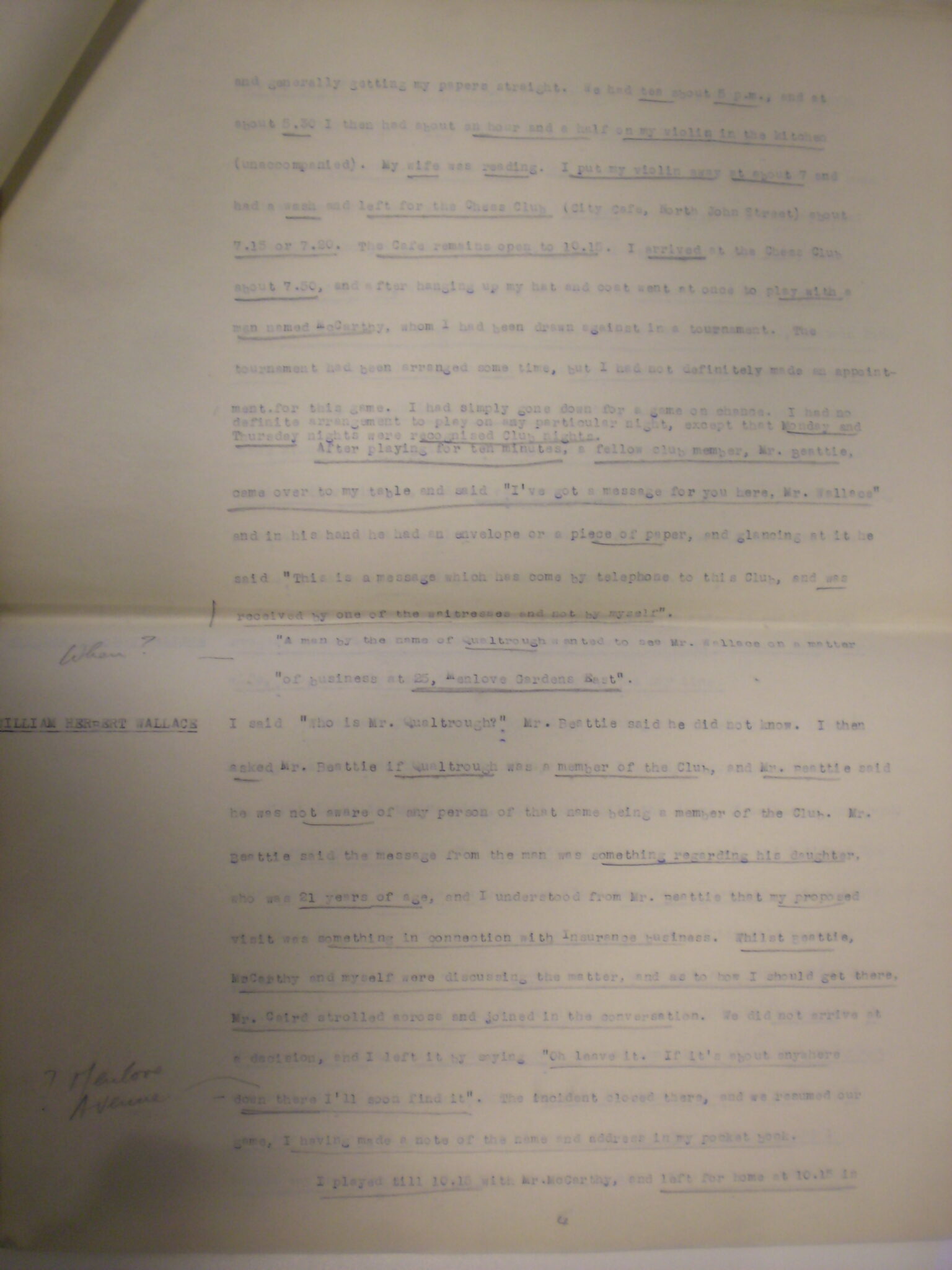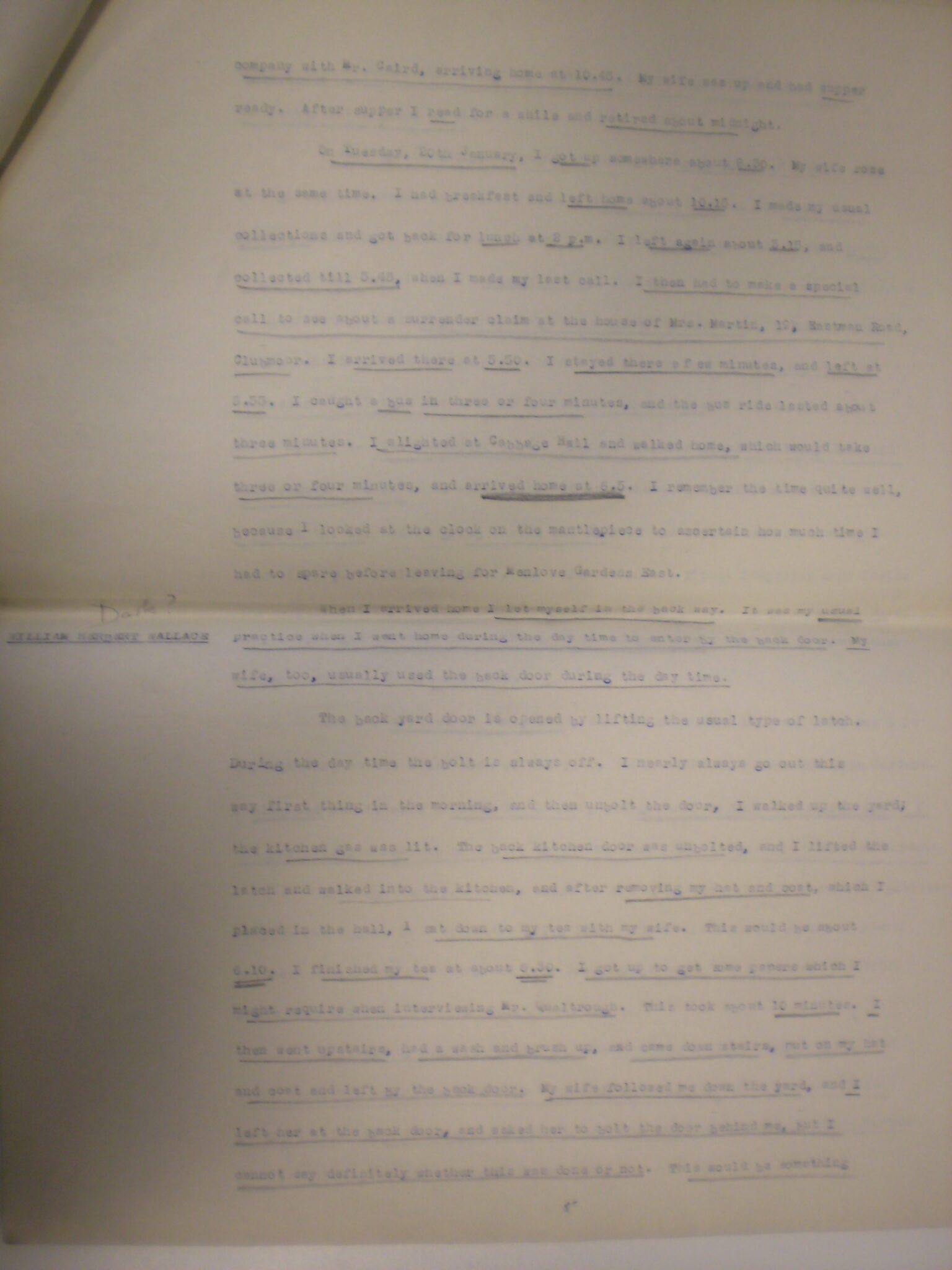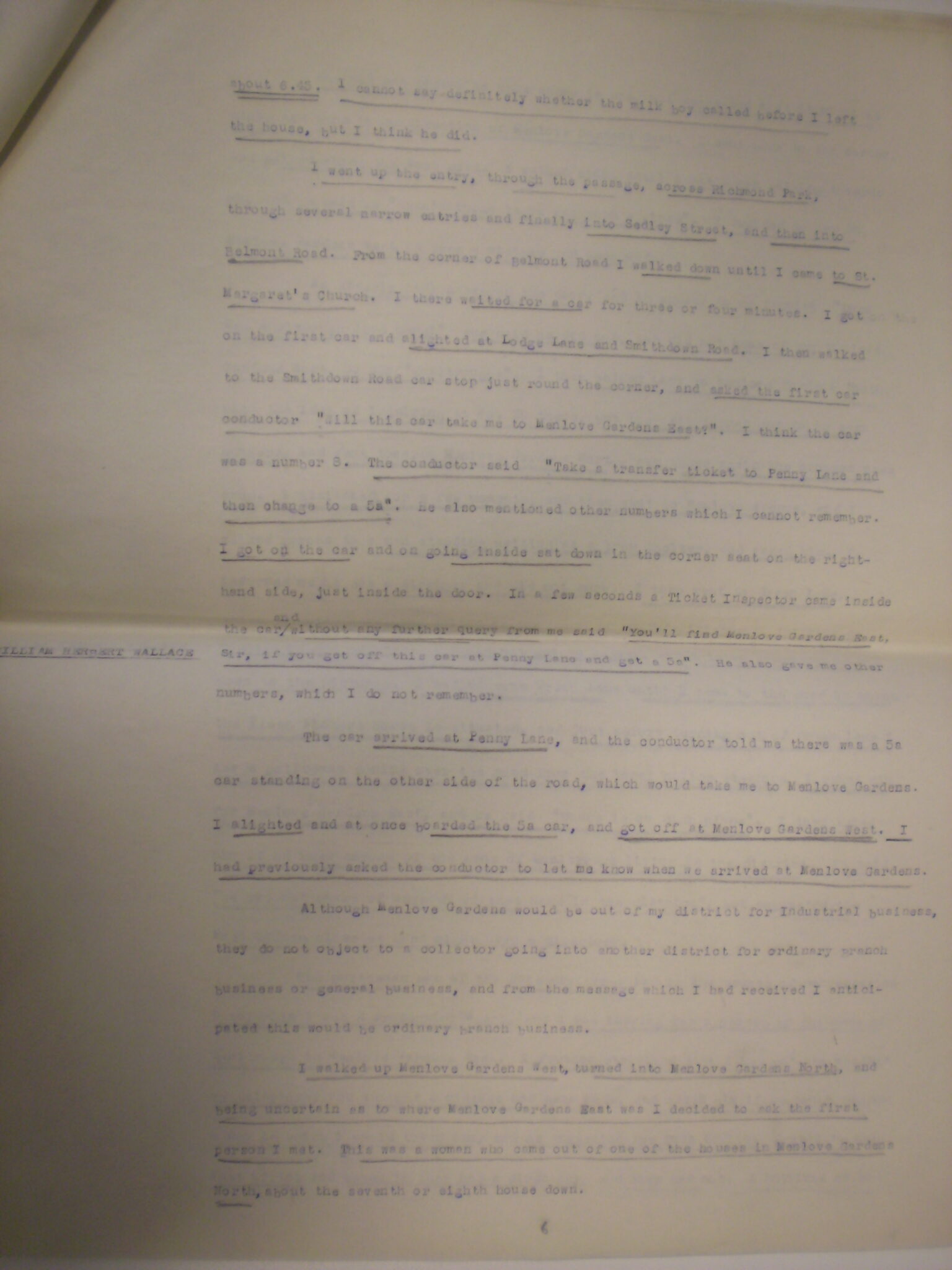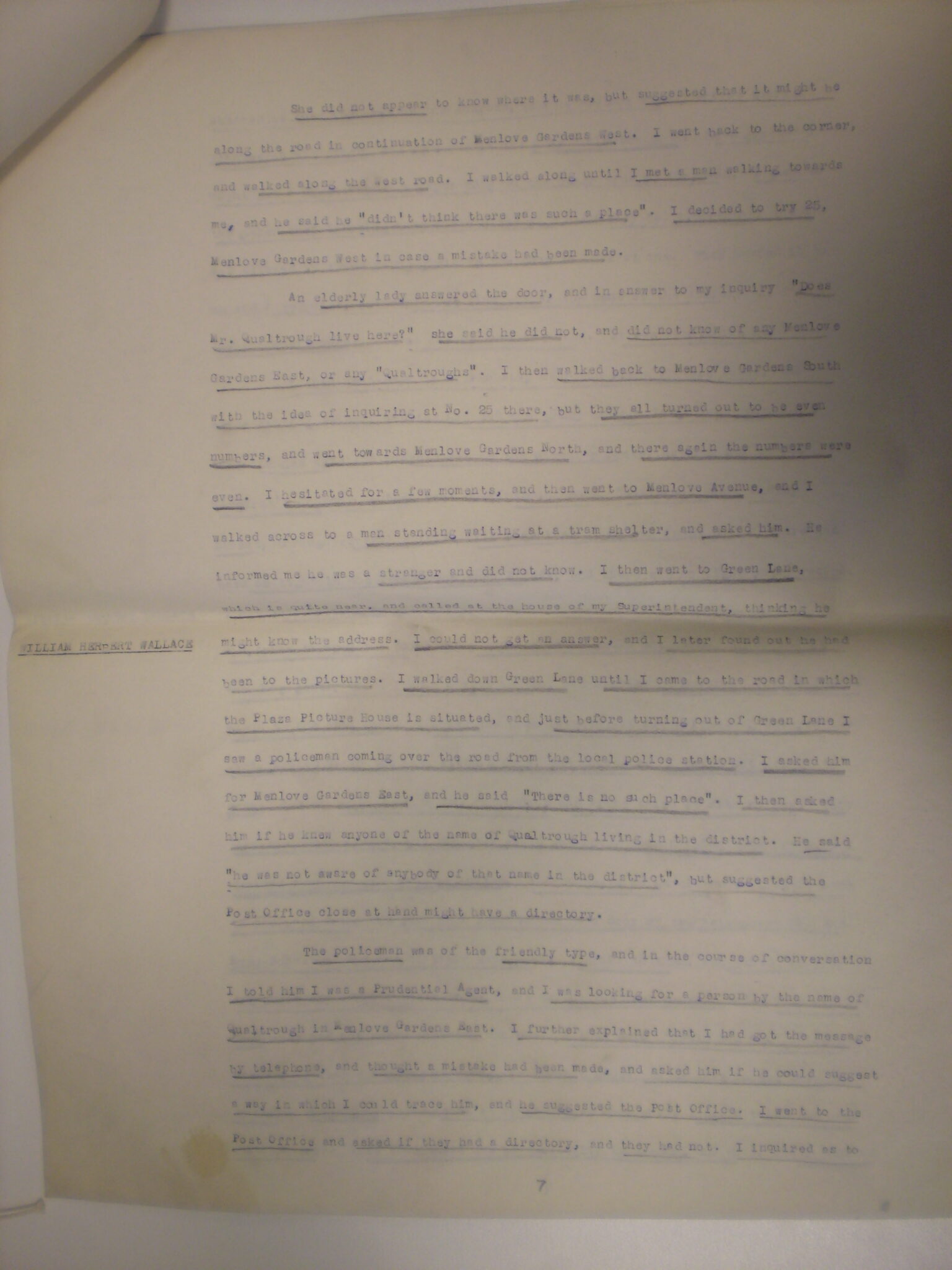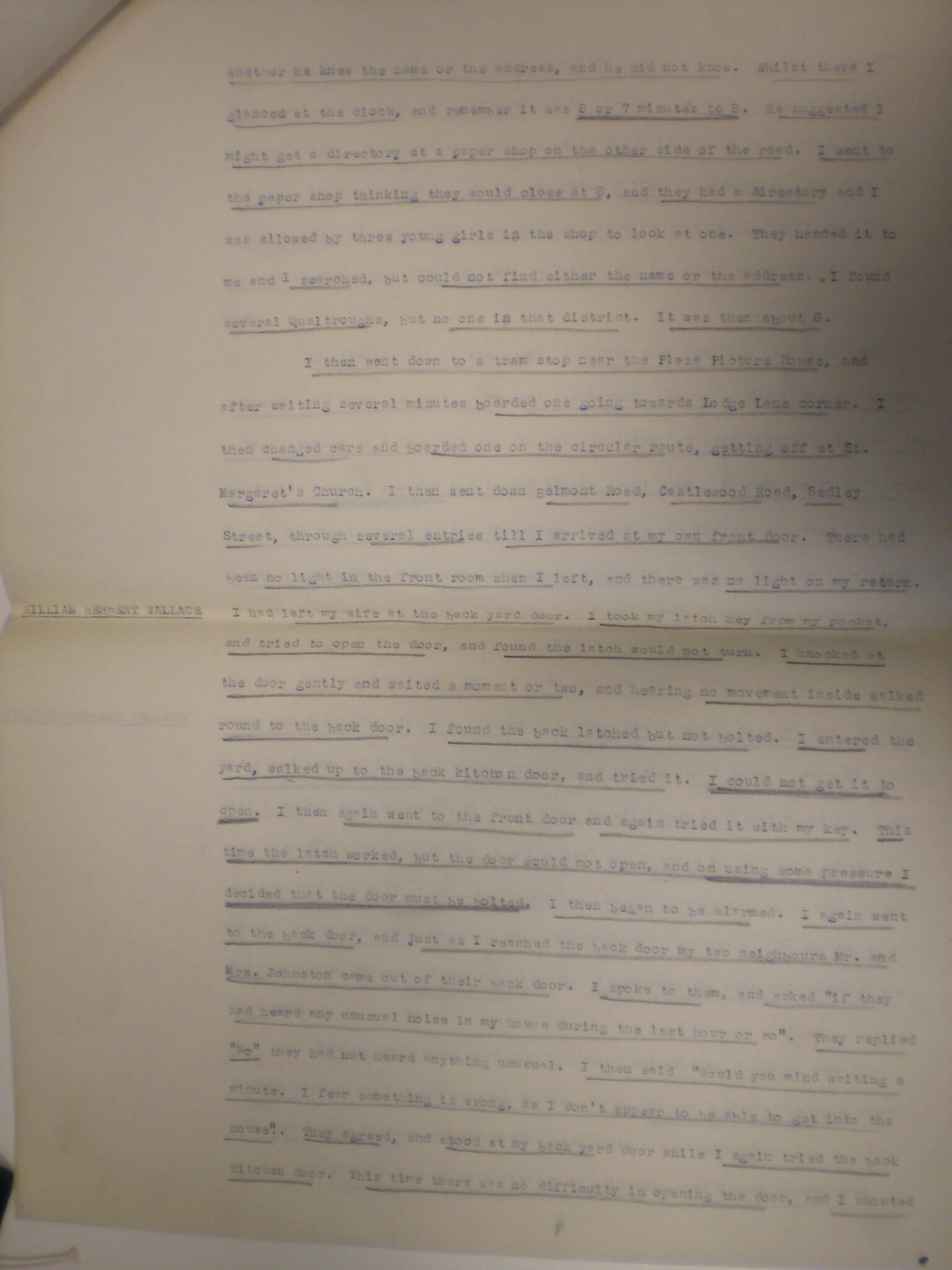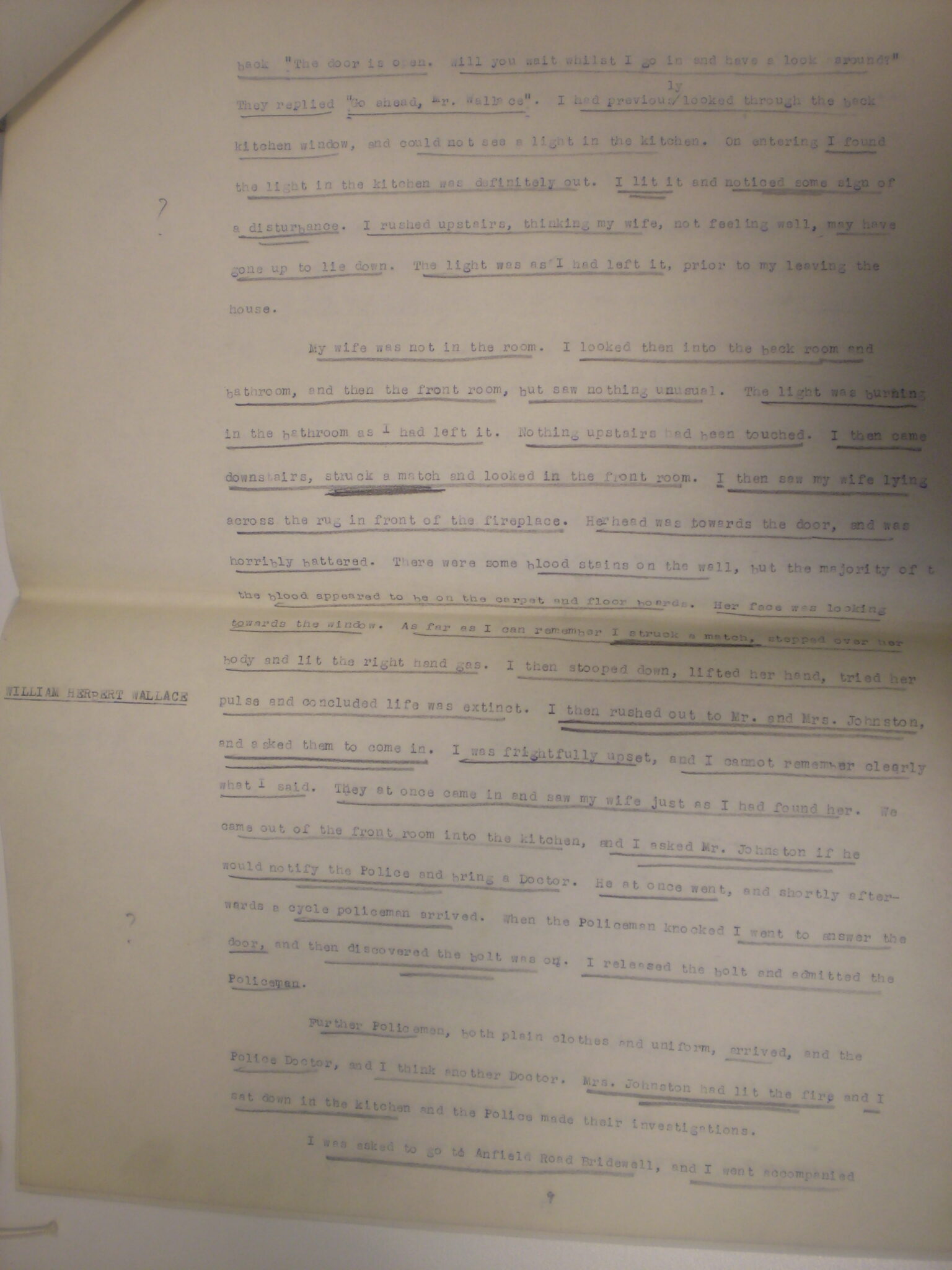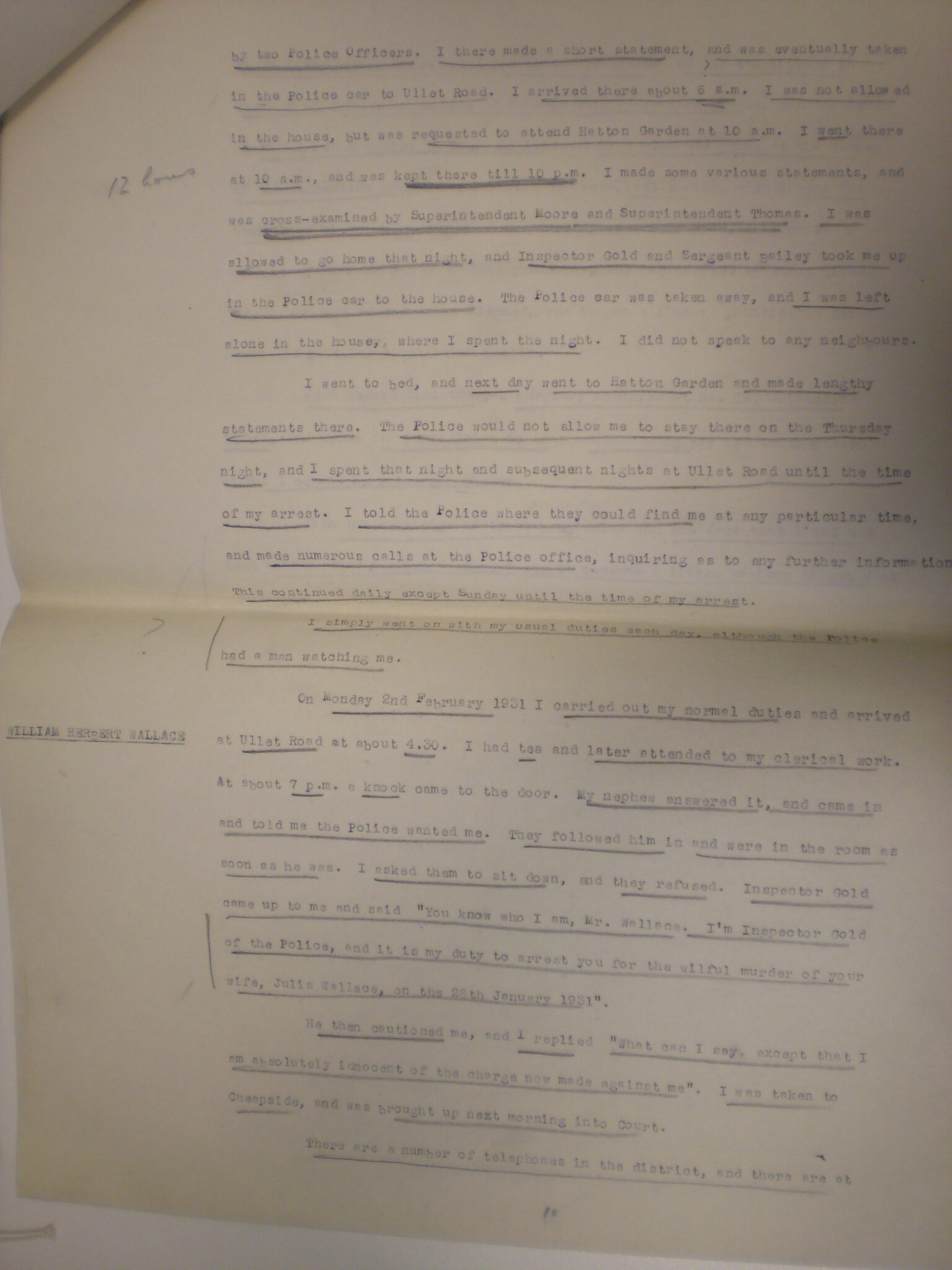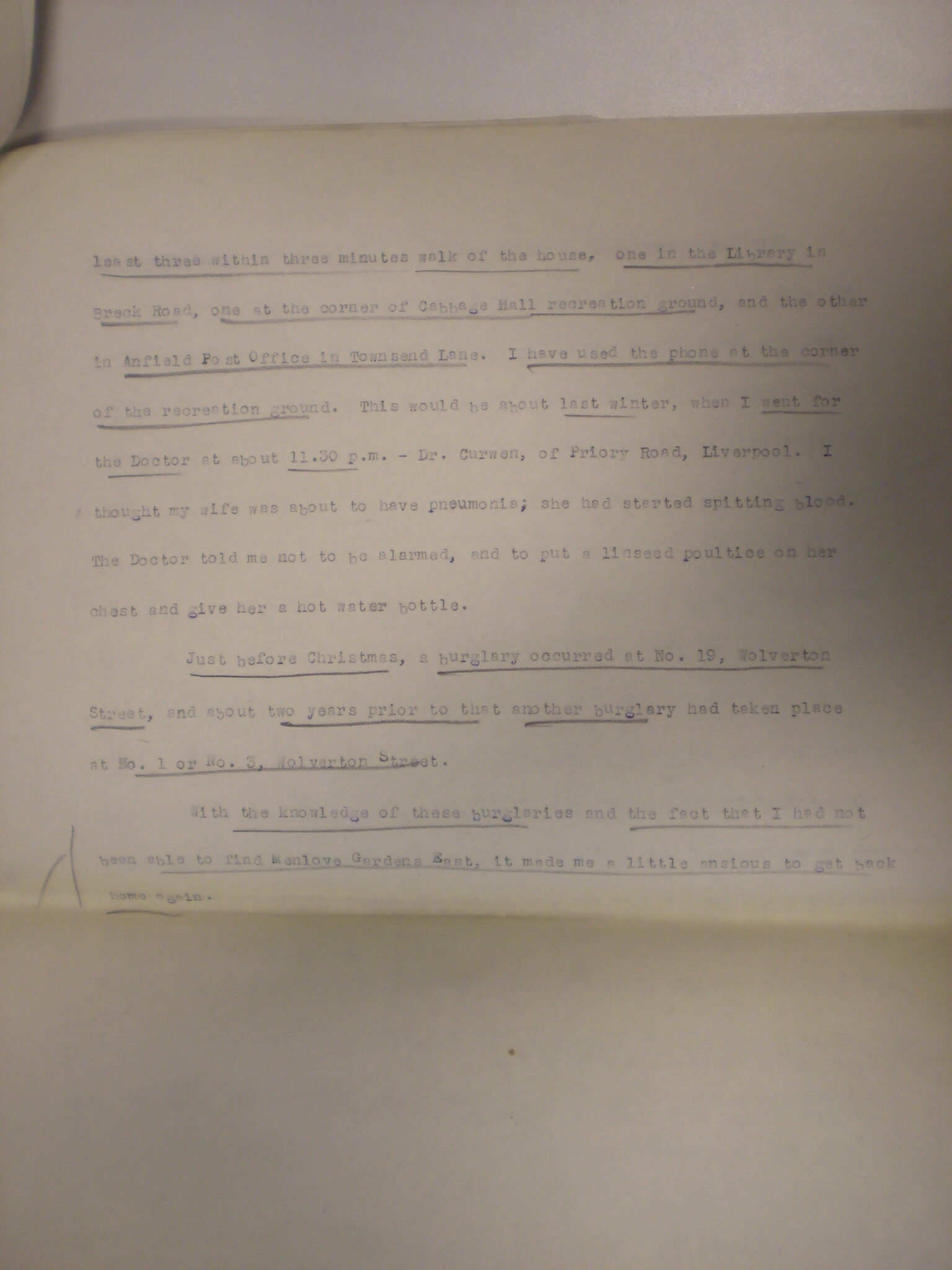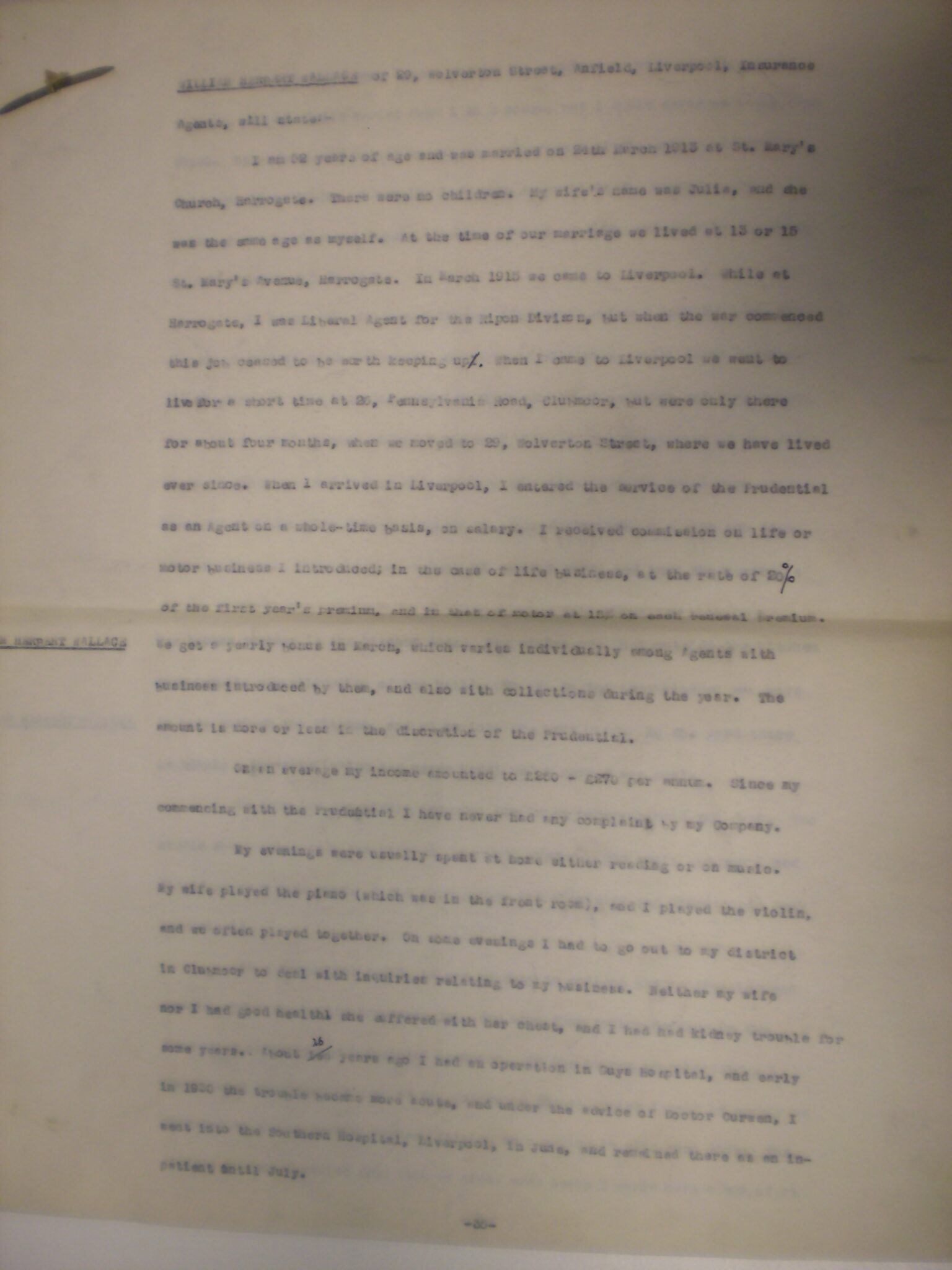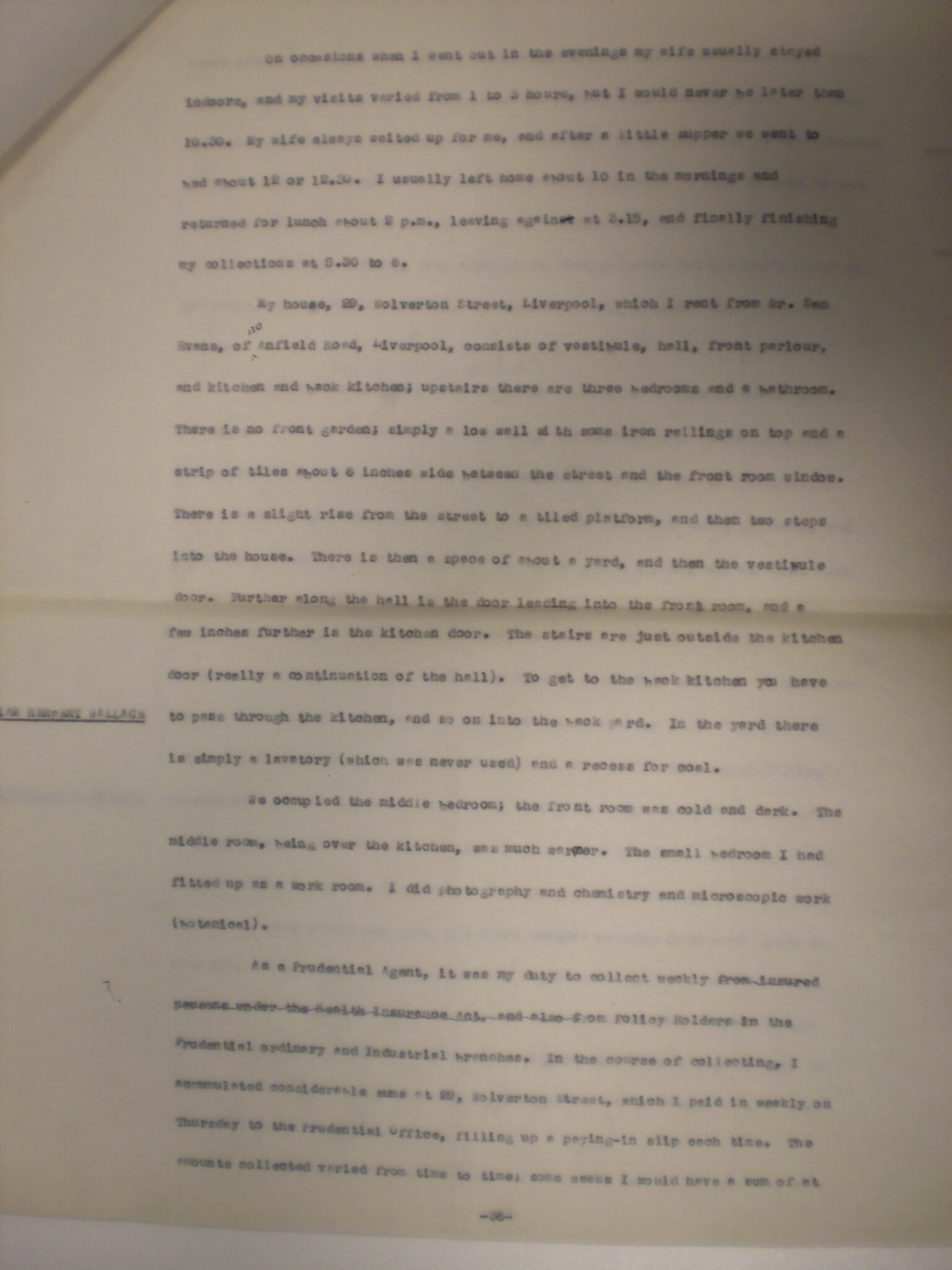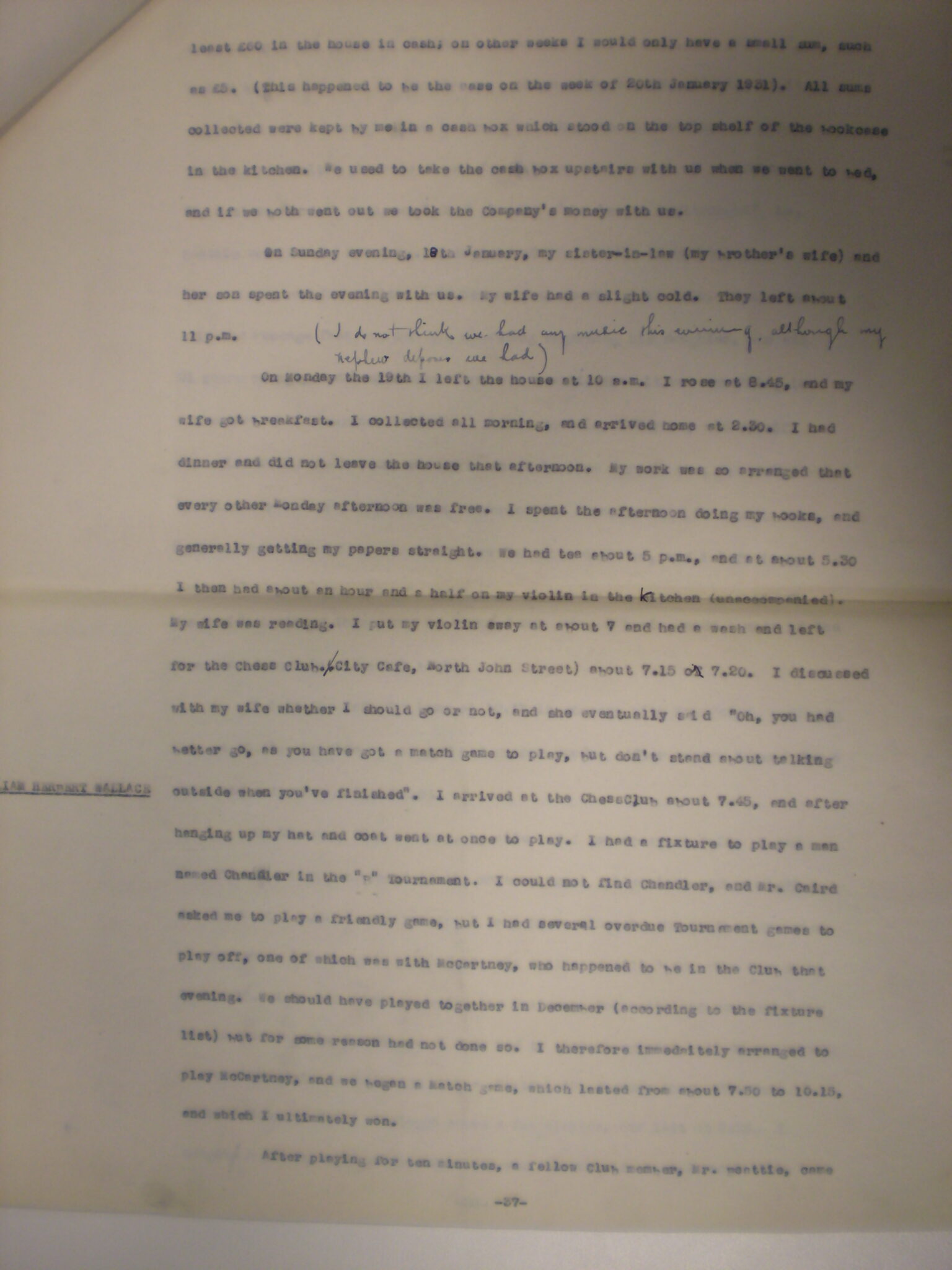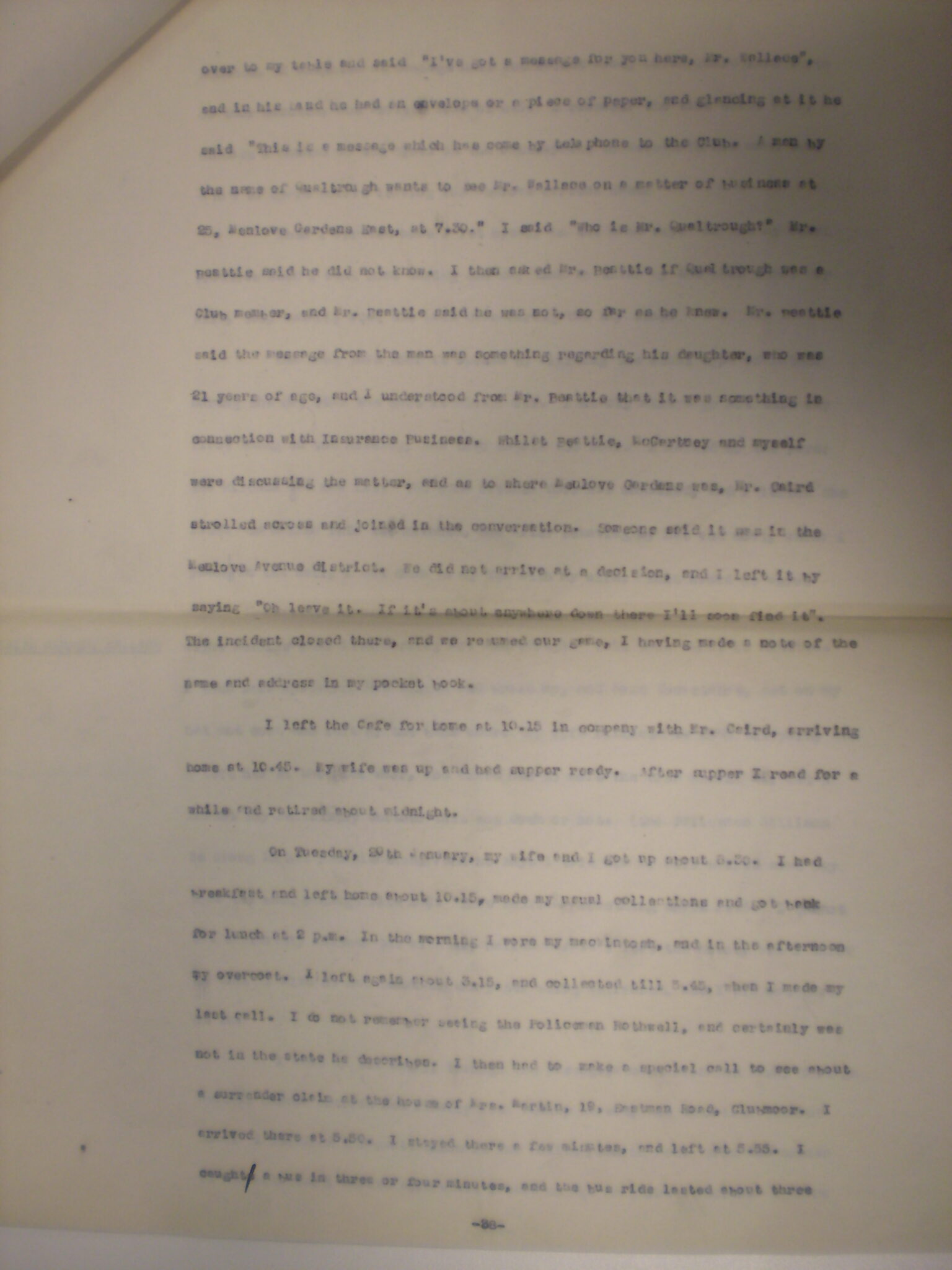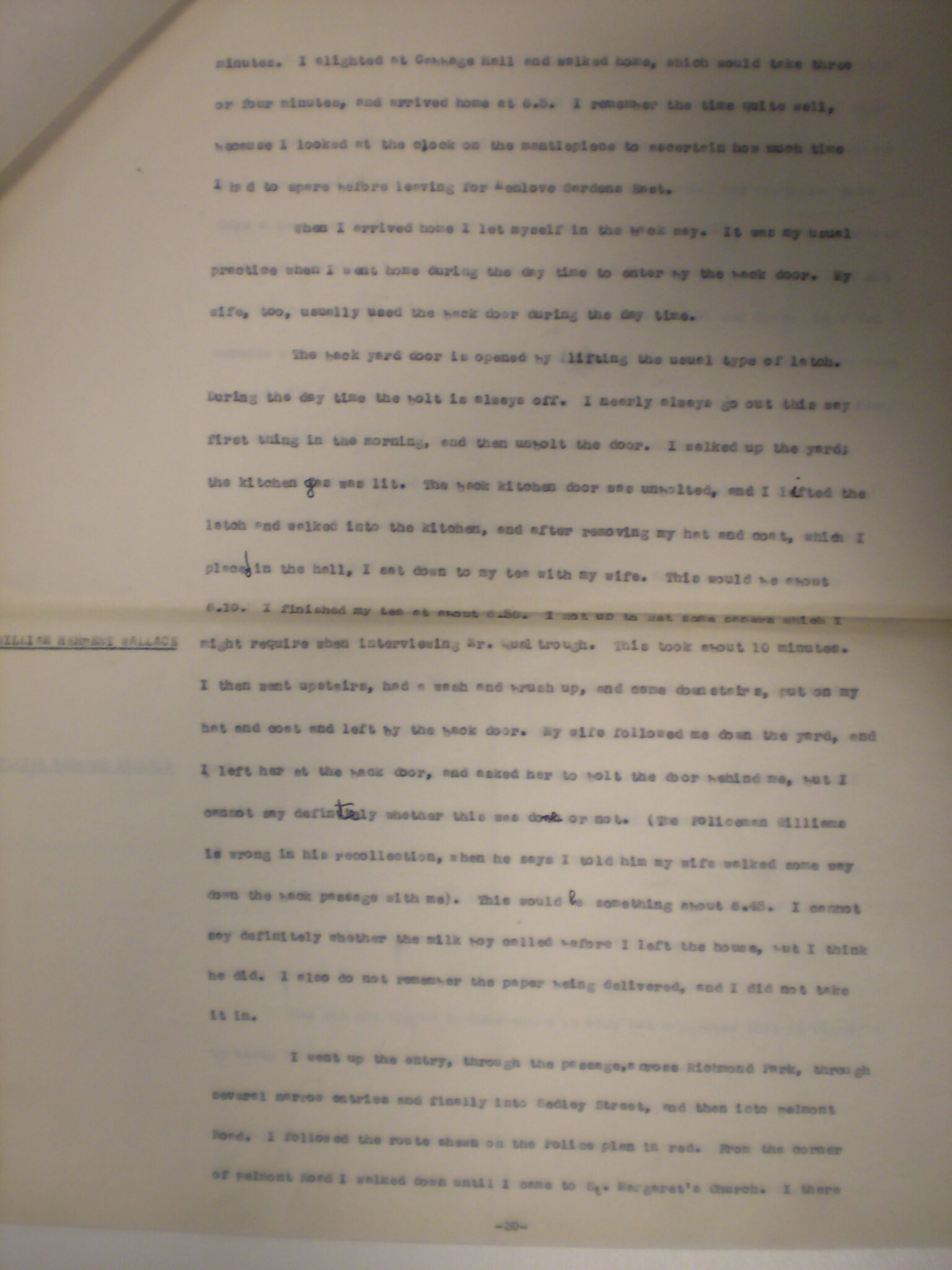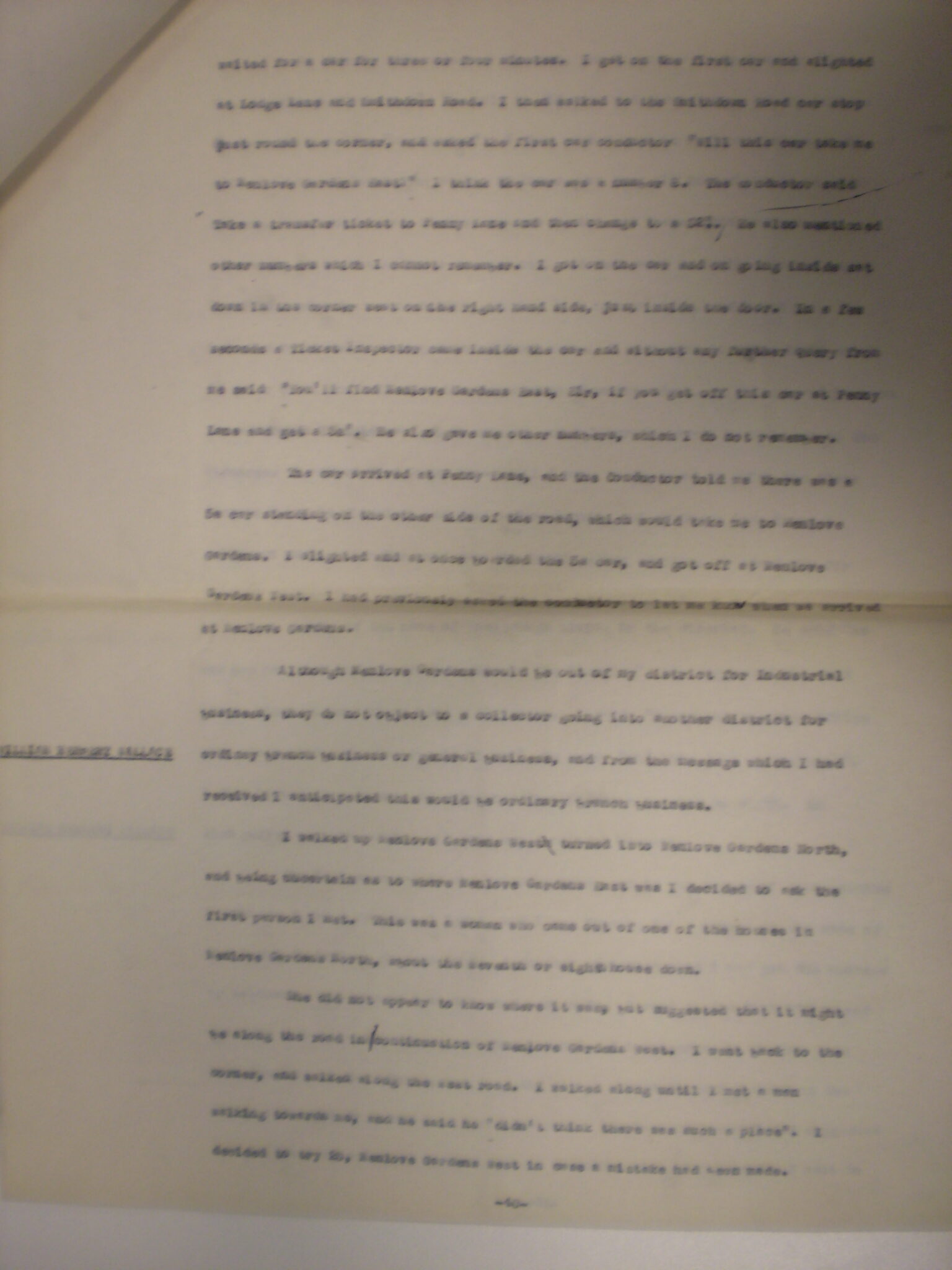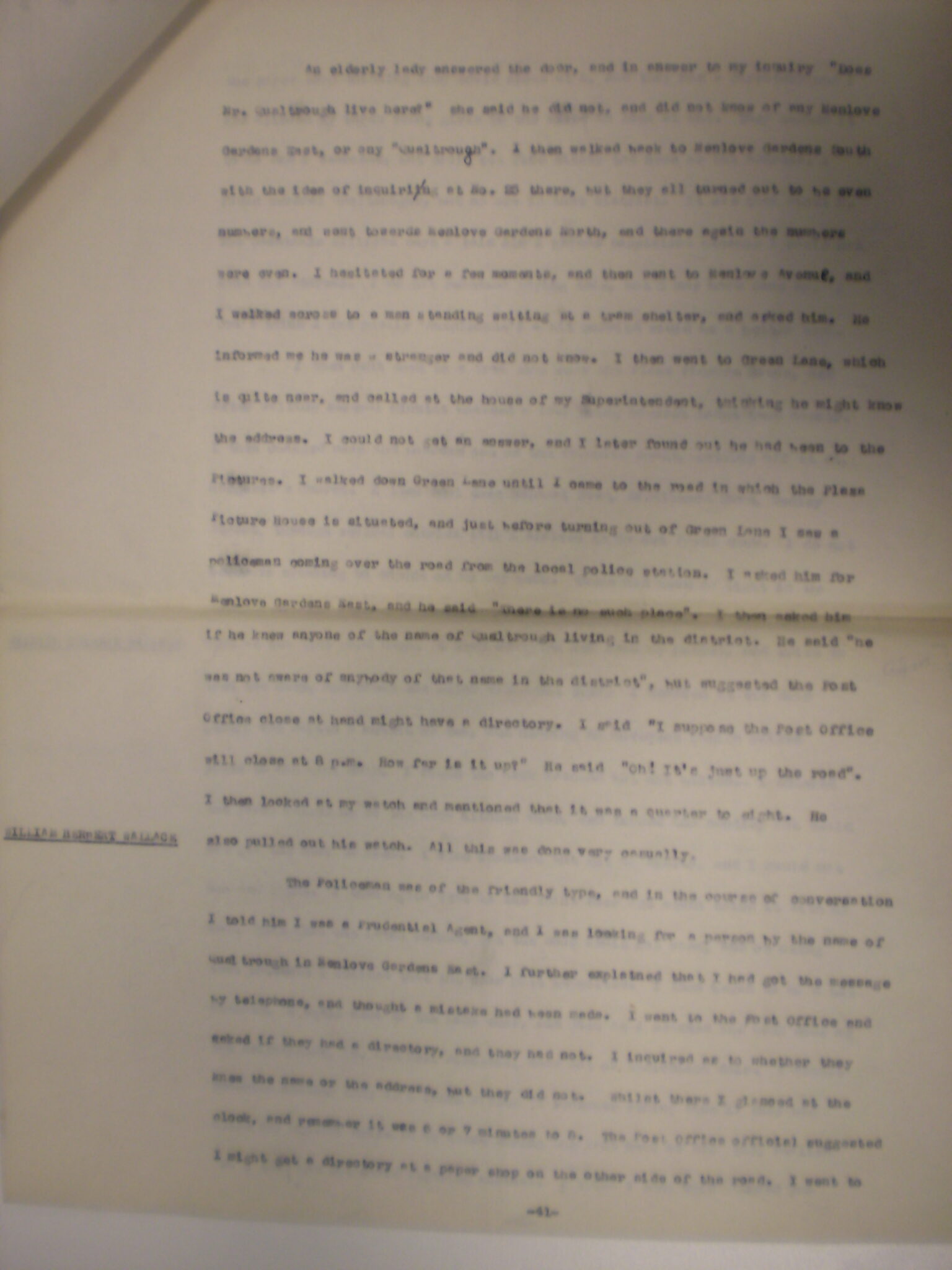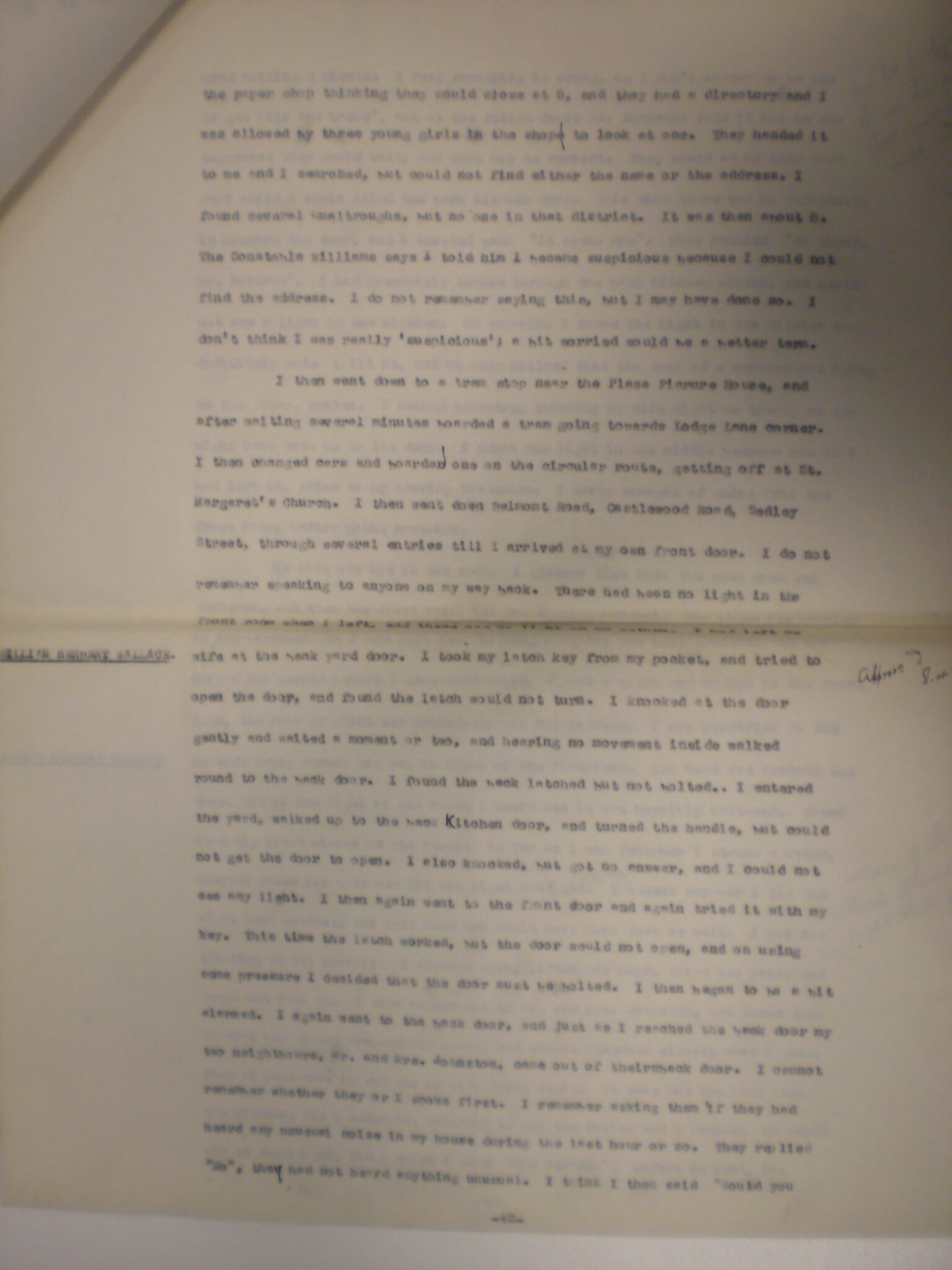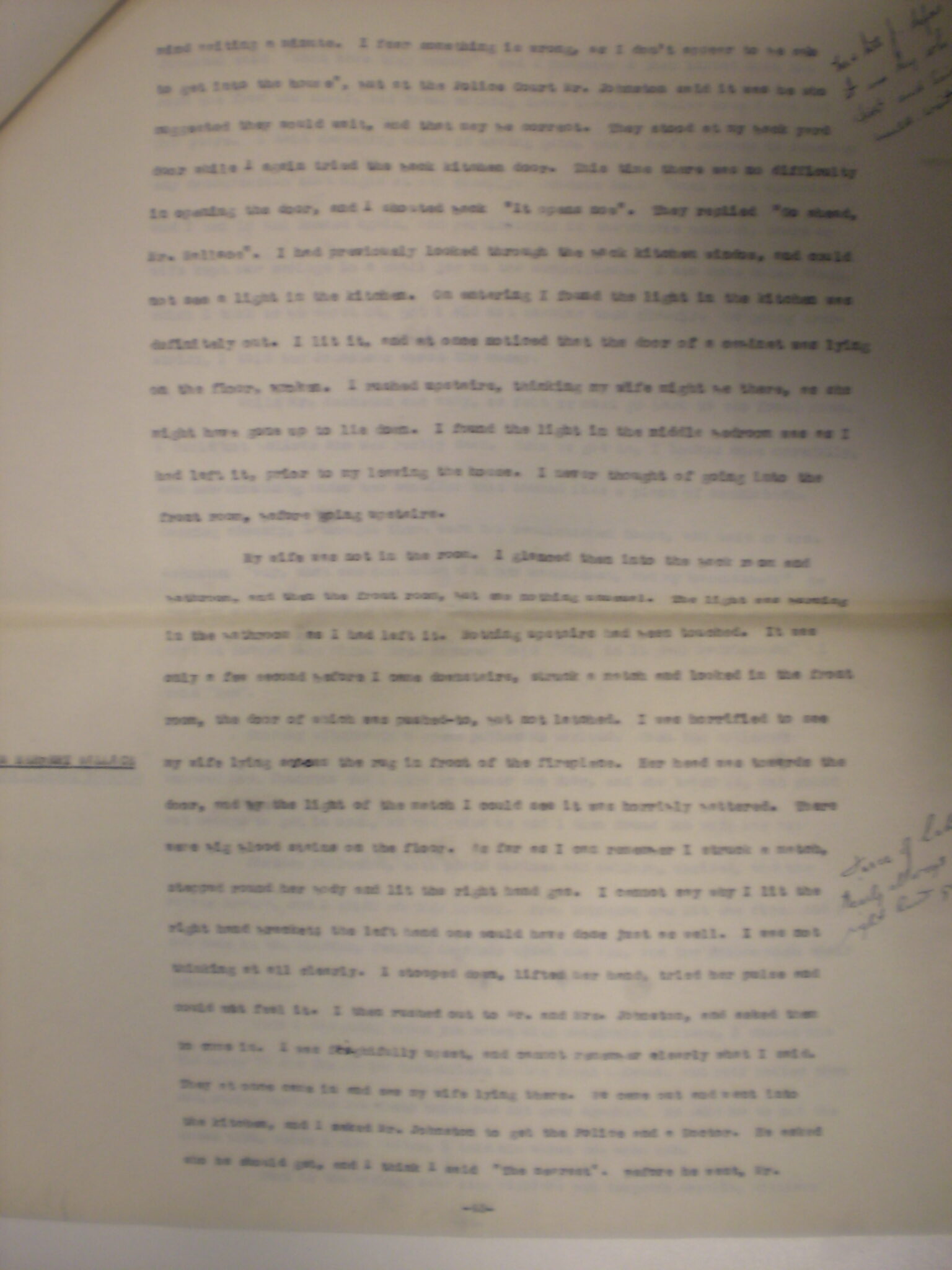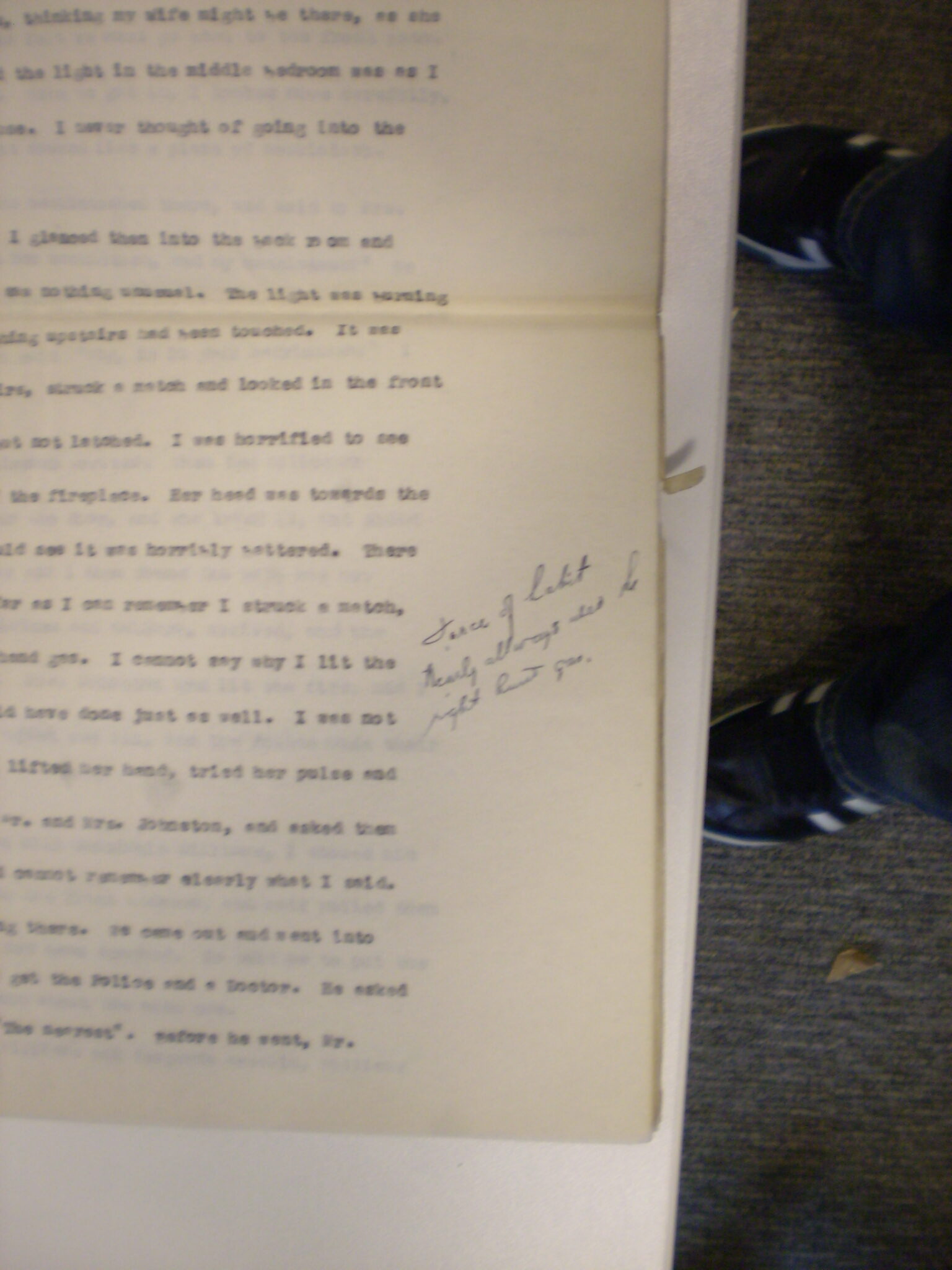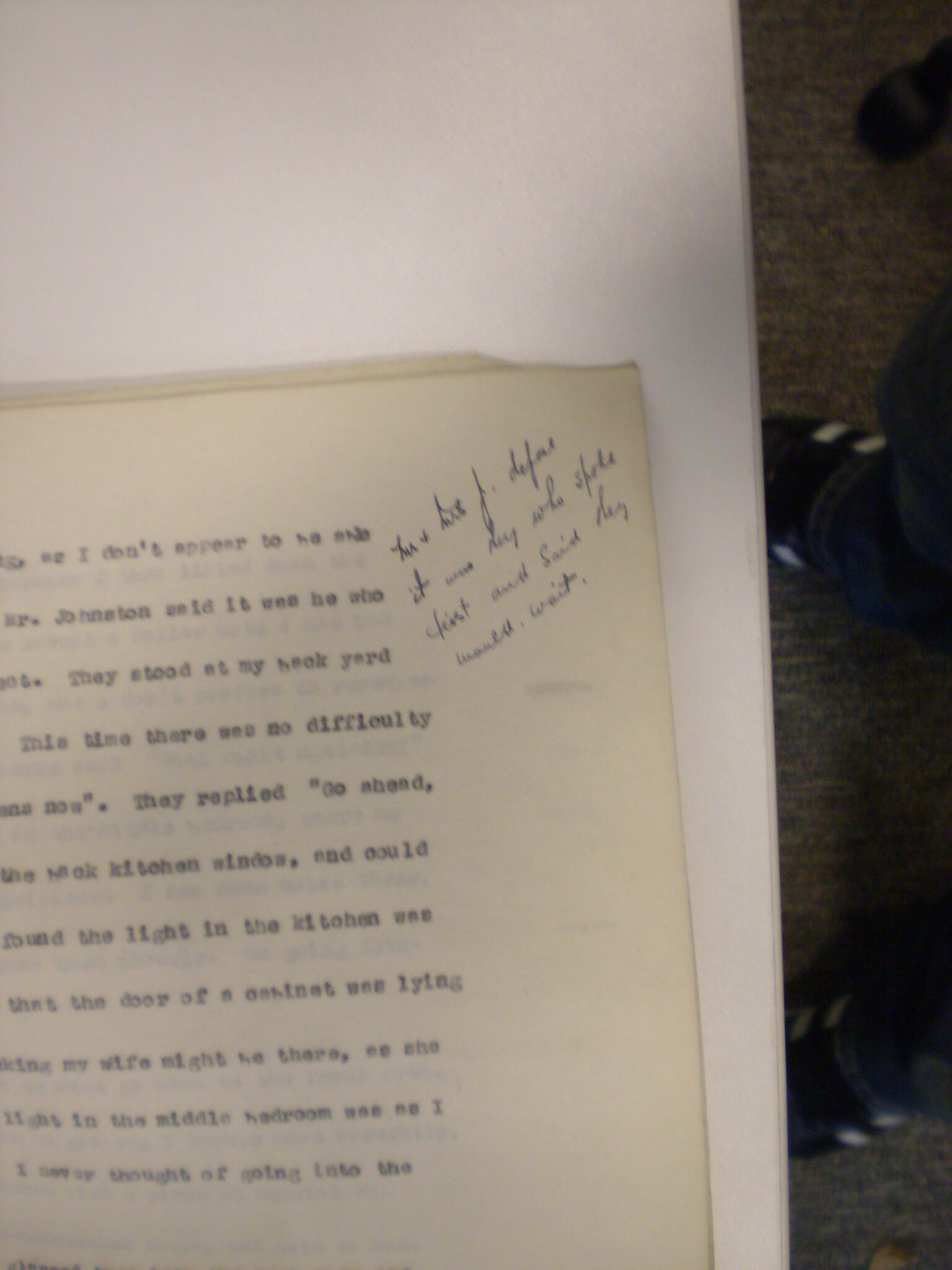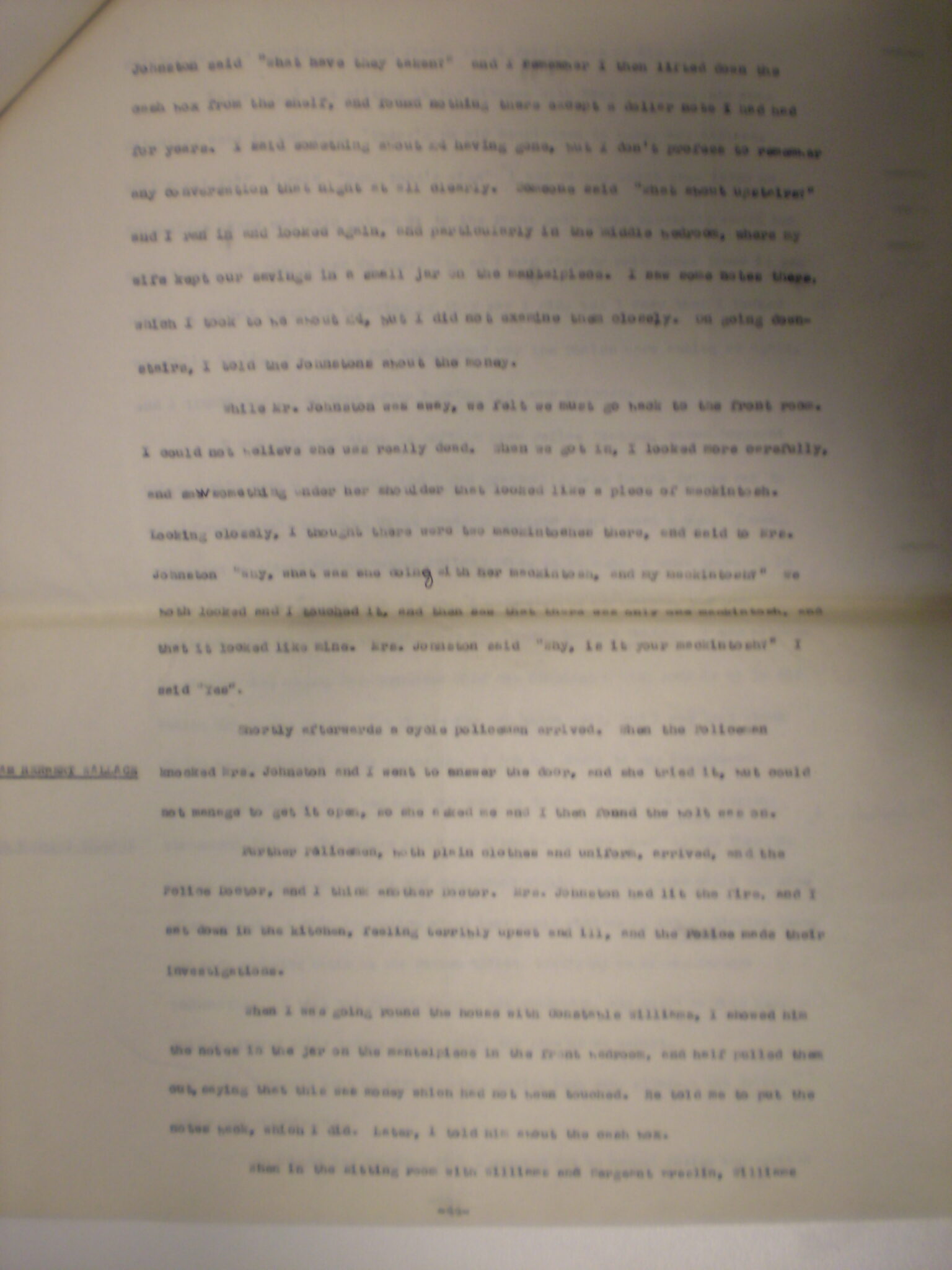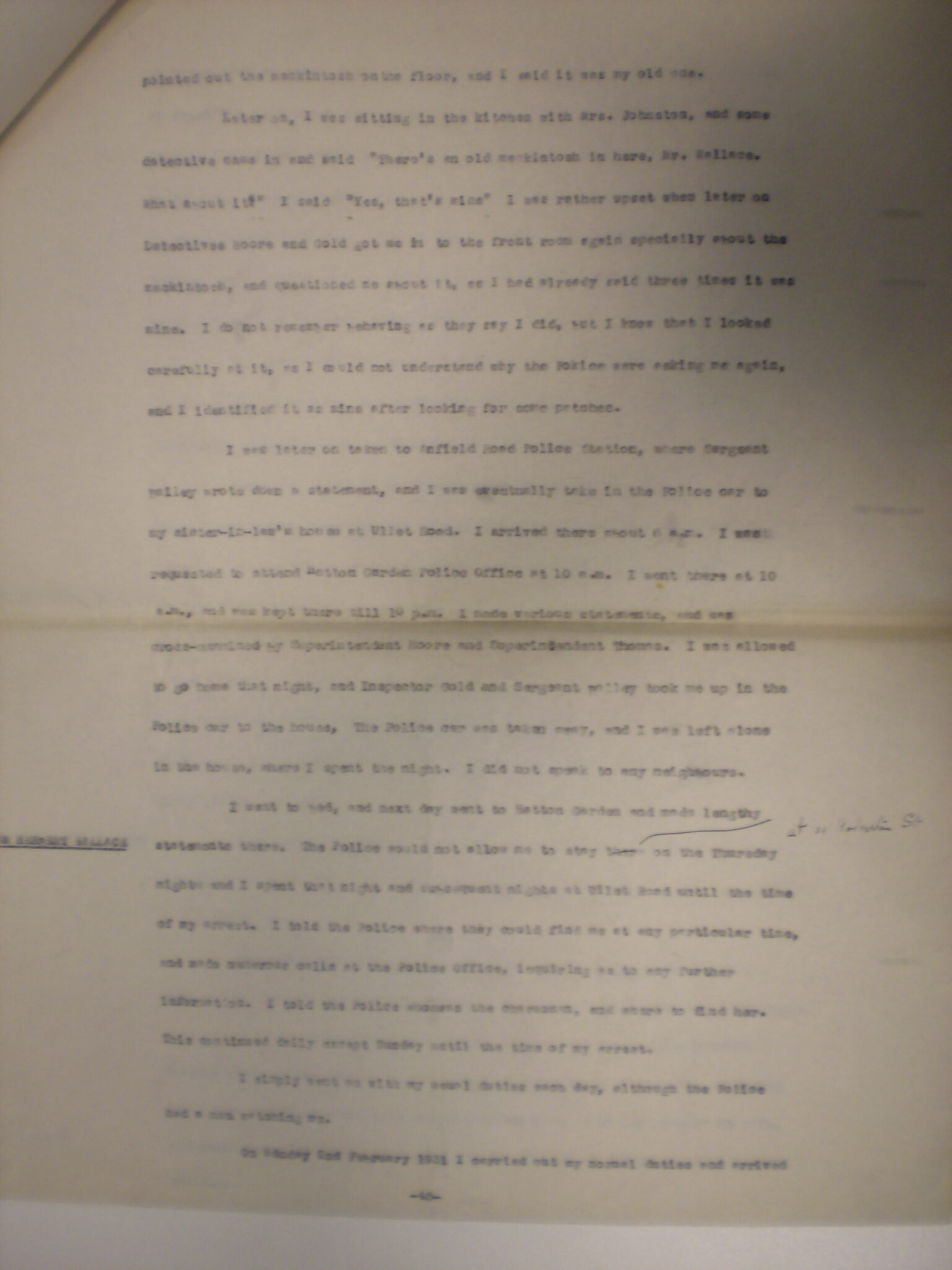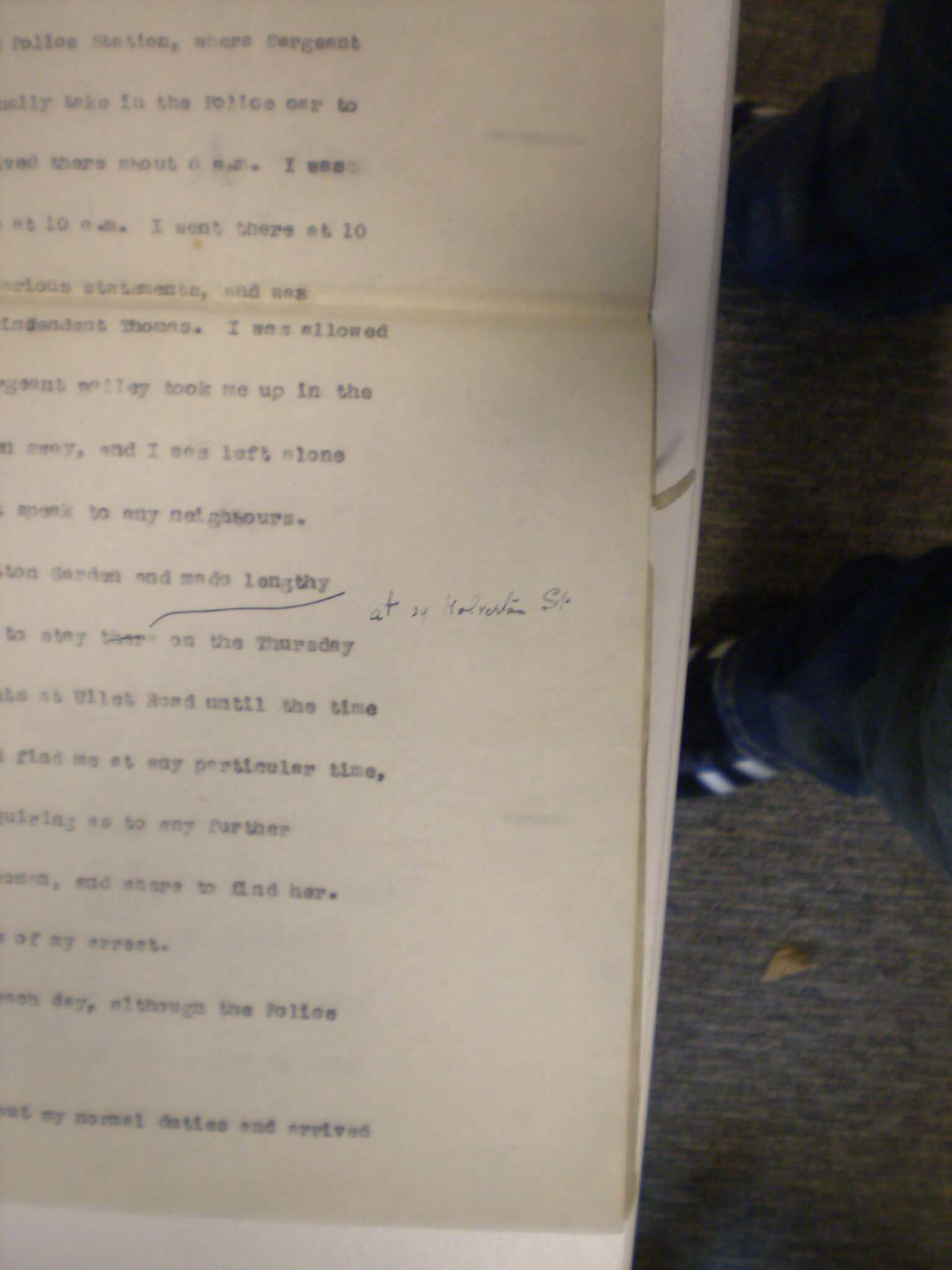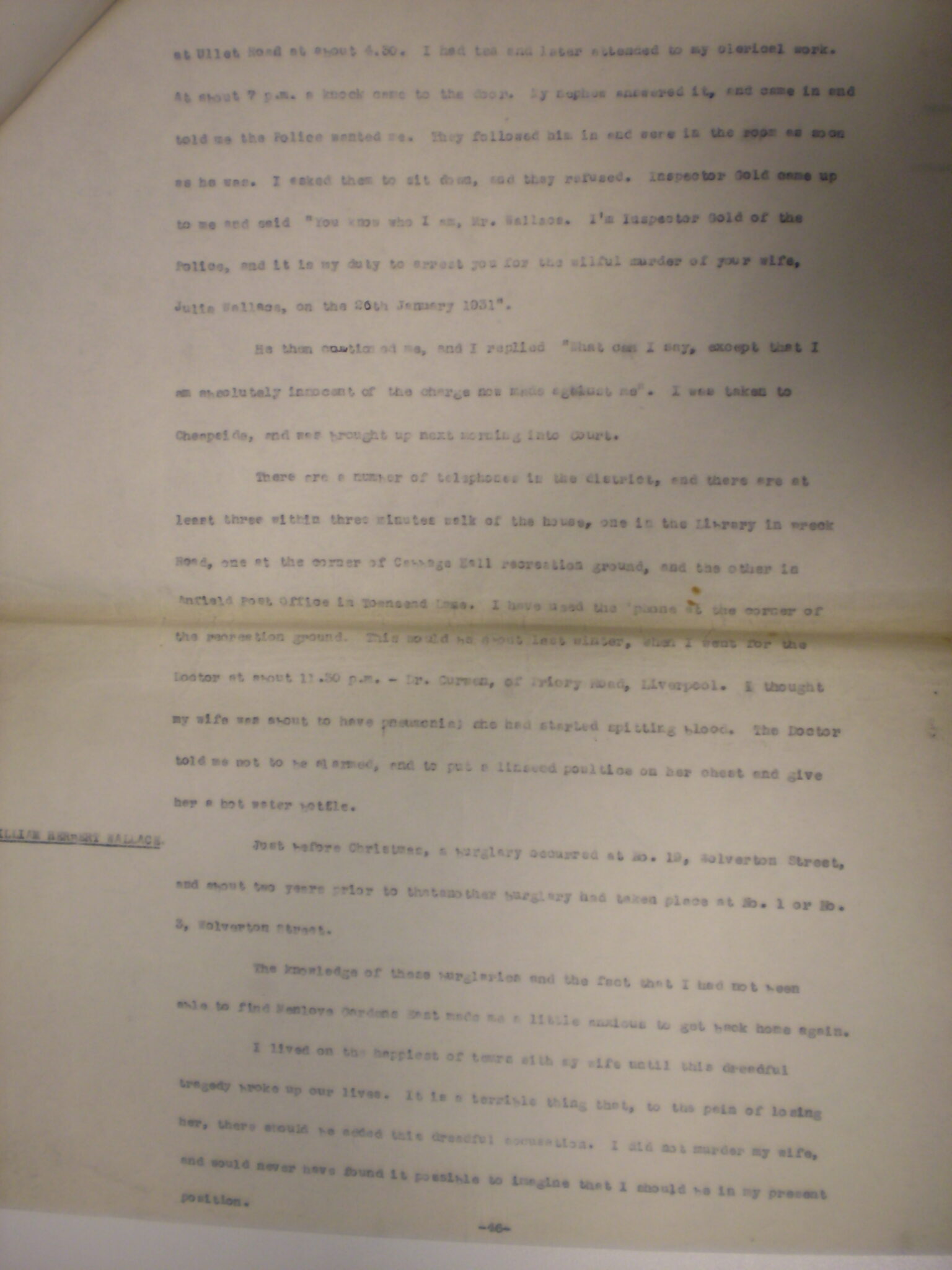CLICK THE IMAGES TO VIEW IN FULL SIZE FOR READING. SAVING TO ALLOW FOR EXTRA ZOOM MAY HELP ON THE MUNRO FILES.
Statement to Constable Fred Williams:
Note that the constable DID NOT write this down at the time, he is simply relaying the statement from memory. He made notes on the matter later on:
“I don’t know what’s happened. Somebody has been in the house. I left the house at a quarter to seven to go to Menlove Gardens. She came with me to the back yard door and walked a little way along the entry and then she went in, and bolted the back yard door after her. She would then be alone in the house. I went to Menlove Gardens but found that the address I’d had been given was wrong. I returned home, being suspicious that something had happened. It was then about 20 minutes to 9. I tried to open the front door with my key but found I couldn’t, so I went around to the back. The back yard door was on the latch but not bolted. I went up the yard and tried the back kitchen door and being unable to open it, I again went around to the front door. I then found that the door was bolted on the inside. I at once rushed round to the back again and this time I found I could open the back kitchen door. I came in and this is what I found”.
Prejudicial Analysis:
- States Julia followed him down the entry and then returned and bolted the back yard door. He could not know that she had bolted the door if he was not at the yard door when she did so.
- Found the back yard door on latch. The criminal must have escaped out the back door since the front door is bolted. It could be argued that a panicked criminal fleeing a scene would not bother to shut doors behind him as he flees.
Points of lesser relevance due to the statement not being officially taken down. Constable Williams could be misremembering, even though he claims to be certain that William suggested his wife walked down the entry with him (because he considered a criminal slipping in through the back yard door as this was happening).
20/01/1931:
Of possible note, Amy and Edwin Wallace claim that William had been drinking Brandy (alcohol) when they arrived that night. Therefore consider possible intoxication when this statement was given.
Various spelling and grammatical errors present in the official document. Preserved in the transcription.
Anfield Detective Office.
Tuesday 20th Jan 1931.
WILLIAM HERBERT WALLACE says:-
I am 52 years ad by occupation an Insurance Agent for the Prudential Assurance Co, Dale Street. I have resided at 29 Wolverton Street with my wife Julia (deceased) age, believed 52 years, for the past 16 years. There is no children of the marriage my wife and I have been on the best of terms all our married life. At 10.30am to-day I left the house, leaving my wife in doors, doing her household duties. I went on my Insurance rounds in Clubmoor district. My last call being 177 Lisburn Lane, shortly before 2p.m. I then took a tram car to Trinity Church, Breck Road, arriving at my house at 2.10p.m. My wife was then well and I had dinner and left the house at about 3.15p.m.
I then returned to Clubmoor and continued my collections finishing about 5.55p.m. My last call being either 19 or 21 Eastman Road. I boarded a bus at Queens Drive and Townsend Avenue, alighted at Cabbage Hall and walked up to my house at about 6.5p.m. I entered my house by back door, which xx is my usual practice, and then had tea with my wife, she was quite well and then I left the house at 6.45p.m. leaving by the back door. I caught a car from Belmont Road and West Derby Road and got off at Lodge Lane and Smithdown Road, and boarded a Smithdown Road Car to Penny Lane. I then boarded another car up Menlove Avenue West (sic), looking for 25 Menlove Avenue East (sic), where I have an appointment with Mr.A.M.Qualtrough (sic) for 7.30p.m. in connection with my Insurance business I was unable to find the address and I enquired at 25 Menlove Avenue West (sic) and I also asked at the bottom of Green Lane, Allerton, a Constable about the address. He told me there was no such address. I then called at Post Office near the Plaza Cinema, to look at the directory but there was none there, and I was unable to find the address. I also visited a newsagent’s there where there was a directory, bit I was unable to find the address. It was then 8p.m. and I caught a tramcar to Lodge Lane and then a car to West Derby Road and Belmont Road and walked home from there.
I arrived at Wolverton Street about 8.45p.m. || and I pulled out my key and went to open the front door and found it secure and could not open it with my key. I knocked gentle but got no answer. I could not see any light in the house. I then went around the back, the door leading from the entry to the back yard was closed but not bolted. I went into the to back door of the house and I was unable to get in, I do not know if the door was bolted || or not, it sticks sometimes, but I think the door was bolted, but I am not sure. There was a ^small light in the back kitchen, but no light in the kitchen. I then went back to the front. I was suspicious because I expected my wife to be in, and the light on in the kitchen. I tried my key in the front door again and found the lock did not work properly. The key would turn in it, but seemed to unturned without unlocking the door. I rushed around to the back and saw my neighbours, Mr and Mrs Johnstone, coming out of 31 Wolverto Street. I said to them “Have you heard any suspicious noises in my house during the past hour or so.” Mrs. Johnstone said they hadn’t, I said then, I couldn’t get in and asked them if they would wait a while while I tried again. I then found the back kitchen door opened quite easily.
I walked in by the back kitchen door I found kitchen light out, I lit it and found signs of disturbance in the kitchen a wooden case in which I keep photographic stuff in had been broken open and the lid was on the floor. I then went upstairs and entered the middle bedroom, but saw nothing unusual. I then entered the bathroom but thi was correct. I then entered the back room and found no disturbance there. I then entered the front room,struck a match and found the bed upset. The clothes being off. I don’t think my wife left it life that. I then came down and looked into the front room, after striking a match and saw my wife lying on the floor. I felt her hand and concluded she was dead.
I then rushed out and told xxx my Mr.and Mrs. Johnstone what had happened saying something but I cannot remember what I did say. After my neighbours had been in Mr Johnstone went for the Police and a Doctor, I asked him to go. I afterwards found that about £4 had been taken from a cash box in the kitchen but I am not sure of the amount. When I discovered my wife lying on the floor I noticed my macintosh lying on the floor at the back of her. I wore the macintosh up to noon to-day, but left it off owing to the fine weather. My wife has never worn the macintosh to my knowledge. You drew my attention to it being burnt, but it was not like that when I last saw it and I ^cannot explain it. I have no suspicion of anyone.
Signed William Herbert WALLACE.
There was a dog whip with a lash in the house which I have not seen for 12 months, but I have not foudn it up to now. It usually hung on the hall stand. The handle was wood, 12″ long and 1″ thick, I dont think there was any metal about this.
Prejudicial Analysis:
- Claims to have left the house at 6.45 with his wife in tow. If accurate this means Allan could not have knocked at the door and received an answer at 6.45, because both William and Julia are out the back of the house.
- Further, John Sharpe Johnston claims to have arrived home himself at this time, but did not see William or Julia in the entryways or spot William crossing the street on Richmond Park. It is possible he came back to his house by the front way or is off on his timing, but it was common practice for residents of Wolverton Street to enter and exit their homes by the back entry during the day. Indeed the Johnstons are leaving by their back door two hours later at 8.45.
- Shows some familiarity with the area by identifying Green Lane and the Plaza Cinema by name. Green Lane is recognized by him because Mr. Crewe lives on that road, and the Plaza Cinema is a location he has previously visited with Mr. Crewe.
- Specifying that his knocks on the front door were gentle is unusual. It is also unexpected if he thinks there may be something wrong at the house (as he later alludes to feeling as a result of the false address he was given). Keep in mind that Wallace later refers to the officer interviewing him (“you drew my attention to it”) so he may have been asked to be specific on this point.
- Locksmith statements suggest the door locks had been in the same condition for a long time. If this is accepted as accurate, the action of the key should not be surprising and the door should not be difficult to unlock for someone familiar with using it.
- Identifies the front room as being disturbed: This should be kept in mind because statements about the level of disturbance in the room vary.
22/01/1931:
Dale Street Detective Office.
22.1.31.
William Herbert WALLACE further states:-
Mr. Gordon R. Parry, of Derwent Rd., Stoneycroft, is a friend of my late wife and myself. He is now an agent for the Gresham Insurance Coy. but I’m not quite sure of the Company.
He was employed by the Prudential up to about 12 or 15 months ago, and he then resigned to improve his position. Although nothing was known officially to the company detrimental to his financial affairs, it was known that he had collected premiums which he did not pay in and hsi Supt. My. Crewe, of Green Lane, Allerton, told me that he went to Parry’s parents who paid about £30 to cover the deficiency. Mr. Crewe’s office is at 2 Gt.Nelston St.
Parry is a single man about 22 yrs. of age. I have known him about three years and he was with my company about two years. I was ill with Bronchitis in December in 1928 and Parry did part of collecting for about two or three days a week for about three weeks. I discovered slight discrep-anciec and I spoke to him about it. He was short of small amounts when paying in and he had not entered all the amounts collected in the book. When I spoke to him he said it was an oversight and that he was sorry and he put the matter right. Previous to Parry doing my work he had called at my house once on business and left a letter for me which he wrote in my front room. I was not in at the time but my wife let him in. While he was doing my work in Dec. 1928 he called very frequently to see me about business, and he was well acquainted with our domestic arrangements. He had been in the parlour and kitchen frequently and had been upstairs in the middle bedroom a number of times to see me while I was in bed. I do not think he called to see me after I resumed duty in Jan. 1929, but if he had have called my wife would have had no hesitation in admitting him. I have often seen him since he has been working for his new company and have spoken to him. About last November I was in the City Cafe one evenine, I think it was on a Thursday, playing chess, and I saw Parry there. He was not playing chess. He was by himself walking across the room. I said “Good-evening” and he returned my greeting. I think that was the last time I saw him. He is a member of an Amateur Dramatic Society which holds its meetings at the City Cafe on Thursday evenings. I do not think he drinks. He is engaged to a Miss Lloyd, 7, Missouri Rd., Clubmoor. He would be on a weekly salary from his company plus a commission on business and his earnings would be about £4 per week.
There was another man named Marsden who also did part of the work for me while I was ill in Dec.1928. I do not know his address. He was an agent for the Prudential Coy. for two or three years and had left before he did my work. I gave him the job because he was out of work. Parry recommended him. I have heard that Marsden left the Prudential on account of financial irregularities. While he was working for me he often came to my house to see me on business. He also knew the interior arrangements of my house. I have seen Marsden several times since he worked for me. I do not know if he is working now and I do not know anything about his private affairs. If he had called at my house my wife would have asked him in. Both Parry and Marsden knew the arrangements of my business with regard to the system of paying in money collected to the Head Office, Dale Street. There is a definite order of the company’s that money must be paid in in Wednesday’s but this is not strictly enforced and I paid in on Thursdays usually. I have had the cash box from which the money was stolen for about 16 years. I always put the company’s money in that box, and it was always kept on top of the book-case in the kitchen during the day time. At night I always took it upstairs to my bedroom. Parry and Marsden know I kept the money in the box because while they worked for me I always put the money into it when they called to pay over to me their collections. They had both seen me [in bed with Flu 20th] take it down and put it back to the top of the book-case in the kitchen often. Marsden is [at home from 5.45pm to 7.30pm. &then went parents 26 Cedar Rd Aintree 20th] about 28 years of age, about 5 ft 6/7 ins. brown hair, and fairly well dressed. Parry is about 5ft 10ins. slimmish build, dark hair, rather foppish appearance, well dressed and wears spats, very plausible.
Supr. Crewe, his assistant, Mr. ^albert Wood, 26 Ellersley Rd., Mr. ^Joseph .Bamber, Ass.Supt., 43 Kingfield Road, Orrel Park employees of the Coy. would be admitted by my wife without hesitation if they called. There are personal friends of ours who would also be admitted if they called. They are Mr.F.W.Jenkinson, his son Frederick, 20 yrs?, his daughter 16, and his wife, they live at 112 Moscow Drive. Mr. James Caird, 3,Letchworth Sr. Anfield, his wife and family. He has two grown up sons. Mr. Davis, music teacher of Queens Drive, Walton, who is teaching me the violin. Mr. Hayes, my tailor of Breck Road.
I forgot to mention that I believe Mr. Parry owns a motor car or has the use of one, because I was talking to him about Xmas time in Missouri Rd. and he had a car then which he was driving. He gave me one of his Company’s calendars.
When I left the house at 6.45p.m. on Tuesday night last my wife came down the back yard with me as far as the yard door, she closed the yard door. I do not remember hearing her bolt it. On Monday night the 19th inst. I left home about 7.15p.m. and started to play a game of chess with a man whose name I think is McCarthy (sic), but I am not sure of him and I do not know his business. He is a member of the club. We had been playing for about ten minutes when Capt. Beattie came to me and told me there had been a telephone message for me from a Mr. Qualtrough asking me to go and see him at 25, Menlove Gardens East at 7.30p.m. on Tuesday, the 21st inst. on a matter of business. Capt. Beattie had the name Qualtrough and the address 25, Menlove Gardens East, and the time and date of the appointment | written on an envelope and I copied it into my diary. Mr.Caird was present and we all discussed the best way to get to Menlove Gardens. When I left home of Monday night to go to the Chess club I think I walked along Richmond Park to Breck Road and then up to Belmont Road, where I boarded a tram car and got off at the corner of Lord Street and North John Street.
When I was at Allerton looking for the address 25, Menlove Gardens East, in addition to the people I have already mentioned I enquired from a woman in Menlove Gardens North. She came out of a house near the end by Menlove Gardens West. She told me it might be further up in continuation of Menlove Gardens West. I went along as suggested by her and came to a cross road, I think it was Dudley Road, and I met a young man about 25 years, tall and fair, and I enquired from him but he could not inform me. I walked back down the West Gardens to the South Gardens and found all even numbers. I did not knock and came out on to Menlove Avenue itself, when I saw a man waiting for a tram by a stop where there was a shelter. I went up to him and asked him if he could tell me where Menlove Gardens East was, he said he was a stranger and did not know. I think these are all the people I spoke to that night at Allerton.
When I got back home after getting into the house and making the discovery of my wife’s death, Mr. Johnston went for the Doctor and Police. Mrs. Johnston and I stayed in and some time after a knock came to the front door. I answered it and it was thus I found that the front door was bolted. The safety catch was not on the latch lock. I opened the door and admitted the Constable. That was the first time I went to the front door after getting into the house.
When I left my house at 6.45p.m. my wife was sitting in the kitchen, that is, when I had got my hat and coat on read to go, and as I have already said, she came down the yard with me. The tea-things were still on the table. When I got back the table had been cleared of the tea-things.
There is a Mr. Thomas, a member of the chess club and a Mr. Stan Young who used to be an employee of our Coy. who would be admitted by my wife if they called. I do not know their addresses. My wife had no friends unknown to me as far as I know. I have now found by the calendar that Mr. Parry’s employers are the Standard Life Assurance Coy., whose head office is at 3, George Street, Edinburgh.
29/01/1931:
83, Ullet Road.
29.1.31.
William herbert WALLACE further states:-
On Monday night the 19th inst. when I left home to go to the chess club I think I went out by the back door and up the passage to Richmond Park and then up Breck Road and got the tram at Belmont Road. I do not remember seeing anyone I know. I am not sure but I have an idea that I posted a letter in the pillar box opposite the library in Breck Road. I have a lot of correspondence and I have no special reason for remembering about whether or not I did post a letter that night because I post so many.
When I returned home at 8.40p.m. on Tuesday the 20th inst. I went to the front door because it was my usual practice if I was out late at night. It was my usual practice to use the back door in daylight and if I went out by the back way after dark my wife usually came down the yard and bolted the yard door after me when I went out.
As far as I can recollect I do not know anyone named Hall living in the neighbourhood of Wolverton Street or Richmond Park or any of the streets adjacent, but I have an idea that I have heard my late wife mention of that name in connection with Holy Trinite (sic) Church, but my recollection of that is very hazy. In the summer of 1929 I remember my wife and I had been out for a walk. I had forgotten to take my key and we had to borrow a key from Mr. Gosling who lives on the opposite side of Wolverton Street and his key opened our front door. Some years ago a man named Cadwallader, who lives at 33 Wolverton street, had a key that opened our door, because he used to drink and on several occasions he made a mistake and came into our house instead of his own. He has been dead several years and his widow and son still live at 33 Wolverton Street.
Munro Files (#1):
“WILLIAM HERBERT WALLACE of 29, Wolverton Street, Anfield, Liverpool, Insurance Agent, will state:-
(Married 18 years) I am 52 years of age. I was married in 1913, but cannot now remember the exact date. The marriage was at St. Mary’s Church, Harrogate, Yorks. There were no children. My wife’s name was Julia, and she was the same age as myself.
At the time of our miarrage we lived at 15 or 13 St. Mary’s Avenue. In Mach 1915 we came to Liverpool. While at Harrogate, I was Liveral Agent for the Ripon Divison, but when the war commenced this job ceased to be worth keeping up. When I came to Liverpool we went to live for a short time at 26, Pennnsylvania Road, Clubmoor, but were onlt there for about four months, and we then moved to 29, Wolverton Street (___ Wolverton St), where we have lived ever since.
When I arrived in Liverpool, I entered the service of the Prudential as an Agent on a whole-time basis, on salary, not commission. I received commission on fire business I inroduced, and also on any life insurance introduced. The commission, however, did not amount of more that a few pounds per annum.
We get a yearly bonus in March, which varies with business introduced, and also with collections during the year. The amount is more or less in the discretion of the Prudential.
On an average my income amounted to £260 – £270 per annum. Since my commencing with the Prudential I have never had any complain by my Company.
My evenings were usually spent at home either reading or on music. My wife played the piano, and I played the violin, and we often played together. Some evenings we played for half an hour, and on other evenings two hours. We played every evening, if only for a few minutes. On some evenings I had to go out to Clubmoor to deal with enquiries relating to my business. Clubmoor was my district.
On occasions when I went out my wife usually stayed indoors, and my visits varied from 1 to 3 hours, but I would never be later than 10:50. My wife always waited up for me, and after a little supper we usually retired about 12 or 12.50. I usually left home about 10 in the mornings and returned for lunch about 2 p.m., leaving again at 5.15, and finally finishing my collections at 5.30 to 6.
My house, 29, Wolverton Street, Liverpool which I rent from Mr. Sa, Evans, of ANfield Road, Liverpool, (at a rental of – I am not sure if it was 14/3 or 14/6 per week) consists of front parlour, kitchen and back kitchen; upstairs there are three bedrooms and a bathroom. There is no front garden; simply a low wall with some iron railings on top and a strip of tiles about 6 inches wide. There is then a space of about a yard, and then the vestivule door. Further along the hall is the door leading into the front room, and a few inches further is the kitchen door. The stairs are just out-side the kitchen door (really a continuation of the hall).
To get to the back kitchen you have to pass through the kitchen, and so on into the back yard. In the yard there is simply a lavatory (which was never used) and a recess for coal.
We occupied the middle bedroom; the front room was cold and dark. The middle room, being over the kitchen, was much warmer. The small bedroom I used as a work room. I did photography and chemistry and microscopic work (botanical).
On Sunday evening, 18th January, my sister-in-law (my brother’s wife) and her son spent the evening with us. The arrived about 5.30 or 7, and we spent the evening talking. My wife had a slight cold, and we did not have any music. The left about 11 p.m.
On Monday the 19th I left the house at 10 a.m. rose at 8.45, and my wife got breakfast. I collected all morning, and arrived home at 2.50. I had dinner and did not leave the house that afternoon. My work was so arranged that every other Monday afternoon was free. I spent the afternoon doing my books and generally getting my papers straight. We had tea about 5 p.m., and at about 5.30 I then had about an hour and a half on my violin in the kitchen (unaccompanied). My wife was reading.
I put my violin away at about 7 and had a wash and left for the Chess Club (City Cafe, North John Street) about 7.15 or 7.20. The Cafe remains open to 10.15. I arrived at the Chess Club about 7.50 [or does it read 7.30?], and after hanging up my hat and coat and went at once to play with a man named McCarthy, whom I had been drawn against in a tournament. The tournament had been arranged some time, but I had not definitely made an appoint-ent.for this game. I had simply gone down for a game [off chess/on chance?].
I had no definite arrangement to play on any particular night, except that Monday and Thursday nights were recognised Club nights.
After playing for ten minutes, a fellow club mmber, Mr. Beattie, came over to my table and said “I’ve got a message for you here, Mr. Wallace” and in his hand he had an envelope or a piece of paper, and glancing at it he said “This is a message which has come by telephone to the Club, and was received by one of the waitresses and not by myself”.
“A man by the name of Qualtrough wanted to see Mr. Wallace on a matter “of business at 25, Melove Gardens East”.
I said “Who is Mr. Qualtrough?.” Mr. Beattie said he did not know. I thenasked Mr. Beattie if Qualtrough was a member of the Club, and Mr. Beattie said he was not aware of any person of that name being a member of the Club.
Mr. Beattie said the message from the man was something regarding his daughter, who was 21 years of age, and I understood from Mr. Beattie that my proposed visit was something in connection with Insurance business. Whilst Beattie, McCarthy and myself were discussing the matter, and as to how I should get there, Mr. Caird strolled across and joined in the conversation. We did not arrive at a decision, and I left it b saying “Oh leave it. If it’s about anywhere down there (? Menlove Avenue) I’ll soon find it”. The incident closed there, and we resumed our game, I having made a note of te name and address in my pocket book.
I played till 10.1_ with Mr. McCarthy, and left for home at 10.15 in company with Mr. Caird, arriving home at 10.__. My wife was up ad had supper ready. After supper I read for a while and retired about midnight.
On Tuesday, 20th January, I got up somewhere about 8.20 [?]. My wife rose at the same time. I had breakfast and left home abot 1_.15 [?]. I made my usual collections and got back for lunch at 2 p.m. I left again about 3.15 [or 2.15?], and collected till 5.45, when I made my last call. I then had to make a special call to see about a surrender claim at the house of Mrs. Martin, 10, ___ Road, Clubmoor. I arrived there at 5.50. I stayed there a few minutes, and left at 5.55. I caught a bus in three or four mminutes, and the bus ride lasted about three minutes. I alighted at Cabbage Hall and walked home, which would take three or four minutes,, and arrived home at 6.5. I remember the time quite well because I looked at the clock on the mantlepiece to ascertain how much time I had to spare before leaving for Menlove Gardens East.
When I arrived home I let myself in the back way. It was my usual practice when I went home during the day time to enter by the back door. My wife, too, usually used the back door during the day time.
The back yard door is opened by lifting the usualy type of latch. During the day time the bolt is always off. I nearly always go out this way first thing in the morning, and then unbolt the door, I walked up the yard; the kitchen gas was lit. The back kitchen door was unbolted, and I lifted the latch and walked into the kitchen, and after removing my hat and coat, which I placed in the hall, I sat down to my tea with my wife. This would be about 6.10. I finished my tea at about 6.30. I got up to get some papers which I might require when interviewing [?] Mr. Qualtrough. This took about 10 minutes.
I then went upstairs, had a wash and brush up, and came down stairs, put on my hat and coat and left by the back door. My wife followed me down the yard, and I left her at the back door, and asked her to bolt the door behind me, but I cannot say definitely whether this was done or not. This would be something about 6.45. I cannot say definitely whether the milk boy called before I left the house, but I think he did.
I went up the entry, through the passage, across Richmond Park, through several narrow entries and finally into Sedley Street, and then into Belmont Road. From the corner of Belmont Road I walked down until I came to St. Margaret’s Church. I there waited for a car for three or four minutes. I got on the first car and alighted at Lodge Lane and Smithdown Road. I then walked to the Smithdown Road cat stop just round the corner, and asked the first car conductor “Will this car take me to Menlove Gardens East?”. I think the car was a number 8. The conductor said “Take a transfer ticket to Penny Lane and then change to a 5a”. He also mentioned other numbers which I cannot remember.
I got on the car and on going inside sat down in the corner seat on the right-hand side, just inside the door. In a few seconds a Ticket Inspector came inside the car and without any further query from me said “You’ll find Menlove Gardens East, Sir, if you get off this car at Penny Lane and get a 5a”. He also gave me other numbers, which I do not remember.
The car arrived at Penny Lane, and the conductor told me there was a 5a car standing on the other side of the road, which would take me to Menlove Gardens. I alighted and at once boarded the 5a car, and got off at Menlove Gardens West. I had previously asked the conductor to let me know when we arrived at Menlove Gardens.
Although Menlove Gardens would be out of my district for Industrial business, they do not object to a collector going into another district for ordinary branch business or general business, and from the message which I had received I antici-pated this would be ordinary branch business.
I walked up Menlove Gardens West, turned into Menlove Gardens North, and being uncertain as to where Menlove Gardens East was I decided to ask the first person I met. This was a woman who came out of one of the houses in Menlove Gardens North about the seventh or eighth house down.
She did not appear to know where it was, but suggested that it might be along the road in continuation of Menlove Gardens West. I went back to the corner , and walked along the West road I walked along until I met a man walking towards me, and he said he “didn’t think there was such a place”. I decided to try 25, Menlove Gardens West in case a mistake had been made.
An elderly lady answered the door, and in answer to my inquiry “Does Mr. Qualtrough live here?” she said he did not, and did not know of any Menlove Gardens East, or any “Qualtroughs”. I then walked back to Menlove Gardens South with the idea of inquiring at No. 25 there, but they all turned out to be even numbers, and went towards Menlove Gardens North, and there again the numbers were even. I hesitated for a few moments, and then went to Menlove Avenue, and I walked across to a man standing waiting at a tram shelder, and asked him. He informed me he was a stranger and did not know.
I then went to Green Lane, which is quite near, and called at the house of my Superintendent, thinking he might know the address. I could not get an answer, and I later found out he had been to the pictures. I walked down Green Lane until I came to the road in which the Plaza Picture House is situated, and just before turning out of Green Lane I saw a policeman coming over the road from the local police station. I asked him for Menlove Gardens East, and he said “There is no such place”. I then asked him if he knew anyone of the name of Qualtrough living in the district. He said “he was not aware of anybody of that name in the district”, but suggested the Post Office close at hand might have a directory.
The policeman was of the friendly type, and in the course of conversation I told him I was a Prudential Agent, and I was looking for a person by the name of Qualtrough in Menlove Gardens East. I further explained that I had got the message by telephone, and thought a mistake had been made, and asked him if he could suggest a way in which I could trace him, and he suggested the Post Office. I went to the Post Office and asked if they had a directory, and they had not. I inquired as to whether he knew the name or the address, and he did not know. Whilst there I flanced at the clock, and remember it was 6 or 7 minutes to 8. He suggested I might get a directory at a paper shop of the other side of the road. I went to the paper shop thinking they would clase at 8, and they had a directory and I was allowed by three young girls in the shop to look at one. They handed it to me and I searched, but could not find either the name or the address. I found several Qualtroughs, but no one in that district.
I then went down to a tram stop near the Plaza Picture House, and after waiting several minutes boarded one going towards Lodge Lane corner. I then changed cars and boarded one on the circular route, getting off at St. Margaret’s Church. I then went down Belmont Road, Castlewood Road, Sedley Street, through several entries till i arrived at my own front door. There had been no light in the front room when I left, and there was no light on my return.
I had left my wife at the back yard door. I took my latch key from my pocket, and tried to open the door, and found the latch would not turn. I knocked at the door gently and waited a moment or two, and hearing no movement inside walked round to the back door. I found the back latched but not bolted. I entered the yard, walked up to the back kitchen door, and tried it. I could not get it to open. I then again went to the front door and again tried it with my key. This time the latch worked, but the door would not open, and on using some pressure I decided that the door must be bolted. I then began to be alarmed.
I again went to the back door, and just as I reached the back door my eighbours Mr. and Mrs. Johnston came out of their back door. I spoke to them, and asked “if they had heard any unusual noise in my house during the last hour or so“, They replied “No” they had not heard anything unusual. I then said “would you mind waiting a minute. I fear something is wrong, as I don’t appear to be able to get into the house”. They agreed, and stood at my back yard door while I again tried the back kitchen door. This time there was no difficulty in opening the door, and I shouted back “The door is open. Will you wait whilst I go in and have a look around” They replied “Go ahead, Mr. Wallace”. I had previously looked through the back kitchen window, and could not see a light in the kitchen. On entering I found the light in the kitchen was definitely out. I lit it and (?) noticed some sign of a disturbance. I rushed upstairs, thinking my wife, not feeling well, may have gone up to lie down. The light was as I had left it, prior to my leaving the house.
My wife was not in the room. I looked then into the back room and bathroom, and then the front room, but saw nothing unusual. The light was burning in the bathroom as I had left it. Nothing upstairs had been touched. I then came downstairs, struck a match and looked in the front room. I then saw my wife lying across the rug in front of the fireplace. Her head was towards the door, and was horribly battered. There were some blood stains on the wall, but the majority of t the blood appeared to be o the carpet and floor boards. Her face was looking towards the window. As far as I can remember I struck a match, stepped over her body and lit the right hand gas. I then stooped down, lifted her hand, tried her pulse and concluded life was extinct. I then rushed out to Mr. and Mrs. Johnston , and asked them to come in. I was frightfully upset, and I cannot remember clearly what I said They at once came in and saw my wife just as I had found her. We came out of the front room into the kitchen, and I asked Mr. Johnston if he would notify the Police and bring a Doctor. He at once wen, and shortly after-wards a cycle policeman arrived. When the Policeman knocked I went to answer the door, and then discovered the bolt was on. I released the bolt and admitted the Policeman.
Further Policemen, both plain clothes and uniform, arrived, and the Police Doctor, and I think another Doctor. Mrs. Johnston had lit the fire and I sat down in the kitchen and the Police made their investigations.
I was asked to go to Anfield Road Bridewell, and I went accompanied by two Police Officers. I there made a short statement, and was eventually taken in the Police car to Ullet Road. I arrived there about 6 (?) a.m. I was not allowed in the house, but was requested to attend Hatton Garden at 10 a.m. I went there at 10 a.m., and was kept there till 10 p.m. (12 hours). I made some various statements, and was cross-examined by Superintendent Moore and Superintendent Thomas. I was allowed to go home that night, and Inspector Gold and Sergeant Bailey took me up in the Police car to the house. The Police car was taken away, and I was left alone in the house, where I spent the night, I did not speak to any neighbours.
I went to bed, and next day went to Hatton Garden and made lengthy statements there The Police would not allow me to stay there on the Thursday night, and I spent that night and subsequent nights at Ullet Road until the time of my arrest. I told the Police where they could find me at any particular time, and made numerous calls at the Police office, inquiring as to any further information.
This continued daily except Sunday until the time of my arrest.
(?) I simple went on with my usual duties each day, although the Police had a man watching me.
On Monday 2nd February 1931 I carried out my normal duties and arrived at Ullet Road at about 4.30. I had tea and later attended to my clerical work.
At about 7 p.m. a knock came to the door. My nephew answered it, and came in and told me the Police wanted me. They followed him in and were in the room as soon as he was. I asked them to sit down, and they refused. Inspector Gold came up to me and said “You know who I am, Mr. Wallace. I’m Inspector Gold of the Police, and it is my duty to arrest you for the wildul murder of your wife, Julia Wallace, on the 20th January 1931“.
He then cautioned me and I replied “What can I say, except that I am absolutely innocent of the charge now made against me“. I was taken to Cheapside, and was brought up next morning into Court.
There are a number of telephones in the district, and there are at least three within three minutes walk of the house, one in the Library in Breck Road, one at the corner of Cabbage Hall recreation ground, and the other in Anfield Post Office in Townsend Lane. I have used the phone at the corner of the recreation ground. This would be about last winter, when I went for the Doctor at about 11.30 p.m. – Dr. Curwen, of Priory Road, Liverpool. I thought my wife was about to have pneumonia; she had started spitting blood . The Doctor told me not to be alarmed, and to put a linseed poultice on her chest and give her a hot water bottle.
Just before Christmas, a burglarly occurred at No. 19, Wolverton Street, and about two years prior to that another burglary had taken place at No. 1 or No. 3, Wolverton Street.
With the knowledge of these burglaries and the fact that I had not been able to find Menlove Gardens East, it made me a little anxious to get back home again.
Munro Files (#2):
WILLIAM HERBERT WALLACE of 29, Wolverton Street, Anfield, Liverpool, Insurance Agents, will state:-
I am 52 years of age and was married on 24th March 1913 at St. Mary’s Church, Harrogate. There were no children. My wife’s name was Julia, and she was the same age as myself. At the time of our marriage we lived at 13 or 15 St. Mary’s Avenue, Harrogate. In March 1915 we came to Liverpool. While at Harrogate, I was Liberal Agent for the Ripon Division, but when the war commenced this job ceased to be worth keeping up.
When I came to Liverpool we went to live for a short time at 20, Pennsylvania Road, Clubmoor, but were on there for about four months, when we moved to 29, Wolverton Street, where we have lived ever since. When I arrived in Liverpool, I entered the service of the Prudential as an Agent on a whole-time basis, on salary. I received commission on life or motor business I introduced; in the case of life business, at the rate of 20% of the first year’s premium, and in that of motor at 15% on each renewal (?) premium. We get a yearly bonus in March, which varies individually among Agents with business introduced by them, and also with collections during the year. The amount is more or less in the discretion of the Prudential.
on an average my income amounted to £260 – £270 per annum. Since my commencing with the Prudential I have never had any complaint by my Company.
My evenings were usually spent at home either reading or on music. My wife played the piano (which was in the front room), and I played the violin, and we often played together. On some evenings I had to go out to my district in Clubmoor to deal with inquiries relating to my business. Neither my wife nor I had good health, she suffered with her chest, and I had had kidney trouble for some years. About 16 years ago I had an operation in Guys Hospital, and early in 1930 the trouble became more acute, and under the advice of Doctor Curwen, I went into the Southern Hospital, Liverpool, in June, and remained there as an in-patient until July.
On occasions when I went out in the evenings my wife usually stayed indoors, and my visits varied from 1 to 3 hours, but I would never be later than 10.30. My wife always waited up for me, and after a little supper we went to bed about 12 or 12.30. I usually left home about 10 in the mornings and returned for lunch about 2 p.m., leaving again at 3.15, and finally finishing my collections at 5.50 to 6.
My house, 29, Wolverton Street, Liverpool, which I rent from Mr. Sam Evans, of 10 Anfield Road, Liverpool, consists of vestibule, hall, front parlour, and kitchen and back kitchen; upstairs there are three bedrooms and a bathroom. There is no front garden; simply a low wall with some iron railings on top and a strip of tiles about 6 inches wide between the street and the front room window. There is a slight rise from the street to a tiled platform, and then two steps into the house. There is then a space of about a yard, and then the vestibule door. Further along the hall is the door leading into the front room, and a few inches further is the kitchen door. The stairs are just outside the kitchen door (really a continuation of the hall). To get to the back kitchen you have to pass through the kitchen, and so on into the back yard. In the yard there is simply a lavatory (which was never used) and a recess for coal.
We occupied the middle bedroom; the front room was cold and dark. The middle room, being over the kitchen, was much warmer. The small bedroom I had fitted up as a work room. I did photography and chemistry and microscopic work (botanical).
As a Prudential Agent, it was my duty to collect weekly from insured persons under the Health Insurance Act, and also from Policy Holders in the Prudential ordinary and Industrial branches. In the course of collecting, I accumulated considerable sums at 29, Wolverton Street, which I paid in weekly on Thursday to the Prudential Office, filling up a paying-in slip each time. The amounts collected varied from time to time; some weeks I would have a sum of at least £60 in the house in cash; on other weeks I would only have a small sum, such as £5. (This happened to be the case on the week of 20th January 1931). All sums collected were kept by me in a cash box which stood on the top shelf of the bookcase in the kitchen. We used to take the cash box upstairs with us when we went to bed, and if we both went out we took the Company’s money with us.
On Sunday evening, 18th January, my sister-in-law (my brother’s wife) and her son spent the ebening with us. My wife had a slight cold. They left about 11 p.m. (I do not think we had any music this evening, although my nephew deposes we had)
On Monday the 19th I left the house at 10 a.m. I rose at 8.45, and my wife got breakfast. I collected all morning, and arrived home at 2.30. I had dinner and did not leave the house that afternoon. My work was so arranged that every other Monday afternoon was free. I spent the afternoon doing by books, and generally getting my papers straight. We had tea about 5 p.m., and at about 5.30 I then had about an hour and a half on my violin in the Kitchen (unaccompanied). My wife was reading. I put my violin away at about 7 and had a wash and left for the Chess Club (City Cafe, North John Street) about 7.15 or 7.20. I discussed with my wife whether I should go or not, and she eventually said “Oh, you had better go, as you have got a match game to play, but don’t stand about talking outside when you’ve finished”.
I arrived at the Chess Club about 7.45, and after hanging up my hat and coat went at once to play. I had a fixture to play a man named Chandler in the “B” [?] Tournament. I could not find Chandler, and Mr. Caird asked me to play a friendly game, but I had several overdue Tournament games to play off, one of which was with McCartney, who happened to be in the Club that evening. We should have played together in December (according to the fixture list) but for some reason had not done so. I therefore immediately arranged to play McCartney, and we began a match game, which lasted from about 7.30 to 10.15, and which I ultimately won.
After playing for ten minutes, a fellow Club member, Mr. Beattie, came over to my table and said “I’ve got a message for you here, Mr. Wallace”, and in his hand he had an envelope or a piece of paper, and glancing at it he said “This is a message which has come by telephone to the Club. A man by the name of Qualtrough wants to see Mr. Wallace on a matter of business at 25, Menlove Gardents East, at 7.30.” I said “Who is Mr. Qualtrough?” Mr. Beattie said he did not know. I then asked Mr. Beattie if Qualtrough was a Club member, and Mr. Beattie said he was not, so far as he knew. Mr. Beattie said the message from the man was something regarding his daughter, who was 21 years of age, and I understood from Mr. Beattie that it was something in connection with Insurance Business. Whilst Beattie, McCartney and myself were discussing the matter, and as to where Menlove Gardens was, Mr. Caird strolled across and joined in the conversation. Someone said it ___ the Menlove Avenue district. We did not arrive at a decision, and I leftis by saying “Oh leave it. If it’s about anywhere down there I’ll soon find it”. The incident closed there, and we resumed our game, I having made a note of the name and address in my pocket book.
I left the Cafe for home at 10.15 in company with Mr. Caird, arriving home at 10.45. My wife was up and had supper ready. After supper I read for a while and retired about midnight.
On Tuesday, 20th January, my wife and I got up about 5.30 [?]. I had breakfast and left home about 10.15, made my usual collections and got back for lunch at 2 p.m. In the morning I wore my macintosh, and in the afternoon my overcoat. I left again about 3.15, and collected till 5.45, when I made my last call. I do not remember seeing the Policeman Rothwell, and certainly was not in the state he describes. I then had to make a special call to see about a surrender __ at the house of Mrs. Martin, 19 [?], Derwent Road, Clubmoor. I arrived there at 5.50. I stayed there a few minutes, and left at 5.55. I caught a bus in three or four minutes, and the bus ride lasted about three minutes. I alighted at Cabbage Hall and walked home, which would take three or four minutes, and arrived home at 6.5. I remember the time quite well, because I looked at the clock on the mantlepiece to ascertain how much time I had to spare before leaving for Menlove Gardents East.
When I arrived home I let myself in the back way. It was my usual practice when I went home during the day time to enter by the back door. My wife, too, usually used the back door during the day time.
The back yard door is opened by lifting the usual type of latch. During the day time the bolt is always off. I nearly always go out this way first thing in the morning, and then unbolt the door. I walked up the yard; the kitchen gas was lit. The back kitchen door was unbolted, and I lifted the latch and walked into the kitchen, and after removing my hat and coat, which I placed in the hall, I sat down to my tea with my wife. This would be about 6.15. I finished my tea at about 6.30. I got up to get some papers which I might require when interviewing Mr. Qualtrough. This took about 10 minutes. I then went upstairs, had a wash and brush up, and came downstairs, put on my hat and coat and left by the back door. My wife followed my down the yard, and I left her at the back door, and asked her to bolt the door behind me, but I cannot say definitely whether this was done or not. (The Policeman Williams is wrong in his recollection, when he says I told him my wife walked some way down the passage with me). This would be something about 6.45. I cannot say definitely whether the milk boy called before I left the house, but I think he did. I also do not remember the paper being delivered, and I did not take it in.
I went up the entry, through the passages across Richmond Park, through several narrow entries and finally into Sedley Street, and then into Belmont Road. I followed the route shown on the Police plan in red. From the corner of Belmont Road I walked down until I came to St. Margaret’s Church. I there waited for a car for three or four minutes. I got on the first car and alighted at Lodge Lane and Smithdown Road. I then walked to the Smithdown Road ___ just round the corner, and asked the first car conductor “Will this car take me to Menlove Gardents East?” I believe ___ was a number 8. The conductor said Tale a transfer ticket to Penny Lane and then change to a __. He also mentioned some other numbers which I cannot remember. I got on the car and on going insidesat down in ____ right hand side, just inside the door. In a few ___ a Ticket Inspector came inside the car and without and further query from me said “You’ll find Menlove Gardens East, Sir, if you get off this car at Penny Lane and get a 5a”. He also gave me other numbers, which I do not remember.
This car arrived at Penny Lane, and the Conductor told me there was a 5a car ___ on the other side of the road, which would take me to Menlove Gardens. I alighted and ___ boarded the 5a car, and got off at Menlove Gardens West. I had particularly asked the conductor to let me know when we arrived at Menlove Gardens.
Although Menlove Gardens would be out of my district for Industrial business, they do not object to a collector going into another district for ordinary branch business or general business, and from the message which I had received I anticipated this would be ordinary branch business.
I walked up Menlove Gardens West turned into Menlove Gardens North, and being uncertain as to where Menlove Gardens East was I decided to ask the first person I met. This was a woman who came out of one of the houses in Menlove Gardens North, about the seventh or eighth house down.
She did not appear to know where it was but suggested that it might be along the __ in continuation of Menlove Gardens West. I went back to the corner, and walked along the __ road. I walked until I met a man ___ towards me, and he said he “didn’t believe there was sucha place”. I decided to try 25, Menlove Gardens West in case a mistake had been made.
An elderly lady answered the door, and in answer to my inquiry “Does Mr. Qualtrough live here?” she said he did not, and did not know of any Menlove Gardens East, or any “Qualtrough”. I then walked back to Menlove Gardens South with the idea of inquiring at No. 25 there, but they all turned out to be even numbers, and went towards Menlove Gardens North, and there again the numbers were even. I hesitated for a few moments, and then went to Menlove Avenue, I walked across to a man standing waiting at a tram shelter, and asked him. He informed me he was a stranger and did not know. I then went to Green Lane, which is quite near, and called at the house of my Superintendent, thinking he might know the address. I could not get an answer, and I later found out he had been to the Pictures. I walked down Green Lane until I came to the road in which the Plaza Picture House is situated, and just before turning out of Green Lane I saw a policeman coming over the road from the local police station. I asked him for Menlove Gardens East, and he said “There is no such place”. I then asked him if he know of anyone of the name of Qualtrough living in the district. He said “he was not aware of anybody of that name in the district”, but suggested the Post Office close at hand might have a directory. I said “I suppose the Post Office will close at 8 p.m. How far is it up?” He said “Oh! It’s just up the road”. I then looked at my watch and mentioned that it was a quarter to eight. He also pulled out his watch. All this was done very casually.
The Policeman was of the friendly type, and in the course of conversation I told him I was a Prudential Agent, and I was looking for a person by the name of Qualtrough in Menlove Gardens East. I further explained that I had for the message by telephone, and thought a mistake had been made. I went in the Post Office and asked if they had a directory, and they had not. I inquired as to whether they knew the name or the address, but they did not. Whilst there I glanced at the clock, and remember it was 6 or 7 minutes to 8. The Post Office official suggested I might get a directory at a paper shop on the other side of the road I went to the paper shop thinking they would close at 8, and they had a directory and I was allowed by three young girls in the shop to look at one. They handed it to me and I searched, but could not find either the name or the address. I found several Qualtroughs, but no one in that district. It was then about 8.
The Constable Williams says I told him I became suspicious because I could not find the address. I do not remember saying this, but I may have done so. I don’t think I was really ‘suspicious’; a bit worried would be a better term.
I then went down to a tram stop near the Plaza Picture House, and after waiting several minutes boarded a tram going towards Lodge Lane corner. I then changed cars and boarded one on the circular route, getting off at St. Margaret’s Church. I then went down Belmont Road, Castlewood Road, Sedley Street, through several entries till I arrived at my own front door. I do not remember speaking to anyone on my way back. There had been no light in the front room when I left, and there was no light on my return. I had left my wife at the back yard door. I took my latch key from my pocket, and tried to open the door, and found the latch would not turn. I knocked at the door gently and waited a moment or two, and hearing no movement inside walked round to the back door. I found the back latched but not bolted. I entered the yard, walked up to the back kitchen door, and turned the handle, but could not get the door to open. I also knocked, but got no answer, and I could not see any light.
I then again went to the front door and again tried it with my key. This time the latch worked, but the door would not open, and on using some pressure I decided that the door must be bolted. I then began to be a bit alarmed. I again went to the back door, and just as I reached the back door my two neighbours, Mr. and Mrs. Johnston, came out of their back door. I cannot remember whether they or I spoke first. I remember asking them if they had heard any unusual noise in the house during the last hour or so. They replied “No”, they had not heard anything unusual. I think I then said “would you mind waiting a minute. I fear something is wrong, as I don’t appear to be able to get into the house” (Mr & Mrs J. depose it was they who spoke first and said they would wait.), but at the Police Court Mr. Johnston said it was he who suggested they would wait, and they may be correct. They stood at my back yard door while I again tried the back kitchen door. This time there was no difficulty in opening the door, and I shouted back “It opens now”. They replied “Go ahead, Mr. Wallace”.
I had previously looked through the back kitchen window and could not see a light in the kitchen. On entering I found the light in the kitchen was definitely out. I lit it, and at once noticed that the door of a vabinet was lying on the floor, broken. I rushed upstairs, thinking my wife might be there, as she might have gone up to lie down. I found the light in the middle bedroom was as I had left it, prior to my leaving the house. I ___ thought of going into the front room, ___ going upstairs.
My wife was not in the room. I glanced then into the back room and bathroom, and then the front room, but saw nothing unusual. The light was burning in the bathroom as I had left it. Nothing upstairs had been touched. It was only a few second before I came downstairs, struck a match and looked in the front room, the door of which was pushed-to, but not latched. I was horrified to see my wife lying __ the rug in front of the fireplace. Her head was towards the door, and by the light of the match I could see it was horribly battered. There were big blood stains on the floor. As far as I can remember I struck a match, stepped round her body and lit the right hand gas. I cannot say why I lit the right hand ___ the left hand one would have ___ just as well. I was not thinking at all clearly. (force of habit nearly always used the right hand gas.) I stooped down, lifted her hand, tried her pulse and could not feel it. I then ___ ___ to Mr. and Mrs. Johnston, and asked them to come in. I was frightfully upset, and cannot remember clearly what I said. They at once came in and saw my wife lying there. We came out and went into the kitchen, and I asked Mr. Johnston to get the Police and a Doctor. He asked who he should get, and I think I said “The nearest”.
Before he went, Mr. Johnston said “what have they taken?” and I remember I then lifted down the cash box from the shelf, and found nothing there except a dollar note I had had for years. I said something about £4 having hone, but I don’t profess to remember any conversation that night at all clearly. Someone said “What about upstairs” and I __ __ and looked again, and particularly in the middle bedroom, where my wife kept our savings in a small jar on the mantlepiece. I saw some notes there, which I took to be about £4, but I did not examine them closely. On going down-stairs, I told the Johnstons about the money.
While Mr. Johnston was away, we felt we must go back to the front room. I could not believe she was really dead. When we got in, I looked more carefully, and saw something under her shoulder that looked like a piece of mackintosh. Looking closely, I thought there were two mackintoshes there, and said to Mrs. Johnston “Why, what was she doing with her mackintosh, and my mackintosh” We both looked and I touched it, and then saw that there was only one mackintosh, and that it looked like mine. Mrs. Johnston said “Why, is it your mackintosh” I said “Yes”.
Shortly afterwards a cycle policeman arrived. When the Policeman knocked Mrs. Johnston and I went to answer the door, and she tried it, but could not manage to get it open, so she asked me and I then found the bolt was on.
Further Policeman, both plain clothes and uniform, arrived, and the Police Doctor, and I think another Doctor. Mrs. Johnston had lit the fire, and I sat down in the kitchen, feeling terribly upset and ill, and the Police made their investigations.
When I was going round the house with Constable Williams, I showed him the noise is the jar on the mantelpiece in the front bedroom, and half pulled out, eyeing that this was money which had not been touched. He told me to put the notes back, which I did. Later, I told him about the cash box.
When in the sitting room with Williams and Sergeant Breslin, Williams pointed out the mackintosh on the floor, and I said it was my old one.
Later on, I was sitting in the kitchen with Mrs. Johnston, and some detective came in and said “There’s an old mackintosh in there, Mr. Wallace. What about it?” I said “Yes, that’s mine” I was rather upset when later on Detectives Moore and Gold got me in to the front room again specially about the mackintosh, and questioned me about it, as I had already said three times it was mine. I do not remember ___ as they say I did, but I know that I looked carefully at it, as I could not understand why the Police were asking me again and I identified it as mine after looking for some patches.
I was later on taken to Anfield Riad Oikuce Statuibm wgere Sergeant Bailey wrote down a statement, and I was eventually __ in the Police car to my sister-in-law’s house at Ullet Road. I arrived there about ___. I was requested to attend Hatton Garden Police Office at 10 a.m. I went there at 10 a.m., and was kept there till 10 p.m. I made various statements, and was cross-examined by Superintendent Moore and Superintendent Thomas [?]. I was allowed to ho home that night, and Inspector Gold and Sergeant Bailey took me up in the Police car to the house, The Police car was taken away, and I was left alone in the house, where I spent the night. I did not speak to any neighbours.
I went to bed, and next day went to Hatton Garden and made lengthy statements there. The Police would not allow me to stay there (at 29 Wolverton Street) on the Thursday night and I spent that night and ___ nights at Ullet Road until the time of my arrest. I told the Police where they could find me at any particular time and ___ ____ ___ __ the Police Office, inquiring as to any further information. I told the Police ___ the charwoman [?], and where to find her. This continued daily except Sunday until the time of my arrest.
I simply went on with my usual duties each day, although the Police had a man following me.
On ___ ___ February 1931 I carried out my normal duties and arrived at Ullet Road at about _.30. I had tea and later attended to my clerical work. At about 7 p.m. a knock came to the door. My nephew answered it, and came in and told me the Police wanted me. They followed him in and were in the room as soon as he was. I asked them to sit down, and they refused. Inspector Godl came up to me and said “You know who I am, Mr. Wallace. I’m Inspector Gold of the Police, and it is my duty to arrest you for the wilful murder of your wife, Julia Wallace, on the 20th January 1931”.
He then cautioned me, and I replied “What can I say, except that I am absolutely innocent of the charge now made against me”. I was taken to Cheepside, and was brought up next morning into court.
There are a number of telephones in the district, and there are at least three within three minutes walk of the house, one in the Library in Breck Road, one at the corner of Cabbage Hall recreation ground, and the other in Anfield Post Office in Townsend Lane. I have used the phone at the corner of the recreation ground. This would be about last winter, when I went for the Doctor at about 11.30 p.m. – Dr. Curwen, or Priory Road, Liverpool. I thought my wife was about to have pneumonia, she had started spitting blood. The Doctor told me not to be alarmed, and to put a linseed poultice on her chest and give her a hot water bottle.
Just before Christmas, a burglary occurred at No. 19, Wolverton Street, and about two years prior to that another burglarly had taken place at No. 1 or No. 3, Wolverton Street.
The knowledge of these burglaries and the fact that I had not been able to find Menlove Gardens East made me a little anxious to get back home again.
I lived on the happiest of terms with my wife until this dreadful tragedy broke up our lives. It is a terrible thing that, to the pain of losing her, there should be added this dreadul accusation. I did not murder my wife, and would never have found it possible to imagine that I should be in my present position.
Trial:
WILLIAM HERBERT WALLACE SWORN. EXAMINED BY MR ROLAND OLIVER.
2985. Is your full name William Herbert Wallace? Yes.
2986. How long have you been living at Wolverton Street? 16 years.
2987. Was it your house or did you rent it? We rented it.
2988. How long had you been married? Just over 18 years.
2989. That is at the time of your wife’s death? Yes.
2990. How old are you? Fifty-two.
2991. I think ever since 1915 you have been a whole time agent for the Prudential? Yes.
2992. What were your relations with your wife? What I should describe as perfect.
2993. Were you in any sort of financial difficulty? None whatever.
2994. Had you £152 to your credit at the Savings Bank? I had an amount.
2995. Not a Savings Bank but at a Bank? About that, I could not say what it was.
2996. We have had a note from the Bank this morning that it was £152. I accept that.
2997. Had you any motive whatever in the death of your wife? None whatever.
2998. Did she always look after you? She did.
2999. You belong to this Chess Club? Yes.
3000. We know that notices used to appear in it advertising when games would be played, and so on? Yes.
3001. What was your round geographically in Liverpool; how big a circle did you cover in your district? I can hardly describe it in terms of area; it was a fairly considerable area.
3002. Would your work take you more or less round to a good many places? Yes. I think altogether I would have something like 560 calls to make each week approximately.
3003. I take it you must have been fairly well known as a rounds man in the district? Very well known.
3004. What was the name of it? Can you give us the name? Clubmoor.
3005. Have you ever had a single penny wrong in your accounts? No.
3006. How much would you collect on an average per week? It varied.
3007. We were told, I think, once a month it would be heavy? Yes.
3008. I do not want to burden the Jury with a lot of figures. Could you give us an idea of what the monthly collection would be? Three weeks out of four, the amount might be anything between £30 and £40; each fourth week it might be anything between, say, £80 and £100. It might even be more on occasions.
3009. The ordinary day for accounting we have been told was Wednesday? That is correct.
3010. You had been collecting for a very long time. In fact, what day used you to account as a rule? Thursday.
3011. On this particular week in which January 20th came, by January 20th how much money had you collected? Can you tell without a book? I can give you an approximate amount. I cannot say to a penny, but I think about £14.
3012. Would Mr Crewe have your collecting book? Yes, I think so.
MR JUSTICE WRIGHT: Mr Crew said it was about £14, so let it got at that unless Mr Crewe can tell us anything to the contrary.
MR ROLAND OLIVER: If your Lordship pleases.
3013. Had you collected on Fridays? No.
3014. You do not ever collect on Fridays, I understand? I may make an odd call or two but I have no regular round on Friday.
3015. Had you every day in a week collected? Yes, I collect on the Saturday.
3016. Do you generally collect on the Saturday all day or only in the morning? Only in the morning.
3017. On Monday, you collected? Yes.
3018. And Tuesday? Yes.
3019. How was it you had collected only such a small amount as £14? I said I collected on the Saturday in that week. I am not correct in that. I did not collect on the Saturday because I was laid up with influenza.
3020. On that particular Saturday, you had not collected? No.
3021. So you had Monday and Tuesday? I did Monday morning’s collection and the whole of Tuesday’s.
3022. £14? About that.
3023. What had you done with regard to paying out, if anything? As near as I can remember, I must have paid out something like £10 10s in sickness benefit out of what I had collected up to that time?
3024. How could we establish that; what book would show that, or have you any voucher or receipt? That can be established by obtaining from my Company my paying in slip for that week or my account would show that amount.
3025. Would Mr Crewe have that? Yes.
MR JUSTICE WRIGHT: Is he in Court now. If not, let him be sent for.
3026. MR ROLAND OLIVER: That is what you said. Out of the £14 you collected, you had paid away £10 10s which would leave you some £4 in cash? Yes.
MR HEMMERDE: A great deal of this I do not challenge, my Lord.
MR ROLAND OLIVER: I am very much obliged. I rather thought there was going to be some question.
MR HEMMERDE: No, as far as I know none.
MR ROLAND OLIVER: I am obliged.
3027. Where did you keep our company’s money? In a small cashbox.
3028. The one we know about, the one that is exhibited? Yes.
3029. Did you put the £4 into that at that time? Yes.
3030. While we are upon the question of money, did you keep any money in a jar in the bedroom? Yes, we did.
3031. What money did you keep there? It varied in amount. It was what we had really saved from time to time, and it was simply put there for convenience sake.
3032. Did it always stay there or did you ever take it out? If we went out of the house at night, we always took it out. We never left any money in the house at all if we were out together.
3033. Did that apply to the Company’s money as well? It applied to every single penny in the house.
3034. So from time to time, you would take that out. Did it stand up in the jar in the way which has been described? Yes.
3035. When you say “we went out” you mean you and your wife together? Yes.
3036. On the 19th January, had you had any kind of quarrel with your wife or at any time? No, none whatever.
3037. We know you were due to go and play a match of chess. I will take this as shortly as I can. What time did you leave your house to go to the Chess Club? As near as I can tell you about a quarter past 7.
3038. That is the time you gave the police near the event? Yes.
3039. How did you go there, by what method? I do not want the whole route, but did you walk or go by tram or how? I walked up Richmond Park, turned the corner by the Church and up Belmont Road and there caught the tram.
3040. It has been suggested that you used the telephone box to telephone a message to yourself. Is there a word of truth in that? Absolutely none.
3041. You have heard the evidence given by Mr Beattie as to what happened at the Chess Club? Yes.
3042. Is that substantially correct? It is.
3043. Were you engaged in your game when he spoke to you? I was.
3044. Were you interested in your game? I was.
3045. I think you were due to play a man named Mr Chandler but he was not there and you played a back match. Is that so? Yes, that is so.
3046. With a Mr McCartney? Yes.
3047. You made a note of the name and address Qualtrough in your book which is here? Yes.
3048. Was that a little memorandum book? It does not seem to be much used, but there are a few entries in it. It is a new one sent down by our Company at the beginning of the year and has not had many entries in it except one or two addresses.
3049. That is where you put it? Yes.
3050. Did you understand that there was a possibility of business from the message? Yes, I understood it so.
3051. What sort of policy might you expect a father to give a son who has just come of age? What type of policy do you get for that, an endowment policy or a life policy? Seeing the name and the daughter coming of age had been suggested I considered it might result in a policy of something like £100 endowment, or something of that nature. I did not expect it would be less than that.
3052. We have been told you would get 20 per cent of the first payment? Yes.
3053. Would it be worth having such a policy? Yes.
3054. You went on with your game. Do you remember when it finished? No, I do not.
3055. We have been told you got there at a quarter to 8? Yes.
3056. Did you go home soon after your game finished, do you remember or did you wait? I cannot say exactly. I think the game was finished a little before closing time and I would probably look on some other game that was being played.
3057. Was it a little before 10? About 10.
3058. That would be a fairly long game, over two hours? Yes.
3059. We know you went out? Yes.
3060. And you walked back with Mr Caird? Yes, to the (tram) car.
3061. Now let us come to January 20th. Did you collect on the 20th January all day? Yes.
3062. Did you collect all the morning? Yes.
3063. And all afternoon? Yes.
3064. Do you remember when you stopped collecting? I do.
3065. When was it? A few minutes to 6.
3066. Do you remember where you had tea that afternoon? I had my tea at home but I think I know what you mean.
3067. When I say “tea”, did you have a cup of tea with anybody other than at your home? Yes.
3068. Who with? Some people of the name of Lawrence. They asked me would I have a cup of tea. They often asked me and very often, I accepted it.
3069. Were you your usual self that afternoon? Quite.
3070. It has been suggested by a policeman that as he bicycled past you at about half past 3 you had a ghastly appearance and were wiping your eyes with your sleeve. I heard the suggestion.
3071. Is that true? No, it is not.
3072. I mean that it was through any distress? No, certainly not.
3073. Do your eyes ever water in January? They may do, yes.
3074. If they did what would you do? Probably take out my handkerchief and insert it under my glasses and just wipe them.
3075. What time did you get home that evening? Do you mean from my collections?
3076. Yes. Shortly after 6.
3077. You were not noticing times, I know, but somewhere about after 6? Yes, possibly 5 minutes past 6.
3078. Was your wife at home? Yes.
3079. Which is the door you usually use? Do you usually use the front or the back door in daytime? In the early part of the evening we generally go out and come in by the back door; it is a little more convenient.
3080. And at night the front one? If I was going out after 6 and I knew I was going to be out an hour or two I might go out by the back door and ask my wife to come down and bolt it after me and on my return come in by the front door because I would have my key.
3081. I gather your back door is the more convenient for the tram? Yes.
3082. It comes to this. You usually use the back door. Was it at night you usually used the front door, or when? We rarely went out at the front door unless we were going out together. Then we would, but if I was going out myself, I would mostly use the back door unless it was late at night.
3083. On that particular evening getting home sometime after 6, you were due to start to meet Mr Qualtrough? Yes.
3084. To get there at half past 7? Yes.
3085. We were told a certain conversation had taken place about where Menlove Gardens East was the night before? Yes.
3086. Had you ever suggested to anybody that you had never heard of Menlove Avenue? No. I knew there was such a place quite well.
3087. No one at the Club knew just where Menlove Gardens East was, I gather? No.
3088. What time did you leave your house that evening? At a quarter to 7.
3089. Between sometime after 6, when you got home from your work, and a quarter to 7 you say your wife was there. Had you had any meal? I had my tea.
3090. With her? Yes.
3091. Had you done anything with regard to washing or changing your clothes after getting home before you started out again? Yes, certainly.
3092. What did you do? After I had had my tea I got a number of papers ready, forms, which I thought I might require, and everything finished then I went upstairs and washed my hands and face.
3093. Where did you do that? In the bathroom, upstairs and I came out of there and went into the bedroom. I think I changed my collar and brushed my hair and then came down stairs again.
3094. When you went out was your wife alive? Certainly.
3095. Did she come with you? Yes.
3096. Tell us exactly how far she came as far as you can remember? She came down the backyard as far as the backyard door and I left her with instructions to her to bolt the door after me. That was our usual practice.
3097. Do you remember now whether she bolted it? Did you hear her bolt it? I did not.
3098. The police officer Williams says you told him she walked some of the way down the entry with you and then went back and you heard her bolt the door. Is that right? No.
3099. I suppose I must put this question to you. I think it follows from what you have said. Did you lay a finger upon her; did you lay a hand upon your wife at all that night? I think in going out of the back door I did what I often enough did, I just patted her shoulder and said “I won’t be longer than I can help”.
3100. I did not mean that. Did you do anything to injure her? Oh no, certainly not.
3101. You have told the police in repeated statements what you did after that? Yes.
3102. Is that account you have given true? Absolutely.
3103. You have told them the trams you took, the places you went to and the times you got there? Yes.
3104. And the whole story? Yes, I gave them a perfectly frank account of my movements for the whole of the night.
3105. Just tell the Jury what you did when you got by the tram near Menlove Avenue. First of all, you have told the Police it was about 20 past 7 when you got there? That is correct.
3106. I think this is shown bet on Exhibit No 16. Might the witness have a copy of Exhibit No 16? (Same handed). The tram conductors have given an account of things you have said to them about asking them to stop at Menlove Avenue and that sort of thing? Yes.
3107. Substantially do you agree with what they have said? Yes.
3108. You do not remember anything in respect of which you differ from them? No.
3109. I think you got off the stop opposite Menlove Gardens West. Is that right? Yes.
3110. What did you do, first of all? I walked up to the top of Menlove Gardens West on the right hand side. Menlove Gardens West to the best of my recollection, and I see that is correct from the plan, is a triangular piece of ground, the middle of which appears to be occupied by some enclosed ground but no buildings on it. I do not know whether it is a garden or what it is, I could not see. I walked up Menlove Gardens West on the right hand side till I got as far as Menlove Gardens North. I saw the nameplate on the end of the street and realised that was not quite, where I wanted to be. I walked down Menlove Gardens some distance, possibly about 8 or 10 houses, still on the side of the Gardens or the waste ground. Some lady came out of a house there, about the eighth house down, and I waited till she got out of the gate and I stepped across into the middle of the road and asked her did she know where Menlove Gardens East was. She did not appear to know very much about it but she suggested it might be along this road, meaning a continuation of Menlove Gardens West.
3111. She told you to continue along there? Yes.
3112. Did you go to Menlove Gardens West? Yes.
3113. What did you do then? Retraced my steps and went along Menlove Gardens West and went along Dudley Gardens. I did not know the name till I saw the nameplate and then I realised there was not Menlove Gardens East in that direction. About that time a gentleman I know now to be the witness Green was coming along the road and I stopped him and asked him and he said he did not know of such a place a Menlove Gardens East and I said “Alright, perhaps I had better enquire at No 25 West”, so I went back to 25 West.
3114. Getting there, we know what happened? A lady answered the door. We had a little conversation and she could not help me. Then I went along Menlove Gardens South and these were even numbers, therefore my number was not among those. I turned round into Menlove Gardens North, the other end, and I noticed they were even numbers also and, therefore, my number could not be amongst those and I was a bit puzzled to know what to do. I did not know where I was going to find myself. Then at this spot which you see here, a man was standing at that corner and I asked him, but he appeared to be a stranger and he could not help me.
3115. Where did you find yourself then? In Menlove Avenue at the tram stop.
3116. Where did you go next? Down Green Lane.
3117. What did you know about Green Lane? I knew that my Superintendent lived there.
3118. You had been there before? I had.
3119. Was that when you had the violin lessons two years ago? It was.
3120. When you went there on those occasions how did you get there. What tram route did you take? I cannot exactly describe it but I think possibly I would take a car which would branch off in the other direction and come down to what I now know to be Allerton Road. I would get off at a big cinema there, I think it is called the “Plaza”, and walk up to his house.
3121. That does not take you anywhere near Menlove Gardens East? No.
3122. In fact, have you ever seen Menlove Gardens East? No.
3123. Finding yourself in Green Lane, did you do anything with regard to Mr Crewe’s house? Yes, I rang the bell or knocked, I do not remember which, and could not get an answer and walked down to the bottom end of Green Lane and somewhere round about the bottom there was a policeman coming across the road, the policeman who has given evidence here. I stepped into the road and asked him could he tell me where Menlove Gardens East was.
3124. How much conversation did you have with that police officer? Four or five minutes possibly.
3125. He told us a good deal of it. What sort of policeman was he with regard to his demeanour and manner? I should say he was what one might describe as quite a genial type of man. He was a man if you asked him a question you could see at once you could ask him further questions without his being offended. He was a man you could speak to.
3126. Did you talk quite a long time? Yes, I responded to his geniality and he responded to the invitation.
3127. You told him what our trouble was; you were looking for Menlove Gardens East and you could not find it? Yes.
3128. Did he tell you there was no Menlove Gardens East? Yes.
3129. What took place about the directory? After he more or less satisfied me there was not such a place he suggested what I wanted might be found in Menlove Avenue itself. We discussed that for a moment or two and he suggested No 25 Menlove Avenue. Then I asked him where that was and he told me, but he said he did not know the name Qualtrough. Then it occurred to me as I was about to leave him possibly I might be able to get a directory at some local post office, so I asked him and he said: “Yes, you can get a directory at the post office just up the road here or probably get one at the Police Station”, but he suggested with regard to the police station one they might not allow me to use it and I did not bother any more about the Police Station. I simply went up to the Post Office in Allerton Road, but for a moment or two, I could not find it.
3130. He said you looked at your watch then. Is that right? Yes.
3131. And said: “It is not 8 o’clock”? Yes.
3132. What was in your mind when you did that? I realised if it was a local post office it was probably a mixed sort of shop and if I left it till after 8 it would be closed, so I looked to see what time I had to spare.
3133. That was the object? Yes.
3134. It is suggested you wanted to impress the officer with what the time was? No.
3135. You went to the shop? I went to the shop but the man had not got one. He suggested I might get one at a newsagent over the road and so I went over and the young lady there was kind enough to allow me to see it. I looked to see if I could find Menlove Gardens East and could not. Then I turned over the names to see if I could find the name of Qualtrough in the neighbourhood and if I could find the name I would go there, but I could not find the name.
3136. That lady said you said: “Do you know what I am looking for?” and she said: “No”, and you said: “I am looking for Menlove Gardens East”. What do you say about that? That is possibly correct.
3137. Did you say: “I am looking for Menlove Gardens East”? Yes, possibly.
3138. Is that the sort of expression you might use? Yes.
3139. What time was it, as near as you can say, when you left that newsagent? I think it was just on 8 o’clock.
3140. Did you walk to the tram terminus and go back by tram? No, I did not walk to the terminus, I walked to a point.
3141. It was somewhere where you could get on a tram? Near the cinema at a tram stop.
3142. I used the word “terminus”, I meant tram stop? Yes.
3143. Did you get on a tram and go home? Yes.
3144. It is said, as you approached your home a woman named Lily Hall saw you talking to somebody at 25 minutes to 9 near an entry. You heard where it was. Is that true? No, it is not.
3145. Do you know the woman, Lily Hall? No.
3146. She may know you by sight, of course? Yes.
3147. I notice that Superintendent Moore when he told you about it said “a woman who has known you for years”, or something of that sort.
MR WALSH: “A lady”.
3148. MR ROLAND OLIVER: Yes. “A lady who had known you for years”. You say you do not know her? No.
3149. And never saw her in your life? No.
3150. You say you did not talk to her? I did not speak to a soul on my way home except to the conductors.
3151. Did you speak to anyone that night to show what time you got back? No.
3152. When you got back did you give the police, I do not want to go through it all again, a true account of what you did, namely, go first to the front door, then to the back, then to the front and finally to the back again? I have not made an untrue statement to the police in any respect whatever.
3153. In any respect at all? No.
3154. Were you able to get in at your front door? I was not.
3155. In fact, what was its condition with regard to its being bolted? It was bolted.
3156. Did you find that out later on? Yes.
3157. When? After we got into the house and after Constable Williams, I think it was, knocked on the door and I admitted him.
3158. When you let in Constable Williams, you found out definitely that door was bolted? Yes.
3159. With regard to the back door, when you tried it first were you able to open it? No.
3160. Do you mean you could not turn the handle? I do not think the handle would turn.
3161. Did you knock upon it? Yes, I just went like this, bang, bang. (Illustrating).
3162. Was that your usual knock? That is my usual practice.
3163. Did you expect your wife to be in? Yes, I expected her to be in and would probably be upstairs.
3164. What were your ordinary hours [to go to bed?]? They varied between 12 and 1 o’clock, sometimes we were later.
3165. Was your wife a delicate woman? Yes, I think one could say that.
3166. Do you know when she last saw the doctor? I am not sure whether it was the same morning or the day previous.
3167. I am told it was the 19th. What was that for, do you know? She had had a bad cough over the weekend and had not slept very well at night and she complained about it and I said: “Slip along to the doctor; he will know what to give you and that will put you right”.
3168. What was the doctor’s name? Dr Curwen. He was the doctor who attended us always.
3169. When you had discovered this name and address was non-existent that you had been searching for what passed through your mind about that? I think I came to the conclusion that a mistake had been made in the telephone message, either that Mr Beattie had got it down wrong or in some way, the wrong message had been conveyed to me. I could not account of it in any other way.
3170. When you found you could not get into your house, did you feel anxious at all? Well, when I went to the front door the first time I was a little bit uneasy, but I did not attach any great importance to it. I thought she might have gone upstairs and not heard me and I thought I would slip round to the back and try to get in there.
3171. When you knocked and got no answer did that have any effect upon you? I thought at the time she might have slipped out to the post there is a post box close at hand and she might have slipped out to post a letter. She often did that; I thought she might have slipped out to do that.
3172. After you had got to the back door the second time the Johnstons came out of their house? Yes.
3173. Quite accidentally? Absolutely.
3174. And you have heard the account they gave of what happened? Yes.
3175. Substantially do you agree with that? I do, yes.
3176. I must ask you a little about the use of your room. What room did you and your wife habitually use for sitting in for meals? The middle kitchen.
3177. On what occasion was your parlour used; the front sitting room? Whenever we had any visitors or if anybody came to see me on a business call, they would be asked in there, or if we decided to have a little music, we would go in the front room.
3178. Your wife was a good pianist? Yes, she was.
3179. And you were learning to play the violin? Yes.
3180. And when you played together, you played in that room? Yes.
3181. In January, would the gas stove be lit if a visitor came? Usually.
3182. Had you told your wife that evening when you went out at a quarter to 7 where you were going? Yes.
3183. Or told her the evening before? She knew all about it. As a matter of fact, we had discussed it during the day and it was really, because we discussed it together that I finally decided to go.
3184. She wanted you to go? Yes, she thought it might be worthwhile.
3185. It was a long way away, 4 miles, but it might be something worth having? Yes.
3186. Had you told her the man’s name and where you were going? Yes, everything about it. I might say I never made a decision if I was in a difficulty without conferring with my wife on any point.
3187. The second time you tried the back door, that is to say, when the Johnstons were there, did it open? It did, quite easily.
3188. Do you know what made it stick the first time? No, I do not.
3189. Going into the house, you came into the kitchen? Yes, the back kitchen.
3190. Was there any light there? A small light by the gas over the sink.
3191. Was that a light that gave a good light or was it just turned right down? It was almost out, a very slight light.
3192. That is in the back kitchen? Yes.
3193. In the main kitchen, was there any light? No.
3194. Did you light it? I did.
3195. Where did you go next? I went upstairs.
3196. Did you call at all? It is said you called two words? Yes.
3197. What did you call? I shouted my wife’s name twice, “Julia, Julia”. I probably also said “Are you there”, but I do not remember that.
3198. Was there a light in her bedroom? Yes.
3199. Up or down? Down.
3200. Did you turn it up? Yes.
3201. We have been told your progress could be traced looking into the other two rooms on that floor? Yes.
3202. It is said that the bed in the front bedroom was somehow disarranged and there were some of your wife’s hats on it? Yes.
3203. Do you know anything at all about that? I do not think I had been in that room for probably a fortnight before the 20th or the 19th January.
3204. Had that anything whatever to do with you? Nothing at all.
3205. You then came down. You had been in the kitchen and back kitchen and the only room left was the front parlour? Yes.
3206. Was there a light in that? No.
3207. As you went into it, did you do anything with regard to lighting it, and if so tell us exactly what you did? When I came down stairs and approached the front room door it was closed, but not latched, that is to say, it was simply pulled to.
3208. Had you any matches with you? I had a box in my hand that I had used upstairs.
3209. You told us you lit the middle kitchen gas and had the box in your hand? Yes.
3210. What did you do? The door was closed to and I pushed it a little open and then I struck a match in quite the ordinary way. That I probably did every night I went into the room in the dark. I held it up and as I held it up, I could see my wife was lying there on the floor.
3211. You told the officer you thought she was in a fit? That was my first impression, but it only lasted possibly a fraction of a second, because I stooped down with the same match and I could see there was evidence of signs of a disturbance and blood and saw that she had been hit.
3212. Did you light the light? Yes, I did.
3213. Which light? The one on the right-hand side near the window.
3214. Why did you light that one? It is the one we always use.
3215. That and the tap of the gas stove are on the same side? Yes.
3216. When you saw, your wife lying there I suppose it follows you avoided treading on her as you went past? Certainly.
3217. When you got the light on tell us in your own way what you did? The moment I got the gas lit I turned round, of course, examined my wife and I got hold of her left hand that was lying over her body and felt the pulse and could not find any appearance of life at all and I looked into her face and I saw then that she was obviously quite dead. Well, I can hardly remember what I did then, but I know that I came out of the house and rushed down the yard and informed my neighbours and asked them to come in.
3218. We have the story from them from that point. With regard to the weapon which has been suggested, do you know anything about the piece of iron which was said to be against the gas stove used for cleaning under it? I do not know anything at all about it.
3219. Have you ever seen it? No.
3220. It is said to have been propped up against the gas stove and some time close up to the kerb? I have never seen the piece of iron.
3221. You have not? No.
3222. I suppose the cleaning of the house was not very much to do with you, was it? No, not very much.
3223. Do you know what your demeanour was the rest of that evening? It was said you were extremely quiet or cool and collected. One witness said you occasionally broke down, other witnesses say you smoked cigarettes. Do you really remember what your demeanour was? Well, I remember that I was extremely agitated and that I was trying to keep as calm and cool as possible. Probably I was smoking cigarettes for something to do, I mean to say, the inaction was more than I could stand. I had to do something to avoid breaking down. I did sit down in a chair on one or two occasions and I do remember I did break down absolutely, I could not help it or avoid it. I tried to be as calm and as cool as possible.
3224. Is there anyone in the world who could take the place of your wife in your life? No, there is not.
3225. Have you got anyone to live with now? No.
3226. Or to live for? No.
3227. And no children? No.
3228. Just a question or two about the mackintosh. Did constable Williams first draw your attention to it? I think before I come to that there is something else I should ask you. While you were in the room with the Johnstons or Mrs Johnston, did you go upstairs that you remember for some purpose? If I may bring your mind to it, it is connected with the notes upstairs? I think I did, yes.
3229. If I can remind you of what Mrs Johnston said. She said quite early in the affair after you had wiped your wife’s hands they suggested that you should see if things were all right upstairs. Yes.
3230. And you then went up and looked at this jar, which you call your savings bank and put your savings in, and came and told them that there was £5 there? Yes. I think I did do that.
3231. Do you remember going up to do that? Yes.
3232. Do you remember whether or not you put your hands on the notes in the jar? Yes, I probably took them out and handled them; counted them.
3233. You say “probably”. Do you remember doing it? Yes, I think I can say that.
3234. Do you remember what shape they were in? Folded up in four.
3235. Do you remember whether they were lying loosely or whether they were shut up tight? They would be loose.
3236. You think they would be? Yes.
3237. You came down and said they were there? Yes.
3238. Now let us come to the mackintosh. After you let Constable Williams in, he pointed it out to you and said: “This looks like a mackintosh”? Yes.
3239. Did you look at it then? Yes.
3240. Had you noticed it before? Yes.
3241. I think Mrs Johnston mentioned it? Yes.
3242. You had already seen it and identified it to Mrs Johnston. The point is this: that it was the police constable who said to you: “That looks like a mackintosh”? Yes.
3243. Before that, had you moved it at all? No.
3244. But you had handled it? I just fingered it.
3245. I think it was said you fingered it then? Yes.
3246. Then substantially do you agree (I am not talking every detail) with what Police Constable Williams said you did about going round the house and that sort of thing? Yes.
3247. You have told the Jury the only point about your statement to Williams that you dispute, namely, you said that your wife had come down the entry with you? That is so, I do dispute that. I think he must have misheard me.
3248. And you acknowledged the mackintosh to Williams and one or two other officers that came into the kitchen. Is that correct? That is quite right.
3249. Before you gave the statement, which is Exhibit 44, in which you mentioned the names of people who might have done this, had you been pressed by Inspector Gold to give the names of people who could possibly have done it by the questions he asked you on the night of the 21st? Yes. The questions were put to me in such a way that I felt that I had to give the names of people. It was put to me something like this: “As near as you can remember would your wife admit anybody to the house”, I agree she might, and he said: “Can you tell me the names of anybody she would admit”, and I gave him the names of quite a number of people that my wife would know and would admit at night.
3250. Had you at that time considered the possibility of a man coming and giving the name Qualtrough to your wife? Looking at it now, if someone did come and give the name of Qualtrough to your wife on that night, do you think she would have let him in? Seeing I had gone to meet Mr Qualtrough, I think she would because she knew all about the business.
3251. It is only a matter of speculation? Yes.
3252. If she had let him in where would she have taken him? Into the front room. There is no question about that.
3253. I think you were with the Police till what time in the morning that night: what time did you go to bed? Half past 4 to 5.
3254. The next morning? Yes, early morning.
3255. How long did you stay at the station next day? I think I stayed till 10 o’clock.
3256. You were not allowed to sleep at your own home that night; you slept at your sister-in-law? Yes.
3257. I think her name is Mrs Amy Wallace and you spent a good deal of time thence onwards with the police giving assistance as you could. I practically lived at the police station that week, had many meals down there and was there every night I should say.
3258. Did you realise at some time or other that there were people who suspected you of having done this? I did, yes.
3259. Did that happen quickly? Within three or four days, I began to suspect that might be the case.
3260. Did the police ask you about the conversation you had with Mr Beattie on the 22nd two days afterwards? Yes.
3261. You agree what the conversation was, asking him to try and remember the time. What was in your mind then? When I was talking to Mr Beattie?
3262. Yes. Why did you think time was important then? Well, I had just come from the police station; I had been there all that time and sometime during the evening Superintendent Thomas had come into the room, I think it was Superintendent Moore’s room, I am not sure, and another gentleman I do not know who he was, but Superintendent Thomas had a conversation with me regarding this telephone message which had been received and he gave me the information that they had been able to trace that call to a call box somewhere in the Anfield district. [Before Third Statement Given]
3263. That would be near your home? It was suggested to me that it was near my home. If that was so and the time was stated to be about 7 o’clock, I was in this position. I felt that if I had left home at a quarter past 7 and the telephone call had been made a 7 o’clock, and if the Police up to that moment had believed all my statements to be true and I had no reason to doubt otherwise, then that automatically cleared me of having sent that message. That is what I thought about.
3264. If it was, a genuine message you realised you would be an innocent man? Yes, quite.
3265. Was it with that in your mind that you asked Mr Beattie if he could possibly remember the time? It was, because Mr Beattie was uncertain and I thought if he could fix it, as he thought it was about 7, that it was 7 o’clock and I left at a quarter past 7, at all events I could not have sent that message.
3266. That, at all events, was what was in your mind? Comment is made that when the officers asked you next day why you were interested in the time you did not say why you said it was indiscreet of you? Yes, I did.
3267. Why was that? When Superintendent Moore put these questions to me – I think it was Superintendent Moore – I realised that if he could tell me of meeting Mr Beattie somewhere around about a quarter past 10 the previous night and knew something of the conversation I must have been followed, my movements must have been under observation. That was the conclusion I arrived at. If I had been under observation I was therefore, to my mind, a suspected person and the argument that went through my mind was it was indiscrete of me, if I was a suspected person, to be talking to a man who may be called as a witness in any charge made in this case. I realised that was an indiscretion and that was why I was unwilling to say anything further about it.
3268. Had Mr Beattie said anything about the night before? I do not know whether you remember what he said? I cannot give the words, but he advised me to say as little about the case as possible to outsiders.
3269. Because I think he said, what you said might be misconstrued? Yes.
3270. Do you agree with that? I agree it was misconstrued.
CROSS-EXAMINED BY MR HEMMERDE.
3271. I want to ask you first a few general questions. Where was your wife Monday evening, the 19th January? She was in the house.
3272. You left her there? Yes.
3273. Quite well? Except for the cold, she had.
3274. Yes, otherwise quite well? Yes.
3275. Where was Mr Crewe on Tuesday, the 20th January? I understood that he had gone to the cinema.
3276. Who told you? He told me himself.
3277. That he had gone to the cinema? He gave evidence of it here.
3278. On that night, the 20th? On the Monday night.
3279. I am not talking of the Monday; I am talking of the Tuesday. On the Tuesday, I do not know where he was.
3280. I thought you did know? On the Monday night, you say you knew he had been to the cinema? No, I am wrong. On the Monday night, I do not know where he was.
3281. I want to know on the Tuesday night where he was? That was the night I called at his house.
3282. On the night of the murder, do you know where Mr Crewe was? I have heard him give evidence that he was at the cinema.
3283. I did not catch that. Did you know at the time? I did not.
3284. You had no idea on the night of the 20th that Mr Crewe was not at home? I had not.
3285. You are a friend of his? Yes.
3286. Very friendly? Fairly friendly, yes.
3287. This must have been quite a slight cold of your wife’s, was it not? We did not regard it as a serious matter.
3288. I notice that afterwards in your first statement you say: first of all, when I arrived at my house at 2.10 “my wife was then well and I had dinner and left the house”; and again afterwards: “I entered my house and had tea with my wife who was quite well”. Yes, except for the slight cold.
3289. You did not say that in your statement so you did not attach any importance to it? Her cold was not a very severe one, no.
3290. So far as the use of your parlour was concerned, did you use it much for music? Yes, quite a fair amount.
3291. When you had an off evening, I suppose being both musical you were inclined to spend it with music? Yes.
3292. And I suppose being, to some extent, a musician you did not leave your piano open when you were not using it? Yes, we did.
3293. Always? Yes, pretty fairly always. [Aside: So do I…]
3294. One sees it open in the photograph taken after the murder? Yes.
3295. And sees open music upon it? Quite possible.
3296. Have you the book of photographs there? No, that is a plan.
3297. Just take it. (Same handed). Does your knowledge of music tell you what that was on the piano? No, it cannot, except it might be the piece of music.
3298. Yes, it might be the piece of music; it might be the violin score and the other? I think it is too long to be violin music. [Aside: It would NOT be a violin score, it would be Julia’s piano accompaniment, violin music would be on the stand. I played bother instruments for a decade or more. At most the piano score would have the violin part etched on for the pianist’s reference so as to ensure they keep in time, the violinist would not read off this. There is a stand right there.]
3299. You think it is? When you used the place for music on a night in January, you would usually have the fire lighted? Yes, we did.
3300. And the gas? And the gas.
3301. Had you any other light to throw upon the music than the gas? We had the two gas jets, no others.
3302. Two? Yes.
3303. And you generally use them both, I suppose? No, if we were by ourselves we would use one.
3304. For the music? Yes. [Note: Frugal about saving gas money?]
3305. Then if you had been going that night to stay at home, it would have been quite natural that the piano should be open and the fire lit and you would be having your ordinary musical evening. If you had not had your appointment with Mr Qualtrough? No, probably we should not have had any music that evening. Her cold would have made her say: “It will be rather cold in the front room; I do not think we will bother tonight with music.
3306. She might? Yes.
3307. Her cold had not been to bad for her to walk out into the yard and see you exit? That is so.
3308. Was she wearing your mackintosh at the time? No.
3309. Her cold was evidently not at all bad? We did not consider it serious.
3310. And she was not a singer? She had been at one time.
3311. It was piano playing you spent your time in and, therefore, the cold would not affect her? Not a bit.
3312. Therefore, if you had made up your mind to stay at home and she knew it, it would be perfectly natural that you would be spending your time there with the fire lit, gas lit and playing music? It would be quite natural.
3313. Had you ever told you wife you were going out that night? Certainly, we discussed it.
3314. You discussed it? We discussed it at teatime.
3315. If your wife had not know you were going out that night she might have got the room ready for the music? Not unless I had asked her to do so.
3316. No, but if you had asked her to do so? She would have done it.
3317. If you had let your wife know you were going to be in that is just how the room might have been? If we had decided to have music that is, of course, how it would have been naturally.
3318. Just one point you made just now about the notes upstairs. You said just now that you counted the notes when you went up with Police Constable Williams?
MR ROLAND OLIVER: I do not remember his saying that.
MR JUSTICE WRIGHT: If there is any question, I will ask the Shorthand Writer to read it. I do not remember that. (The Shorthand Writer read Question 3229 down to Question 3234 and the answer thereto).
3319. MR HEMMERDE: It is clear then you did say you counted them. You see the surprise it has caused. Have you ever said such a thing before even to your solicitor Counsel? Have I ever said what?
3320. That you counted those notes? I do not know.
3321. Throughout that evening, did you ever find blood on your hands? I did not observe it.
3322. At any time, have you ever said to any human being that you find blood on your hands? I do not think so.
3323. Then so far as you know, no blood from your hands could have got on those notes? Yes, I think I can say that.
3324. At what moment did you first realise that the Police suspected you? I do not think I realised it at all until I had the conversation regarding the Beattie incident.
3325. Did you realise then they suspected you? That was my impression.
3326. Now another question. You used to go to Calderstones very often or fairly often? My wife and I might have gone possibly once a year.
3327. Rarely, was it not? No, I do not think so. We generally went about twice a year the time the roses were out.
3328. How used you to get there? Take a car to Lodge Lane and change over.
3329. The only route is off Menlove Avenue, is it not? I could not really tell you that.
3330. Could you not? No.
3331. I put it to you; you can only get to Calderstones by tramcar via Menlove Avenue? No, I could not say that definitely. There may be two routes, I cannot really tell you. I do not know.
3332. When you went to Calderstones, as your diary shows, used not you to go up Menlove Avenue? We probably did, but I did not know whether there was any other route or not.
3333. Did you not know Menlove Avenue quite well? No, I did not.
3334. I see here twice, May 22nd 1929 and August 30th you go to Calderstones; that is twice in a few months. Yes, quite possible.
3335. You did not know Menlove Avenue well? I did not.
3336. How did you go to Woolton Woods with your wife? Took the car to Smithdown Road corner. I probably enquired of some driver of a car which car would take us there and get on that one.
3337. You would find yourself then at the Penny Lane junction? Possibly.
3338. Used you go to the Plaza Cinema with Mr Crewe? No.
3339. Never? No.
3340. You have never been there? Yes, I have been there.
3341. Not with Mr Crewe? Yes, I have been there with Mr Crewe.
3342. I thought you said you had not? You asked me if I had been to see Mr Crewe. I will explain. I had been to Mr Crewe for a music lesson and he said “I will see you down the road”, and as arrived at the Plaza and he said “Come over and have a coffee before you go”, and we went over and had a coffee and came out and I went home. I did not go into the place.
3343. Not into the cinema? No.
3344. You did not go into the cinema at all? No, only the restaurant part.
3345. Is that called the Plaza too? I understand so, it is all in one.
3346. “After the lesson we went into the Plaza Cinema, a wonderfully well got up place”? Yes, quite.
3347. Inside? Inside the large hall in which you go for tea or coffee or refreshments.
3348. What time did you got there? I cannot say, I should say probably half past 9 or it may have been a little later even.
3349. And got home about 11? Yes, possibly.
3350. That is according to the diary.
MR JUSTICE WRIGHT: What is the date of that?
MR HEMMERDE: That is the 5th December, (1928), my Lord.
3351. You do realise that from the Plaza cinema you are only a few hundred yards from Menlove Avenue? I know that now, yes.
3352. You also know that half way up Green Lane, which joins Allerton Road and Menlove Avenue, lives Mr Crewe? Yes, I know that, of course.
3353. Did it ever occur to you when you were in difficulties that night on the 20th and you could not find Menlove Gardens East, just to look in and ask Mr Crewe where it was? Yes.
3354. You have just said you thought he was at home that night. Why did not you look in there instead of going to the Post Office and the Police Station? I have given evidence that I did look in.
3355. Into Mr Crewe? I knocked at his door but could get no answer.
3356. When did you do that? That night. I should say it was about 7.47.
3357. Before you saw the police officer? Immediately preceding that. I walked straight from his house and met the policeman at the bottom of the street.
3358. You knew your way from Menlove Gardens down to Mr Crewe? I knew I was in Green Lane. I met a man at the tram stop and asked him.
3359. Did you walk down Menlove Avenue? Yes.
3360. And you know that Green Lane ran between Menlove Avenue and Allerton Road? I did not know what the other road was called, but I knew there was another tram route on that road.
3361. Do you say that you stated somewhere that you called on Mr Crewe that night, that you never stated it to anyone till you gave it in evidence today that you called on Mr Crewe? I think that is in evidence in one of my statements to the police. I will not be positive about it, but I think so. I think Inspector Gold would probably has that information.
3362. I will find out if it is there. I have got Exhibit 44 when you went and gave all the names. “When I was at Allerton looking for the address, 25 Menlove Gardens East, in addition to the people I have already mentioned, I enquired from a woman in Menlove Gardens North. She came out of house near the end by Menlove Gardens West. She told me it might be further up in the continuation of Menlove Gardens West. I went along as suggested by her and came to a cross road, I think it was Dudlow Road, and I met a young man about 25 years, tall and fair and I enquired from him but he could not inform me. I walked back down the West Gardens to the South Gardens and found all even numbers. I did not knock and came out on to Menlove Avenue itself where I saw a man waiting for a tram by a stop where there was a shelter. I went up to him and asked him if he could tell me where Menlove Gardens East was, he said he was a stranger and did not know. I think these are all the people I spoke to that night at Allerton”. Did you in any statement that you made – I will go through them if necessary – ever state that you called that night and knocked at Mr Crewe’s? Yes, I think I did. [Note: He did, to Munro].
3363. What statement? I cannot tell you, but I think I volunteered that information on some statement. [To Munro].
3364. I have looked through them and I cannot find it. I put it to you; you never have said so until today. Of course, you realise now the importance of that point, that you were quite near the Superintendent who would know the district well, and yet you were walking round asking of everybody else where it was.
MR ROLAND OLIVER: I am sure my friend does not want to do the witness injustices. This was put to Mr Crewe at the Police Court, and I am sorry I did not put it to Mr Crewe here, but it was put to Mr Crewe there in fact and it was ascertained he was out.
MR HEMMERDE: My learned friend does not see my point as to whether he was out or not. I first got the point from the witness that he did not know he was out.
MR JUSTICE WRIGHT: I do not remember Mr Oliver, it may or may not be important, as one goes along any statement in which the witness said he had gone to Mr Crewe’s.
MR ROLAND OLIVER: I am not suggesting it occurs in any of his statements. What I mean is, it was in the notes of his defending counsel as early as the 20th January and put to Mr Crewe.
MR HEMMERDE: My learned friend does not quite see my point.
MR JUSTICE WRIGHT: It is a matter for argument. Your point is it is not in any of the voluntary statements.
MR HEMMERDE: Yes, my Lord, that he has never stated so at all himself in any of the statements that he went there.
MR JUSTICE WRIGHT: If you are passing away from that, I want to ask Mr Oliver something for my own information. I may have misheard it, but I thought you mentioned about the question of the coins being all right by Mr Johnston.
MR ROLAND OLIVER: My recollection of the evidence was that before the police officer arrived Mr Johnston, or one of them, had said something to the effect: “Is it all right upstairs”.
MR HEMMERDE: That is so.
MR ROLAND OLIVER: Yes. “Before I go for the police will you see if it is all right upstairs?” And It was said there was £5 upstairs in the jar.
MR JUSTICE WRIGHT: Yes, it was not that I was thinking of. I was thinking of the first time anyone went up and looked with him and the coins were touched.
MR ROLAND OLIVER: The first time anyone went with him was Constable Williams.
MR JUSTICE WRIGHT: There was some reference to it I know in a conversation.
MR ROLAND OLIVER: Yes, my Lord.
MR HEMMERDE: I will just clear that up and will ask him about that.
3365. On which of your visits up there do you say that you counted the notes? I think it was the first visit.
3366. When the police officer was not there? Yes.
3367. Do you think that can have been the case because you gave the police officer the wrong number. There are only four there which looks as if you could not have counted them the first time. It is possible I was mistaken.
3368. And you know he did not see you count them the second time. No, he did not and I made no attempt to do so.
3369. And today is the first time that you said you did count them? I do not remember.
3370. Do you accept the suggestion that it was quite easy for anyone to know when you would be at the City Cafe? Yes, quite easy for anyone who was acquainted with the City Cafe or the Chess Club at the City Cafe, quite easy.
3371. Anyone who was interested enough to look at the City Chess Club notices? Yes.
3372. No one could possibly have known that you would be at the Cafe that night? Nobody could say absolutely, certainly, that I would be there, no.
3373. You told no one you were going to be there? That is so. [Told Julia]
3374. Therefore, if anyone not a member of the Club happened to know that you were down to play a game that would not mean by any means certainly that you would be there? That is so.
3375. And you had not told anyone you were going there? I had not.
3376. You have said how, on the night of the 20th, you had about £4 of Prudential money? I have.
3377. I suppose that out of your weekly debt – I leave out the monthly one for the moment – you have always got a certain amount of payments to make as you go along? Yes, that is so.
3378. And the balance that is in your hands on the Monday or Tuesday would never be very much apart from the monthly debit? Yes, they might be very considerable.
3379. Your total collection, we know, would be something of the average of £30. £30 to £40, yes.
3380. Is it not roughly nearer £30 than £40? Yes, it might be.
3381. There are some 10,000 Prudential agents in the country? Yes.
3382. And the average debit is rather under £30 than over? It is round about £30.
3383. And yours was round about £30? Yes.
3384. And that debit is the gross debit apart from the payments out that you make. I am not asking about cheques which might be sent by the company to pay people. You have to pay sickness benefits? Yes.
3385. The result would be that at the end of your week’s collecting you would seldom be more than a few pounds in hand? The point can be proved precisely, what I have paid in week for a number of years. It might be £20 or £25, it varied, and it might be £30. You do not realise that in addition to what is known as an industrial branch collection, I might pick up varying sums in the ordinary branch.
3386. Allow me to take it in my own order. I want your answer first to this question. You know I am dealing at the moment with the industrial branch, what we call the weekly debit. That is the correct expression, is it not? Yes.
3387. And it included nothing else but that weekly debit? Yes.
3388. By the time, you have met your outgoings, would it not be the fact that on the Tuesday or Wednesday, you would never have more than a few pounds in hand? I could have £20 or £25.
3389. You mean almost the whole debit? Yes.
3390. Would the average week be that? You would generally be down to certainly rather less than £10? No.
3391. What was very peculiar about this week that you were down to £4 on the Tuesday night? I had paid out about 10 guineas sickness benefit.
3392. Was that over the average? I cannot strike an average because it varies so much.
3393. You see, you heard your Counsel say that anyone might anticipate there being in your possession on such a night £30 to £50 in cash, and even £80 to £100? It is quite possible.
3394. On the monthly, yes, but £30 to £50 as a matter of fact is really almost double what might be your gross debit, apart from any payments out? Yes, and many a time I would collect much more than was my gross debit and many a time, less.
3395. I want to ask you another thing upon that question. Anyone knowing the nature of your business would know when your monthly collection would be? An outside person would not know, certainly. [This went by week intervals, not fixed dates per month.]
3396. No, but anyone who knew sufficiently to know the methods of your business would know that as well? They might do.
3397. And if he was going to make a raid on your house and attack your wife alive, he would naturally choose the time of the monthly collection? He might.
3398. That would strike you as being the more natural, would it not? So far as you know, had your wife got any enemies at all? None whatever.
3399. I was right in describing her as a frail, quiet, rather old-fashioned lady? I do not think she was what you might call old-fashioned and I do not think she was what you might describe her as frail. She did not have the best of health and she was not a robust person.
3400. As far as you know, she had no enemies at all? I do not think she had a single one.
3401. And, although you gave certain names to the police of persons she might have admitted is there one of them against whom you have the slightest suspicion of having committed this offence? No.
3402. When you used to go to the Chess Club, how used she to spend the evening there? It would depend. Sometimes she sat in the kitchen sewing or occupied in various domestic duties.
3403. Would she go out to friends some evenings? Very rarely. Sometimes she would go in the front room and light up and play a tune or two for possibly half an hour and come back into the kitchen and occupy herself with domestic duties. It would vary of course.
3404. When Mr Qualtrough rang up on Monday night, we know he was a few hundred yards from your house? I do not know.
3405. You have heard he was at the call box? He was supposed to be there, I do not know.
3406. You do not dispute that it was rung up from there? In the face of the evidence, I cannot dispute that.
3407. Very well then, you can say Yes, he was about 400 yards from your house. Your wife was alone presumably. As he rang up the City Cafe, he must have expected you there? One must presume that.
3408. He might have ascertained other people expected you to be there? Yes.
3409. Otherwise, he would not have left the message? Yes.
3410. And you were there two hour or more? Yes.
3411. And ample opportunity for him to have gone round to your house would it not? Yes.
3412. Only a few minutes away? Yes.
3413. And your wife left there alone? Yes.
3414. What you are suggesting he did do was to ring up and make an appointment for that night? I am not suggesting that at all.
3415. Is that the entry made when Mr Beattie spoke to you? Yes.
3416. Did you put in the “East” in block letters after you had written “Mossley Hill”? Yes.
3417. Why in these block letters? Because in writing it down, I took the name from Mr Beattie and I repeated it afterwards “R M Qualtrough, 25 Menlove Gardens, West, Mossley Hill”, and he said “Not West, East”.
3418. You had not begun to write West had you? I had not got to that point and he corrected me and I wrote “East” in block letters in order that I myself would be reminded that it is correct. [Handed you an envelope with the details WHEN?]
3419. Have you ever used that telephone box? Yes.
3420. You have? I have.
3421. Were you used to using it? I was not.
3422. Do you generally use the one in the library? Usually.
3423. Did you think there was a light in it, the one we are discussing? I did not know.
3424. How many times do you think you have used it? Once or twice perhaps.
3425. In private matters, you would use it rather than go and speak on the library ‘phone? No, I would go to the library for preference, it is nearer.
3426. There have been occasions when you have used it. Has anyone ever left a message for you before at the City Cafe? No.
3427. Or has anyone ever left such a message for you anywhere? Of that type, no.
3428. You never have? I have never received a message like that before in my life.
3429. And, of course, Mr Qualtrough had not possible means of knowing whether you would receive it that night because no one knew you were going to be a the Club? That is so.
3430. Then he rang you up at 7.15 or 7.20 and without knowing you would ever get the message and without knowing you would ever go to Menlove Gardens East apparently he was ready waiting for your departure the next night? It would look like it.
3431. Did it ever occur to you that he would have to watch both doors, front and back? No, it did not.
3432. You are a man of business instincts; you could hardly be a Prudential agent if you were not? That is so.
3433. And you never had a message sent you before? I have not.
3434. You must have realised he had not the slightest idea as to whether you got his message or not because you knew no one knew you were going to be there? Yes.
3435. And, therefore, he never knew you were going to get his message and in spite of that, you go off to Menlove Gardens East? Yes.
3436. Had you no anxiety in leaving your wife that night? No.
3437. Not only he could not know that you would go, but he could not have known that you would look up a directory and find there was no such place? No.
3438. He would have to risk all that? Yes.
3439. And, of course, you could have found out at once if you had looked up in the directory where Menlove Gardens East was or was not? I could have done.
3440. And I suppose the slightest enquiry at the Prudential Office would have told you the town of Liverpool is divided into blocks each under an agent, and then there is a superintendent over the agent. It would have been the simplest thing in the world to find out through the machinery at the hands of the Prudential whether there was such a place? It was not necessary.
3441. Then when you went up to Penny Land you know now at the terminus there you were a very few yards away from Menlove Gardens East? Yes.
3442. Did it ever occur to you to ask the policeman there on point duty where it was? No.
3443. If you had, you would have learned at once it was not there? The tram conductor gave me sufficient evidence to show I had only to take the car on the right route and I would be where I wanted to be.
3444. You were not asking the tram conductor where you? No, but he know the route.
3445. Would you describe yourself as a very talkative and communicative man – rather contrary, are you not? I do not know how I could describe myself. I leave others to do that.
3446. Would not you say you were a person who would not say more than is necessary? I would not say.
3447. Do you know the witness Phillips, the conductor, say three times you told him you wanted to go to Menlove Gardens East? That may be so.
3448. And once you told him, you were a complete stranger in the district and had important business? Yes.
3449. Had you important business? Yes, because it might have meant money to be put into my pocket.
3450. And you did not know who the person was? No, I did not.
3451. Do you know the next conductor, Thompson, says you asked him about Menlove Gardens East and you told him: “I am a complete stranger round here”? Yes.
3452. And you know the police constable says how you asked him where Menlove Gardens East was? Yes.
3453. Had you already been told by the young clerk, Green, that there was no such place? Yes.
3454. And having been told by the police constable there was no such place did you then go to the newsagent, Miss Pinches, and did you speak to her about looking for Menlove Gardens East? Yes, I think so.
3455. She says that you did? Yes.
3456. And did you learn from her there was no such place? I did.
3457. As a matter of fact, does it not strike you, looking back upon it now, that all these inquiries were absolutely unnecessary; one simple enquiry of the policeman on point duty would have done it? No, it does not strike me at all as being out of the way.
3458. Where is Mr Crewe generally during the day? At his office.
3459. And that is on the telephone? The office is on the telephone.
3460. You had only to ring up Mr Crewe and find out where Menlove Gardens East was, if it was near him? I could have done that, but I did not think of it.
3461. Then again, you see, on the night at the Cafe, you were making so much of the name Qualtrough and talking to two of the members about it as a curious name? No, I was talking to Mr Caird. It just occurred to me it was rather a peculiar name and I simply asked Mr Caird had he heard of the name and he had, but it was an entirely new name to me. It did not strike me there was anything unnatural in such a conversation.
3462. Does not the whole thing strike you as very remarkable that a man who does not know you should ring you up for business in another district and expect you to go there, and yet without knowing whether you had gone there or not come and wait outside your house for the chance of murdering your wife? Yes.
3463. It is a curious thing, is it not? Yes.
3464. It would have been easier for him, would it not, to have given a right address a little further off? I suppose it would.
3465. If you had been given a right address, of course, you need not make a number of enquiries, one would have been sufficient. You follow what I mean? Yes.
3466. The wrong address is essential to the creation of evidence for the alibi. Do you follow that? No, I do not follow you.
3467. If you had been told Menlove Gardens West, the first enquiry would have landed you there? Yes.
3468. If you are told of an address which does not exist, you can ask seven or eight people, everyone of whom would b a witness where you were? Yes.
3469. So to a man, who was planning to do this, a wrong address would be essential to his alibi? Yes.
(ADJOURNED FOR A SHORT TIME)
3470. MR HEMMERDE: Now I think you told Police Constable Williams that when you could not find Menlove Gardens East, you became suspicious and returned home: is that right? I think so.
3471. Why did you become suspicious? Well, seeing I could not definitely find either the man or the place I had an idea that something was not quite right, and seeing that there had been in our own street only fairly recently a burglary and one about possibly eighteen months or two years ago a number of tragedies in the street, I was rather inclined at first to think that something of the sort might have been attempted at my own house. I did not become unduly uneasy.
3472. Did it not occur to you that the address might have been taken down wrong on the telephone? I have stated that I have.
3473. It did occur to you? It did.
3474. That was a very natural thing to have happened, was it not? Yes.
3475. But you became suspicious? I was uneasy.
3476. And so you went home? I went straight home, of course.
3477. Then when you reached home you expected to find your wife in and a light on in the kitchen; is that right? That is what I would expect to find.
3478. Did it make you suspicious when you found there was no light in the kitchen? Yes, I was still uneasy; I could not understand why there should be no light in the kitchen – I mean in the living kitchen, of course.
3479. How were you able to see that there was no light in the kitchen? Through the window in the back kitchen.
3480. Were you? Yes.
3481. Do you remember a conversation you had with Police Constable Williams upon that subject? Yes.
3482. That he said to you when you first came up the yard “Did you notice any light shining through the curtains”? That is so.
3483. And you said the curtains would prevent the light from escaping? Quite correct.
3484. Now let us look at the plan of the house. There is the door to the kitchen, is there not? Which kitchen do refer to?
3485. I refer to the kitchen; that is not the back kitchen. Yes.
3486. There is a door there separating it from the back kitchen? Yes.
3487. If that door was shut, how would there be any light from the front kitchen to the back kitchen? There would not be any, but I did not say the door was closed.
3488. I do not say that, but if it had been closed, there would have been nothing to make you uneasy? You could see.
3489. What I am pointing out to you is that when you came into the yard, you had no reason to know there was no light in the kitchen? No.
3490. It was quite impossible to see whether there was or was not? Until I tried the door, I did not look through the window in the kitchen.
3491. When you tried the door or looked through the window in the back kitchen, if the front kitchen door was shut, you could not see whether there was a light in the front kitchen or not? No.
3492. Therefore, when you told Constable Williams that the curtains would prevent the light from escaping, it was a fact and with the door of the inner kitchen shut there was no possible way by which you could see there was no light in the kitchen? Quite right.
3493. So there was nothing to make you uneasy so far as seeing there was not light in the kitchen was concerned? Not up to that moment.
3494. Not until you got in? Yes, there was.
3495. What was there before you got in with reference to the light in the kitchen which made you uneasy? When I tried the back door on my first attempt in walking away from it, I looked through the back kitchen window and I could see across at the angle that there was no light shining in the kitchen.
3496. If the door was shut, there would not have been? I had no (unreadable) was closed, and finding no light, naturally made me uneasy.
3497. Surely, if she was in the kitchen sitting there making herself comfortable for the evening would you not expect the door to be shut? No, not necessarily.
3498. But she had a cold? Not necessarily.
3499. A woman with a cold being left in the kitchen, would you expect her to have the door closed? Yes.
3500. I put it to you that when you say you were made uneasy by seeing no light in the kitchen you were not in a position to see whether there was or was not? I was.
3501. When were you looking through the window in the back kitchen? After my first attempt to open the back kitchen door.
3502. Before the Johnstons had seen you? Yes, before I went round to the front door the second time.
3503. Then is this the fact, that when you could not get in the first time you looked through the window and that made you uneasy? I think that was the order of it.
3504. Is that so; do you know? When Mr Roland Oliver was examining you just now, you said “When I could not get in I thought nothing. When I knocked at the back I thought she might have gone to the post”? That is quite possible.
3505. Then you were not uneasy? I was both uneasy and not uneasy. If you can follow me. It was a very difficult position, and I did not quite know exactly what I did think.
3506. You made your usual knock at the door? Yes.
3507. You knew she might have gone to the post? I thought she might have gone, or might be upstairs. I did not know quite what to think.
3508. You were uneasy at the tramway junction? Yes.
3509. And you continued uneasy on the way home? Yes, but I was not unduly alarmed.
3510. Not unduly alarmed? No, I do not think so.
3511. Do you swear that you were talking to nobody outside? I do.
3512. You know who Miss Lily Hall is, do you not? Until she appeared in the witness box, I never saw her to my knowledge.
3513. You had heard of her, had you not? No.
3514. Through your wife? No.
3515. Someone called Hall you had heard your wife talk of in connection with the church? Yes, but I do not know this one.
3516. She says she has known you for many years by sight? Possibly, I do not know.
3517. And you would have been passing along there at that time, but not talking to anyone? Yes, not talking to anyone.
3518. I am putting to you that you had not reason to be suspicious when you returned home because you knew? Knew what?
3519. What exactly had happened in the house? How could I know?
3520. Both doors were locked? Yes.
3521. You heard Police Constable Williams say you said “My wife accompanied me to the back door and walked a little way down the entry with me. She returned and bolted the back yard door”. You never said that? Yes, I did, but I cannot swear that she actually bolted the door because I did not hear it.
3522. Do yourself justice and listen. “My wife accompanied me to the back door and walked a little way down the entry with me”. I do not accept that.
3523. Did she do that? No.
3524. Did you tell him that? I do not think so.
3525. You heard him distinctly say you told him that, because he thought at the time when her back was turned someone had got into the house? I heard him say that.
3526. And you say you did not say that? I am sure, because my wife would never come down the back street with me; we always parted at the back door. I feel convinced that what I said to Police Constable Williams was: “She came down to the back door and bolted it after me”.
3527. What did you say to him? Repeat that. “My wife followed me out of the house to the back yard door and bolted it after me”.
3528. Did you hear her bolt it? No, I did not.
3529. When you went and you found that the back door would not open, did that increase your uneasiness? Yes, it made me feel that things were not quite right.
3530. Had you been to the front first? Yes.
3531. What had been your experience with the lock there; that it had just slipped back and would not open? No, I could not make my key turn at all on the first occasion.
3532. Suppose it was bolted, could you make your key turn? Ordinarily, yes.
3533. Then there would be nothing to prevent the key turning; the bolt is in no way connected with the lock? No.
3534. You could not make your key turn? That is so.
3535. Did you know that your lock was out of order and wanted coaxing? We had trouble with it from time to time for quite a long period; it had occasionally got stuck, and we had had to oil it on purpose, but we never had had any difficulty in getting in.
3536. But occasionally when you turned too far the catch slipped back? No, I never had that experience with it.
3537. On this occasion in the front door, you could not turn the key at all? At first, no.
3538. At the back door what was your position? I tried it. I got hold of the knob and it would not happen; the bolt would not slip back.
3539. Is it you view that the door there was locked or bolted? No, it is not; not now. I probably thought so at the time, but on considering it, I think I am wrong in that view, because I think that the thing had stuck, as it did on many occasions. It was usual with the back door.
3540. As a matter of fact, this was a lock that often stuck? Yes.
3541. And you now think that is what it was doing on this occasion? I do.
3542. As it was a thing it often did, what made you so uneasy? It did increase your uneasiness, did it not? It was unusual for me to go to the front door and find I could not open it, and when I went round to the back and could not open it and got no answer to my knock then naturally I was a little bit uneasy.
3543. At the time, you thought the back door was locked? I think at that moment I rather had that opinion.
3544. When did you cease to have that opinion? I do not know.
3545. Then let us be quite clear. The result of your investigations leaves you now under the impression that the front door was locked and the back door was stiff? That is so, is it not? I now know, of course, the front door was actually bolted.
3546. Very well, bolted if you like, and the back door stiff? Yes.
3547. You know you did tell Police Constable Williams that you tried the front door and found it bolted? You remember that? Yes.
3548. That is what you are saying now? Yes.
3549. Do you remember having a long conversation with Superintendent Moore when he showed you how the door worked? I do not remember the conversation, except that I knew we did have a conversation. I mean to say, I do not remember the details of the conversation; I know there was a talk.
3550. You remember him asking you – I will have the exact words – about the working of that lock. Is this what happened: Superintendent Moore and Inspector Gold were together, and did they call you out and ask you for your door key? Yes, I think that is correct.
3551. Did Mr Moore then try the key in the lock? Yes, I think so.
3552. And found that the lock would turn to a certain point but if the key were turned too far round the lock would slip and the door again be locked? Yes.
3553. In your presence? Yes, that was my own experience.
3554. That had been your experience? On the second occasion on which I went to the door.
3555. And on previous occasions? No; as I said before, never.
3556. But that had happened to you on the second occasion when you went to the door? Yes, on that night.
3557. He says he tried the key in the lock and opened the door and entered the house. Then he said to you: “I could open the door all right, but the lock was defective”, and you said: “I was not like that this morning”? It was not, as far as I could tell you. I had entered the house or the previous night at about half-past ten, when I came from the Chess Club, and had no difficulty in opening the door.
3558. Did you say a word to him about it having been locked, bolted? He has sworn you did not? Did I say what?
3559. A word to him about that front door having been bolted? I cannot say whether I did or not.
3560. Did you say a word to him about your experiences with the lock the second time you went there being the same as his? I cannot recall it.
3561. All you did say to him was: “It was not like that this morning”? Yes, I think I did.
3562. I put it to you that until he pointed out that he knew how the lock was working you had never suggested that it worked in that way? I may not have suggested it, but I knew that it was so.
3563. Now see what you said when it came to your statement on the 20th, Exhibit 42. This was after he had pointed this out to you. “I then went back to the front. I was suspicious because I expected my wife to be in and the light on in the kitchen. I tried my key in the front door again and found the lock did not work properly. The key would turn in it but seem to unturn without unlocking the door”. I put it to you that in that statement you had merely dictated what you had seen him do that night? No, I simply told the truth.
3564. But you never told him you had had such an experience with the key? I have had a lot of experience with it I have not been able to tell anybody.
3565. And did you tell him that that door was bolted? I cannot remember.
3566. You see, I am putting to you that neither of these doors was either bolted or locked, and that this suggestion that they were bolted was purely play-acting? You may think so, of course, but you are wrong.
3567. Had you ever knocked at the front? That night.
3568. Yes? Yes.
3569. Loudly? Very gently.
3570. Was it your ordinary knock at the door? Yes.
3571. And it had attracted not attention? No, I got no reply.
3572. Did you knock loudly or call? No, I did not call.
3573. Your wife’s bedroom would look down on the yard? Yes.
3574. There was a small light in it? There was.
3575. Did you think of calling to her? I did not.
3576. You did not call in the front? I did not.
3577. You knocked gently? I did.
3578. When you went round the second time and found the key was not working properly in the door or the lock was not working, did you call then? No.
3579. Not at all. Then we know when the Johnstons came the first question you asked then was “Have you heard anything unusual tonight”? Yes, that is quite correct.
3580. Did you really think, merely because you could not unlock the doors at once, that something terrible had happened then? I did not know what had happened; I simply knew that I could not get in either the front or the back, and that was an unusual circumstance to me, and I simply enquired of my neighbours if they had heard anything unusual.
3581. What would have happened if she had gone to the post? I would be in the same position, I would not be able to get in but the chances are she would not have bolted the door.
3582. She might? No.
3583. You did not know when you saw the Johnstons that she had not bolted the back door? No.
3584. So this is the position: You are outside there, your wife may have gone to the post and you asked the neighbours: “Have you heard anything unusual”? Yes.
3585. Then there is one other question I want to put to you upon that. Do you remember Inspector Gold asking you whether you thought there was someone in the house when you got back? I think that was page 53. That was when the statement Exhibit 42 was taken. Do you remember him asking you if you thought anyone was in the house when you got back, and do you remember your answer? No, I do not.
3586. “I thought someone was in the house when I went to the front door because I could not open it, and I could not open the back door”. Do you remember saying that? No, I do not.
3587. Do you still think that when you were there you thought there was someone n the house? No, I do not.
3588. You have given up the theory? Yes.
3589. Did you ever believe it? I might have done at the moment.
3590. Did you ever believe that someone was in the house and had unbolted the door there? At the moment I did.
3591. And then gone out through the front door: was that your idea? No.
3592. Do you know that it was late that evening when you had found out that the front door was bolted, according to you? Yes.
3593. You see, I put it to you that you did not believe that either of these doors could not be negotiated? You understand that? Now I pass to another point, the bar of iron. You have heard Mrs Draper say that for nine months she was been there every week, and that has been by the gas stove either standing up or lying down? I heard so.
3594. Are you a smoker? You are; you smoke cigarettes? Yes.
3595. It was kept to clear out cigarette ends and other things from underneath the gas stove? I heard her say that.
3596. You also heard Professor MacFall say that this would be exactly the sort of thing that could be used? I heard him say that.
3597. You used that room whenever you used a room for music? Yes.
3598. And in the winter, you would have the fire lighted? Yes, frequently.
3599. Have you seen one like that before? No, not one like it.
3600. You have never seen a bar of iron such as Mrs Draper referred to? I have not.
3601. You realise how very easy it would be to get rid of it, do you not? I do, yes.
3602. Do you remember, when Mrs Johnston was there, suddenly saying to her what you heard her say yesterday, that you glanced round the room and said “Whatever have they used?” Do you remember saying that? No, I do not remember that.
3603. Why should you have assumed that something in the house had been used to murder your wife? I do not know that I did assume that.
3604. You realised – I realised that my wife had been struck by some weapon; that is all I can say.
3605. And your suggestion is that obviously she had been struck by a man who had arranged for your absence? Quite.
3606. And yet you glance around the room and you say “Whatever have they used”? Quite naturally.
3607. You think that is quite a natural remark to make? I do.
3608. Now I will pass to another point, and that is the mackintosh, about which I want to ask you something. When was it that you first noticed the mackintosh? Either the second or my third visit to the room. I think the second.
3609. The second or third visit to the room? I think that was with Mrs Johnston. The first visit I had not time to see anything at all; I simply saw that she was lying there and I lit the gas and rushed out.
3610. You are quite clear that you did not notice it when you first of all came and found your wife there? Yes, I think I am satisfied I did not.
3611. When did you become satisfied of that? I cannot really tell you precisely at what moment I did.
3612. Just listen to what you said. “On the evening of the 20th when I discovered my wife lying on the floor, I noticed my mackintosh lying on the floor at the back of her”. I cannot remember whether it was my first or second visit.
3613. That was your recollection on that night? That looks more likely to be correct than my statement now.
3614. On that night, your recollection was that you had noticed it when you discovered her on the floor? After I had lit the gas?
3615. Yes? That is so.
3616. Then when Mrs Johnston was there later with you, you say to her, as she says, bending down and looking at it, “Whatever was she doing with my mackintosh?” As though you were making a discovery. You had already discovered it? I do not think my statement implied that I was making a discovery for the first time. It was a natural query to me. It was there, and I wondered what the dickens she was doing with it.
3617. You noticed that I was careful to get from Mrs Johnston as to whether you knelt down and examined it, and she described what you did? Yes.
3618. You remember her husband had never seen it, and she did not till you pointed it out, and the impression you made upon her was that you had just discovered it? I do not know what impression I made upon her.
3619. But you had not just discovered it? Evidently not.
MR JUSTICE WRIGHT: All she said was that she noticed it first when he fingered it.
MR HEMMERDE: Yes, my Lord; I was not sure; therefore I did not put it. I think she said she happened to look and he fingered it.
MR JUSTICE WRIGHT: Yes.
MR HEMMERDE: You see what I am putting to you. If you were describing things that really happened, you would be accurate, like when you said your wife went down the entry and things of that sort. Here you may be wrong about what you said that night about having noticed it when you first came in; but what I am putting to you is, you said it that night, apparently giving her the impression as though you had made a discovery – “Whatever was she doing with my mackintosh”.
MR JUSTICE WRIGHT: No, I do not remember that. She was not asked about what her impression was: she simply described what she saw.
MR HEMMERDE: I have it down: “Whatever are you doing with my mackintosh?” He stooped down and fingered it and she said “Is it yours?” And he said “Yes, it is mine”.
MR JUSTICE WRIGHT: But she did not say anything about what her impression was.
MR HEMMERDE: Very well, my Lord.
MR JUSTICE WRIGHT: I heard no evidence of any impression.
MR HEMMERDE: My Lord, I could not ask her what her impression was.
MR JUSTICE WRIGHT: No, I know.
3620. MR HEMMERDE: Then I will not put it in that way. (To the witness): Then later you say that it is an old one of yours to Police Constable Williams and Sergeant Breslin, and you know that Mr Johnston says that he never saw it at all; Mrs Johnston says that she never saw it until it was pointed out; Constable Williams says that he never saw it until the second light was lighted. You heard that? I have heard a number of pieces of evidence.
3621. But you noticed it at once, according to your statement that night? Yes, I accept that.
3622. You say that going into that room you lighted the gas on the right because you always light that one? Yes.
3623. By the time you went across to light it you had actually seen your wife lying on the floor? Yes, I had.
3624. When you stood at the door, it is correct, is it not, that with the kitchen door open and the light on you can not only see into the room but can actually see the subject-matter of the pictures in the room? I rather question that.
3625. Evidence was given yesterday by people who had just tried it. I put it to you that unless you thought there was someone lying on the floor you had not reason to strike a match you could have gone straight over and lit the gas? I very rarely went into the room without striking a match to light the gas.
3626. That would be your usual habit? Yes. There were a number of things about and you might blunder into a chair or knock something over.
3627. You get there and you go into the room and you strike a match. Then you see your wife lying there and you go across and light the gas. That is the order, is it not? Yes, that is right.
3628. Had your wife ever had fits? No, she had never actually had a fit. She was subject to heart attacks, but I have not actually seen her have a fit. She was not very strong, and I have now her to be sitting in the kitchen and have to be taken upstairs to bed having had an attack, but she has not had a fit, although that was my impression when I saw her. I held the match up and thought she must have had a fainting fit and fallen.
3629. When you saw her, was not your fist impulse to dash forward? My first impression was so see what had happened.
3630. And you lit the gas. Yes.
3631. In a room, I put to you, not badly lighted? I do not agree with you; it was not well lit at all.
3632. When you had lighted the gas and you had found her lying there did you then move towards her with a cry of affection or pain or anything? Yes.
3633. Did you? Of course, I did, but I did not shout out or cry out.
3634. How long did you stay there before you went out to the Johnstons? Possibly half a minute. I simply felt her hand and then rushed out.
3635. And then you came back? Yes, I came back.
3636. You know that in this house you have heard it stated there was no evidence whatever of breaking in? Yes, that is so.
3637. And no evidence that anything was taken except the £4 that you say were in the cash box? That is so.
3638. No evidence that the drawers upstairs had been rifled? No, no evidence, as far as I could see, I do not think anything was.
3639. The notes upstairs in the vase had not been touched? No.
3640. The dollar note in the cash box had not been touched. Did you see the condition of the front bedroom? I did.
3641. Did that strike you as having been genuinely tumbled by a thief or arranged by an assassin? It did not strike me either way.
3642. It did not? No.
3643. Your suggestion is this, I understand; this is your theory as outlined by Mr Oliver: that someone came there, introduced himself, was allowed to come in, had the fire lighted for him in the parlour, and as your wife leant down crashed her head: is that it? That is the suggestion, I think.
3644. And having done so, and struck her eleven blows in all, turned off the gas fire and went out? I do not know what he did.
3645. Does that strike you as being a probable thing, that a man would remember to turn off the gas and go out? In view of the fact that the mackintosh had been burned, I should say “Yes”.
3646. I was accepting for a moment the mackintosh was burned there. Your wife’s dress, you know, was burned there? Yes.
3647. You know that? I have only seen it here.
3648. You have heard from the officer that it was burnt in the front although it might have been at the side? Yes.
3649. It was a difficult thing to come across the feet like that to the gas, but does it not occur to you as strange that a total stranger coming there murdering your wife should have troubled to turn off the gas? No, not very improbable. I expect he would turn off the incandescent light and he would see then that he had left the stove on and it would be natural that he would turn that off too.
3650. Why, because to someone passing it would show a reflection, showing the house was inhabited; why turn it off? I cannot explain his actions at all.
3651. I am putting to you that the whole theory of a thief is absolutely countered by everything you find in the house. You have already said you do not seriously suggest that Parry or any of the others whom you mentioned in Exhibit 44 have anything to do with the murder. There are one or two other things I want to ask you, but not many more. There is one other thing of which I am reminded. Of course, you know that the thief had left the money in your wife’s bag untouched? Yes, I know that.
3652. He had not been very thorough? No, I should not think so.
3653. Your idea is that he came for your weekly debit? Yes.
3654. Do you imagine he was looking in the bed upstairs for that? No, I do not.
MR ROLAND OLIVER: Is that a proper question to put to a man on a criminal trial – “Do you imagine he was looking in the bed”.
MR JUSTICE WRIGHT: It does not matter.
3655. MR HEMMERDE: When you went upstairs, you found the light turned down in your bedroom? Yes.
3656. Not turned up by any thief; nothing, apparently, had been done in there at all? No, nothing.
3657. You had no recollection of having left it on when you went out? Yes, I do, I remember quite distinctly.
3658. That is not what you said originally? We always left it on if either of us went upstairs in the evening to wash or do anything; the gas was never turned out, it was left on.
3659. That was a long habit of yours, you say. Just remember what you said to Police Constable Williams about that. “Was that light burning when you entered the house?” That is the middle bedroom. Did you reply to him: “I changed myself in this room before leaving the house and probably I left the light on myself”? Yes, that is quite right; that is probably what I would do.
3660. Did you ever tell him you were in the habit of leaving it on? I do not know.
3661. Now I want to come to the case of Mr Beattie. Why should you recognise it as an indiscretion to press Mr Beattie as to the time of that call? If I was a suspected person, I realised that it was unwise for me to be discussing the case with a man who might possibly be called as a witness in any charge.
3662. Mr Wallace, you were a man who had lived for 15 years with it, happily with your wife? Yes – 16 years.
3663. Do you mean to suggest to my Lord and the jury that you ever had the slightest fear of anything the police should find out? No, I have no fear at all of what the police could find out.
3664. You had none? No.
3665. Then why should you have been in the slightest degree worried about any indiscretion? Because I realised that I was being suspected, and anything I might have done or might have said might be misconstrued.
3666. I put it to you that at this time the police were treating you with every consideration all that week, is that right? You were there for many hours, but you were there to be helpful. I was there to give such information as I could.
3667. Were you being treated with every consideration? I was not allowed to leave when I wanted to.
3668. Were you given meals? I was, because I was not allowed to go out for them.
3669. Because they were working at high pressure? No, that was not the excuse.
3670. Was a single thing said to you that you were suspected? Not said, but when I realised that that conversation with Mr Beattie was known to the police it occurred to me I was followed.
3671. Did it occur to you that Mr Beattie might have passed the conversation on? I do not think it did, but my impression was the other way about.
3672. As a matter of fact, is this true: you had only one meal, and that was because you wanted it there? No, it is not.
3673. How many did you have? I cannot tell you, it is so long since.
MR ROLAND OLIVER: He had one meal.
MR HEMMERDE: My Lord, I put “meals” and I was corrected, and I at once put what was right.
MR JUSTICE WRIGHT: There is no doubt that there are many things you can probably ask, but the question how may meals he had, or if he had any, is not of the slightest importance.
3674. No, my Lord – only the conversation about indiscretion which I challenge; which I think I ought to put to him to ascertain the frame of his mind at that time. (To the witness): I will not pursue that matter any further: I will just put three or four questions to you to finish, and they are these. When you got that message originally from that telephone box, it being a totally unusual thing in your life, did it ever strike you at all to make an investigation before you went the next day? Yes, it did occur to me.
3675. But you did not make them? I did not make them
3676. Did you, as well as knowing Menlove Avenue, know of the address “Menlove Gardens”? I had never heard of it before.
3677. You had not? No.
3678. And you now say that when you came back from Menlove Avenue that night, and that district, you are convinced that the front door was bolted, but now that the back door was only stiff? Yes, that is so.
3679. I put it to you that that front door was in the condition it had been for a very long time, and the back door was the same? As far as the locks are concerned, yes, that is so; the back door had been like that for years, sticky.
3680. And the front door? The front door had been out of order for quite a while, but not seriously, and I had not had that experience before.
3681. Had you ever known before the key not to turn in the lock? No, and we had not been unable to get in with our keys.
3682. How long were you trying altogether to get in that night? Not many minutes – possibly half a minute on the first occasion and I would go round to the back, possibly four or five minutes altogether, not more, till the Johnstons came out of their home.
3683. You could not open that door? Which door?
3684. That front door? No, I could not get it open.
3685. But you saw the Superintendent opened it at the very first time? Yes, that is true.
3686. Close the door and go out in the street and open it without any difficulty? But I could not open it because the bolt was on it.
3687. But the key? I said the key slipped back.
3688. You never told him that? I do not know whether I told him that, but I tell you that.
RE-EXAMINED BY MR ROLAND OLIVER.
3689. In your very first statement taken on that morning of the murder, this passage occurred: “I arrived at Wolverton Street at 8.45 I pulled out my key to open the front door and found it secure”. Yes.
3690. Whether you told him of that I do not know, but that is the expression. Reams of statements have been taken from you? Can you profess to recollect word by word all the things you have said? I cannot.
3691. Can you recollect anything you have purposely told the officers that was not true? I cannot.
3692. My learned friend asked you at the beginning of his cross-examination whether if you were going to play the violin and be together you would not have bone and played in that room, and you said you would and the fire would have been lit and the light put on. Do you remember? Yes.
3693. My learned friend suggested that there might be two scores on the piano, one for the violin and one for the piano. When you play the violin, do you use the music stand? Yes.
3694. There is a music stand there? Yes.
3695. When you were playing the violin with your wife were you accustomed to do it when you were naked in a mackintosh; was that your habit? What was that?
3696. To play naked in a mackintosh? I have never played naked in my life.
3697. I have the diary. With the suggestions that are made, my friend has asked you about two questions from your diaries. Have they been in the possession of the police since your arrest? I do not know the precise date; they were taken from the house, but shortly after the murder was committed.
3698. There are four of them? Yes.
3699. You were asked as to whether you had been to a place called Calderstones which was put to you to show that you had been there twice and would have to go through Menlove Avenue? Yes, that is so.
3700. With regard to one thing that is in the diary, it is suggested that in this week you had only got £4. You told us in chief before I had your diaries that you were ill on the Saturday and could not remember; do you remember? Yes.
3701. Here is your diary: “Saturday, January 17th. Had a slight attack of ‘flu all day and did not do my usual collection. Prevention is better than cure. Steeped my feet in mustard and hot water followed by a cupful of whisky and hot water”. Is that your entry? Yes.
3702. The next day, these are your very last entries, and I am reading it for that purpose, before the 20th: “Mustard worked wonderfully” etc, (reading to the word) “Chill”. Then you talk about the people you had to see you and a lot of scientific points. You were interested in scientific matters, were you not? Yes.
3703. Then finally on the Sunday: “Have not touched the fiddle all day. It is unusual to let Sunday go by without some practice”? Yes.
3704. It is suggested that you never told the police about having visited Mr Crewe’s house on the evening of the 20th when you found yourself in Green Lane. It seems you never did mention it in any of your statements, but were you telling the police the names of all the people you had spoken to in order that they might trace your movements: is that what you were doing? Yes.
3705. I think I can now show the passage in your statement; it is on page 6 of the exhibits, where you say, I think, “Those are all the people I spoke to at Allerton”. Did you hear Mr Crewe say at the police court giving evidence (my Lord, Mr Crewe can be recalled) that he had been out on that night? I think so.
3706. In fact, did you see anyone at his house? I did not see anyone, I got no answer.
3707. The police suggested that when your kitchen lights are alight you can see quite well in the sitting room. You say you do not think you can? Not very easily, no.
3708. You live in the house, but I think it was said that some experiments were made by the police the day before yesterday. Do you know – I suppose you do not know; you have been in custody – that the gas was cut off on the 18th February, so for the police test they had to put a special supply on, and when we went last night there was not gas and we could not make any test.
MR JUSTICE WRIGHT: No, you could not make any test; I do not think it is very important.
3709. MR ROLAND OLIVER: No, my Lord. (To the witness): It has been finally suggested to you that the front is a curious place for your wife’s skirt to be burned if she fell on the floor. Did Bailey give this evidence at the police court: “There were three horizontal burns which could have been caused by contact with fireclay of a gas fire such as is at Wolverton Street”. Do you remember that? Yes, I remember that evidence.
3710. MR ROLAND OLIVER: That is your own case? Yes.
—
Analysis
- Lived with Julia at 29 Wolverton Street for 15 or 16 years.
- Wore the raincoat found with the body up until 2.10 p.m. changed to fawn coat for 3.15 p.m. rounds owing to better weather (no rain?).
- The raincoat found with the body was left on a peg hanging directly opposite the parlour door.
- Arrived home at 6.05 p.m. on the murder day. AFTER time milk boy (or Elsie Wright if Alan is running late) can arrive, that time being 6.00 p.m.. This was voluntary due to stopping for a cup of tea with clients on the final round.
- Chess night tram route terminated at the corner of Lord Street and North John Street. No evidence of the route taken by Maddock etc.
(At this date [19th January, Chess night] owning to the Tunnel subsidence under Dale Street, the No.13 cars via Dale Street and also some of the Church Street cars [to the East of where Whitechapel meets Lord Street] were diverted via Gt. Crosshall Street and Whitechapel and some ran to Victoria Street. These would presumably take longer on the journey.)
– P. Julian Maddock
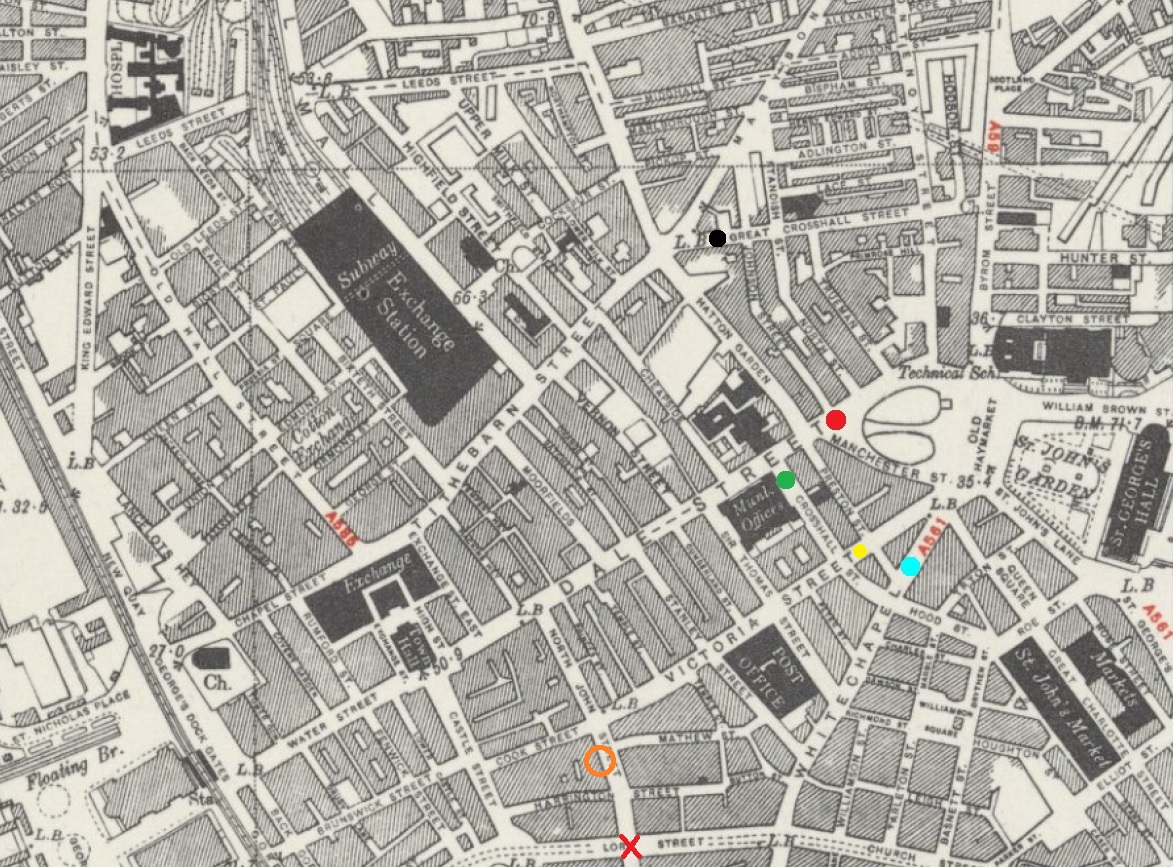
Black Circle: Gt. Crosshall Street; Red Circle: Dale Street; Green Circle: Crosshall Street; Blue Circle: Whitechapel; Yellow Circle: Victoria Street; Orange Circle: 24 North John Street (City Café/Chess Club). Red Cross: Tram stop William alighted at.
Cars still delayed on the following day [murder night, January 20th] by conductor evidence.
- First attempt at the front door key DOES NOT TURN. [Investigate possible reasons]. Knocked gently.
- Went to the back door, yard door unbolted, unable to open kitchen door when the knob/handle was turned (no key?) “the bolt would not slip back”. Knocked gently (heard by Mrs. Johnston)
- Returned to the front door to try again. Key turns but the lock slips when the key is turned too far and re-locks. Door determined to be BOLTED anyway, according to William.
- Front door bolt should not prevent the key from turning. Someone has put their own (probably spare/skeleton) key in from the inside? Investigate.
- Impossible to see if there is a light in the middle kitchen due to heavy green blinds.
- William checked for a light in the kitchen by looking through the window of the BACK KITCHEN (Scullery) to see if there was any reflection of light from the kitchen.
- There was a small light in the BACK KITCHEN (Scullery).
- Claimed “dog whip with a lash” usually hung in the hallway. Not seen in 12 months, no metal about it as far as he can remember. Never found. Claimed wood chopper missing, found under the stairs by police.
- Practically accused Gordon Parry on the 22nd (two days after the murder).
- Saw Gordon Parry with his car in Missouri Road (where Gordon’s girlfriend lives) around Christmas [about a month prior to the murder], the two had a conversation. Gordon gave Wallace a calendar from his new company.
- Saw Parry on a Thursday at the City Café around November 1930 (Parry would be at Drama Club). Two months prior to the murder. Chess match schedule would be up at this time.
- Wallace’s chess club meets on both Mondays AND Thursdays.
- Wallace went to the Chess Club once every week or two weeks on a Monday whether a match was scheduled or not. Would sometimes go on Thursday if a special match was on, but not often.
- Various neighbours have keys which fit the doors of 29 Wolverton Street: Named Mr. Gosling, Mr. Cadwallader (deceased) and his family, and the Johnstons.
T.B.C.

